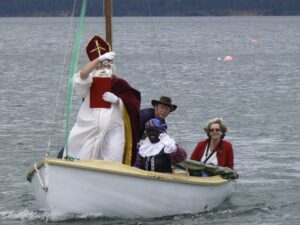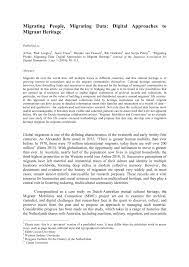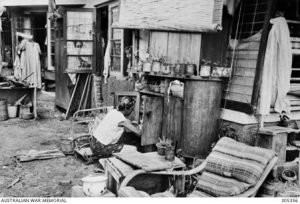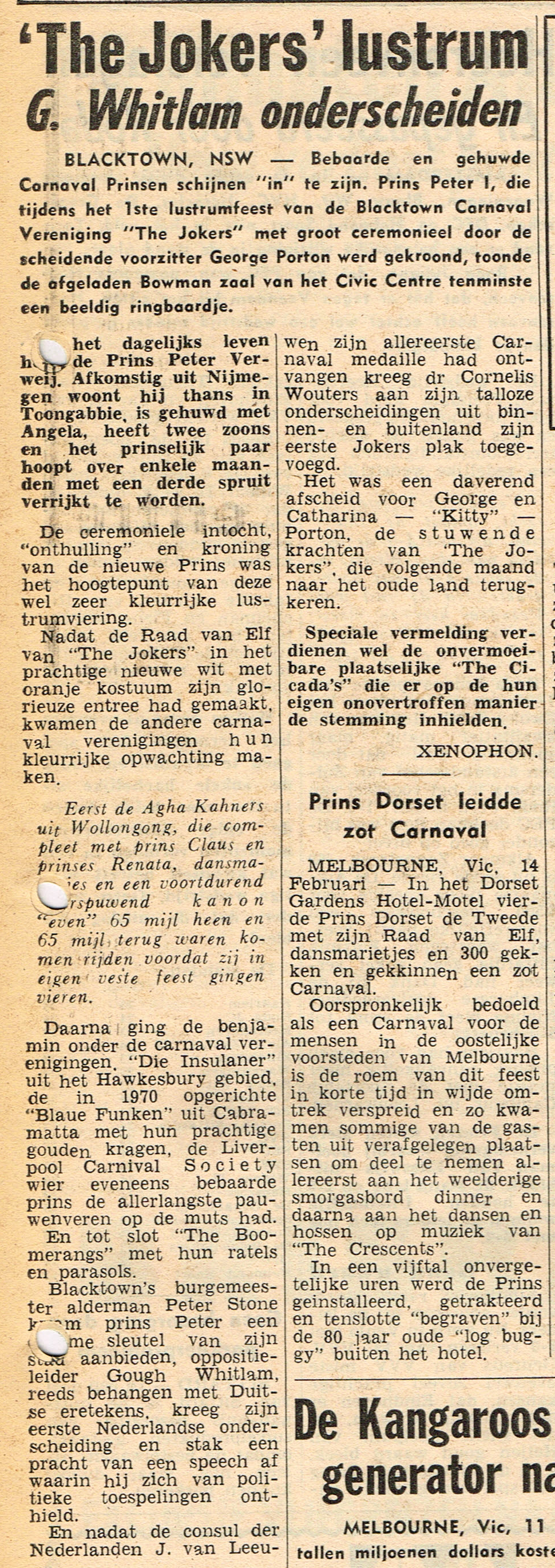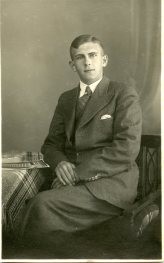
Kees de Jong: A Dutch–Australian Life Shaped by War, Teaching and Migration
Early life in the Netherlands Cornelis Antonie de Jong was born in 1916 in Asperen, a small rural town along the river Linge. He grew up in a family marked by poverty, limited formal education, and the social pressures of interwar Dutch society. Work was often seasonal or insecure, schooling
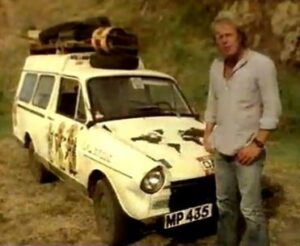
Alby Mangels: From Dutch migrant to Australian adventurer
Zwier Albertus ‘Alby’ Mangels was born in the Netherlands on 16 November 1948. In 1955, he migrated to Australia with his parents and siblings as part of the large post-war wave of Dutch migration. The family settled in Mount Burr in South Australia, where Mangels spent his formative years. Growing
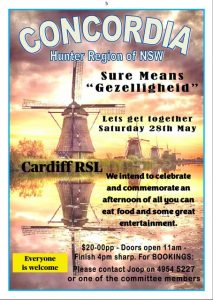
Concordia Dutch-Australian Society Newcastle and Districts – March- April 2026 newsletter added
The following text is from a booklet published by the Federation of Netherlands Societies Ltd. in February 1985. The research for this booklet was done by Mijntje Hage Initially, there were several small Dutch clubs in the various immigrant hostels in and around Newcastle, with Camp Greta being one of the bigger
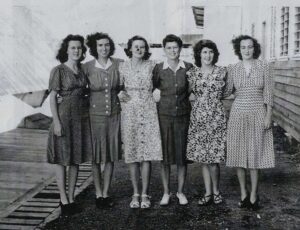
Archerfield Memories – includes the Netherlands East Indies Transport Service – By Jean White
This document presents a first-hand civilian account of work at Archerfield Aerodrome in Brisbane during the Second World War and the immediate post-war years, with particular relevance to the Dutch and Netherlands East Indies presence in Australia. Written by Jean White (née Forrester), the memoir begins with her early employment
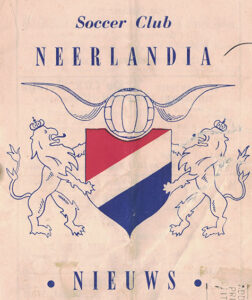
SC Neerlandia and the Dutch football footprint in Sydney
Post-war Dutch migration to Australia reshaped not only industry and housing but also community life. Football became one of the most effective ways for Dutch migrants to build social networks, maintain cultural continuity, and integrate into Australian society. In Sydney, one of the clubs that emerged from this environment was
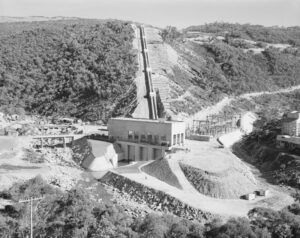
Dutch migration and the Snowy Mountains Scheme: work, community and nation building
Introduction The Snowy Mountains Hydro-Electric Scheme occupies a central place in Australia’s postwar history. Conceived as a nation-building project, it reshaped Australia’s energy and water systems while simultaneously transforming the country’s demographic profile. Between the late 1940s and the 1970s, the Scheme attracted tens of thousands of workers, the majority
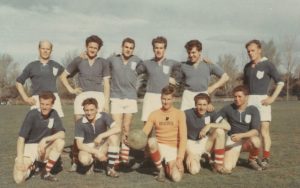
Dutch football in Canberra: Hollandia, Be Quick, Fortuna ’62 and migrant identity in the national capital
Introduction In the decades following the Second World War, Canberra became home to a growing number of Dutch migrants. As in other parts of Australia, football (soccer) played an important role in helping these newcomers build social networks, preserve cultural familiarity and gradually integrate into Australian society. In Canberra, Dutch
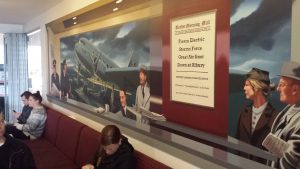
Uiver Restoration Project – Albury NSW – February 2026 newsletter added
The Uiver Memorial Community Trust – a not-for-profit organisation – is devoted to restoring Albury’s Uiver Memorial DC-2 aircraft. In 1934 the MacRobertson Air Race proclaimed itself as the greatest international air race devised, and history has confirmed that bold claim. The aircrews that completed the journey from England to
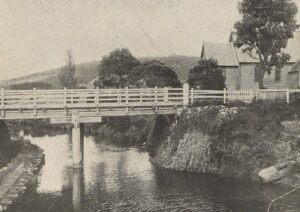
Newsletters from the First Reformed Church in Australia: Penguin, Tasmania (1951–1957)
This document presents a rare and valuable primary-source record of the early years of the Reformed Church in Tasmania, established by Dutch migrants in the early 1950s. It is based on a surviving collection of church newsletters originating from the Reformed Church of Penguin, the first Reformed Church established in
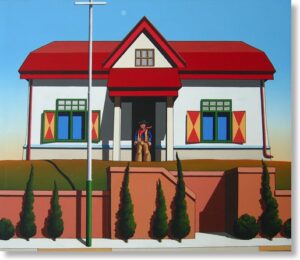
James Willebrant: Dutch–Australian heritage shaped by a global childhood
When I walked into the Grand View Hotel in Wentworth Falls in the NSW Blue Mountains to have drink on a Saturday evening, I noticed a painting of recently nicely restored hotel painted by James Willebrant. Having the DACC in mind I wanted to see if there was a Dutch
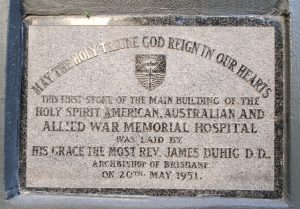
From European Mission To Australian Sanctuary: The Holy Spirit Missionary Sisters In Brisbane
Missionary origins and the road to Australia In the late nineteenth century, there was growing interest among Catholic women in becoming actively involved in overseas missionary work. This development was closely linked to the rapid expansion of European colonial empires and the social conditions that accompanied them. In many colonial
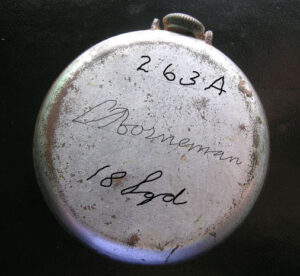
Ditching of a Dutch B-25 Mitchell – with money onboard -near Broome, October 1945
On 28 October 1945, a Netherlands East Indies Air Force (NEI-AF) B-25J Mitchell bomber was forced to ditch in tidal waters in the remote Kimberley region of Western Australia. The aircraft, serial N5-254 (USAAF 44-30900), came down in the Glenelg River system north of Broome, although some contemporary sources refer
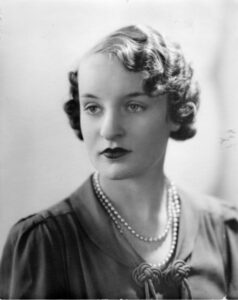
Elva Mary Bennett, Gerk van der Land and a family at war
This article is based on personal documents, military records and a recorded wartime interview provided by Elva Mary Bennett’s son, Russ Morison, together with supporting Australian and Dutch archival sources. The wartime history of the Bennett–van der Land–Morison family connects Australia, the Netherlands, the Netherlands East Indies, Burma and the
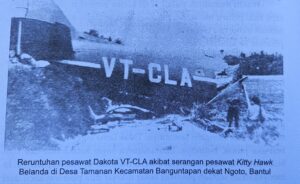
Foreign pilots, Dutch blockades and the Indonesian air war: the Jogja incident of 29 July 1947
Introduction During the Indonesian Revolution (1945–1949), the struggle between the newly proclaimed Republic of Indonesia and the returning Dutch colonial authorities was fought not only on land and through diplomacy, but also in the air. Less well known is the decisive role aviation played in sustaining the Republican cause under
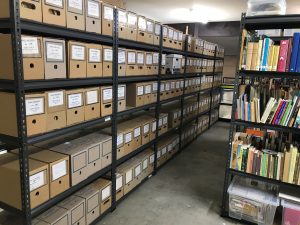
DACC archive digitisation moves into active implementation
The Dutch Australian Cultural Centre (DACC) has reached an important milestone in the long-term preservation of Dutch-Australian heritage. After several years of preparation, planning and infrastructure development, the DACC Archive Digitisation Project has moved from concept to active implementation. Preserving a unique national archive Since its foundation in 1983, the
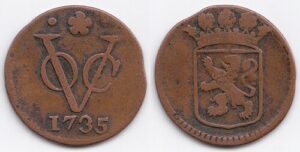
Dutch coins found in and around Australia
From VOC trading worlds to wartime exile: a material history across four centuries Dutch coins discovered in Australia tell a story far richer and more complex than simple first contacts or accidental landfalls. These small objects, sometimes corroded coppers, sometimes fused silver from shipwreck sites, and sometimes the stray pocket
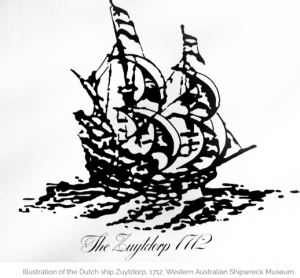
VOC ship the Zuytdorp – 1711
On 1 August 1711 the ship the Zuytdorp left the Netherlands with a load of freshly minted silver coins. The ship never arrived at its destination and was never heard from again. No search was undertaken, presumably because the VOC did not know whether or where the shipwrecked or if
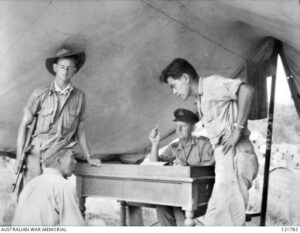
Australian war crimes investigators killed near Jakarta, April 1946
A little-known episode of Dutch–Australian post-war cooperation IntroductionIn the chaotic months after the Japanese surrender in August 1945, the Netherlands East Indies entered a turbulent and violent transition. The return of Dutch administrative and military forces coincided with the rise of the Indonesian independence movement and a widespread collapse of
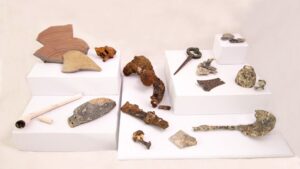
Traces of survival: new evidence of the Vergulde Draeck survivors’ camp on the WA coast
The wreck of the VOC ship Vergulde Draeck (Gilt Dragon) in 1656 is one of the most enduring mysteries of early Dutch contact with Australia. While the wreck site was rediscovered in 1963, the fate of the seventy-five survivors who reached the shore has never been conclusively known. Recent archaeological
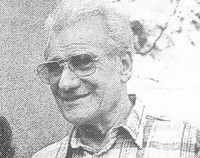
John Vrolyks: A Lifetime of Sport, Community Building and Dutch–Australian Friendship
Johan “John” Vrolyks was born in 1922 in Nijmegen, the Netherlands, and emigrated to Australia in 1952. After arriving in Sydney, he worked first as a car washer in Crown Street before becoming a cook with Cahill’s Restaurants. Keen to explore more of Australia, he soon joined the Postmaster-General’s Department
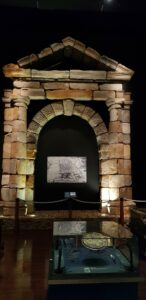
Batavia Portico Geraldton – Kasteel Batavia Jakarta
Kasteel Batavia stood as the administrative heart of the Dutch East Indies, begun in 1619 under Jan Pieterszoon Coen. The rectangular fortress, built on the western bank of the Groote Rivier (now Kali Besar), featured four bastions—Amsterdam, Zeelandia, Hollandia and Westfriesland—connected by thick walls enclosing offices, warehouses, and the Governor-General’s
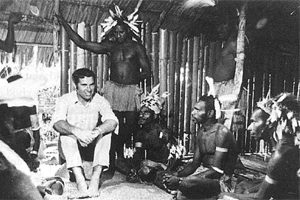
Dutch government aided Australian missionaries in Dutch New Guinea
The story of Dutch New Guinea in the 1950s is often told through the lens of Dutch colonial policy and the role of European missions. Less well known is the presence of small Australian evangelical societies. One of these was the Regions Beyond Missionary Union (RBMU), whose station at Wolo
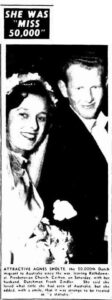
Frank Zindler
Frank Zindler is a Dutch migrant and artist who is primarily known for having married Maria (Ria) Scholte, the 50,000th Dutch migrant to Australia. Early years in Indonesia and Australia Frank was born in Java in the Dutch East Indies (now Indonesia) on 20 May 1932. He grew up in
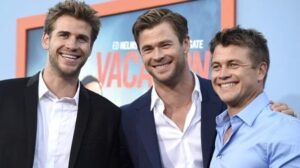
Chris, Liam and Luke Hemsworth – Dutch heritage in Australian film and television
(Profile current as of October 2025) Chris Hemsworth (born 11 August 1983), Liam Hemsworth (born 13 January 1990), and Luke Hemsworth (born 5 November 1980) are Australian actors whose shared success has brought international attention to their family’s diverse heritage. Through their mother, Leonie (née van Os), they have Dutch
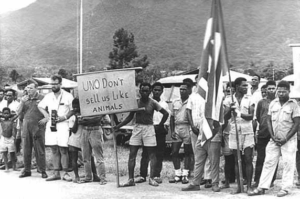
From self-rule to suppression: the fate of West Papuan independence and Australia’s ambivalent role, 1962–63
The transfer of Dutch New Guinea to Indonesian control in 1963 marked the abrupt end of one of the most promising experiments in decolonisation in the Pacific. During the late 1950s and early 1960s, the Netherlands had begun preparing the Papuan people for a future of self-government, establishing representative institutions
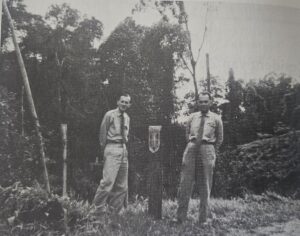
The Dutch Resident of Merauke visits Australian Papua New Guinea
In the early 1950s, Resident Karel Knödler of South New Guinea crossed the frontier into Australian-administered Papua New Guinea. His visit offers a rare first-hand Dutch view of daily life and administration across the colonial border that once divided the island. A cordial exchange across the frontier Karel Knödler had
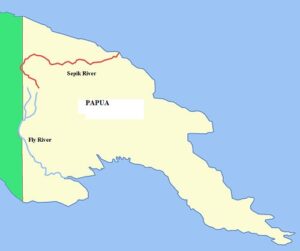
Defining a frontier: Dutch–Australian border cooperation in New Guinea, 1954–1960
In the decade following the Second World War, the Netherlands and Australia shared the vast island of New Guinea as neighbouring colonial powers. The western half, Netherlands New Guinea (DNG), remained under Dutch administration, while the eastern half, the Territory of Papua and New Guinea (TPNG), was administered by Australia
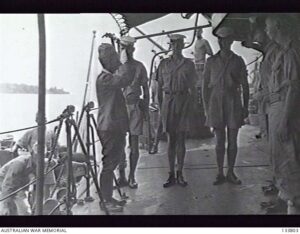
Australia’s surrender expedition in New Guinea, 1945: the Dutch connection at Sarmi
In September 1945, as Japan’s capitulation brought the Second World War to an end, Australia was tasked with overseeing the surrender of tens of thousands of Japanese troops scattered across the islands of New Guinea and the Netherlands East Indies. These operations were not limited to Australian territories. In neighbouring
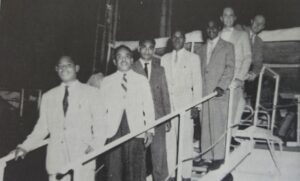
Dutch–Australian cooperation in the Pacific, 1947–1962
From 1947 to 1962, the Netherlands and Australia both belonged to the same regional organisation, the South Pacific Commission (SPC). The Commission was created by the Canberra Agreement of 1947, signed by six administering powers with dependent territories in the Pacific: Australia, New Zealand, the United Kingdom, France, the United
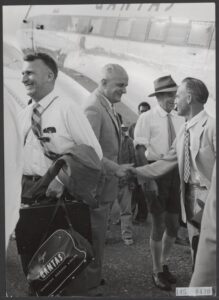
Bridging Borders: The Dutch–Australian Conference on Joint Development Policy for New Guinea, 1959–60
In the final years of Dutch administration in New Guinea, the Netherlands and Australia sought to establish a common development policy across the island. These conferences, held between 1959 and 1960, symbolised an ambitious vision of regional cooperation in health, education, infrastructure and administration. Yet they were also shaped by
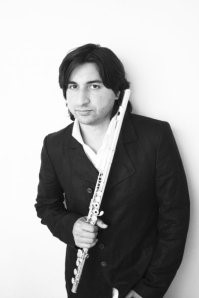
Ravind Sangha: The Australian musician who played for and taught Dutch royalty
After completing his studies, Ravind moved to Amsterdam, immersing himself in the vibrant early music scene of the Netherlands. For ten years, he performed as a baroque flautist with the Dom Kantorij in Utrecht, participating in weekly Masses, Cantatas, and Passions alongside orchestral and solo performances. His engagements extended across
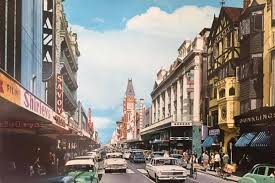
The Dutch Consulate in Perth – 1950/1960
Introduction This article was written by Pieter Robert (Robby) Boele van Hensbroek (1920–2011), a former officer of the Royal Netherlands Navy who migrated to Australia in 1951. He remained deeply engaged in Dutch community affairs through the Netherlands Ex-Servicemen and Women’s Association (NESWA) and contributed a number of personal recollections
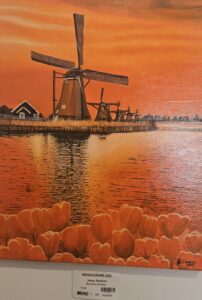
Jenny Dodson – a tribute to Dutch heritage in Australian art
Australian artist Jenny Dodson, whose family background includes Dutch heritage, has created works that draw on the cultural imagery of the Netherlands. One of her notable pieces is Monochrome (2025): tribute to my Dutch heritage, a painting of a traditional Dutch windmill. In this work, Dodson uses a restrained palette
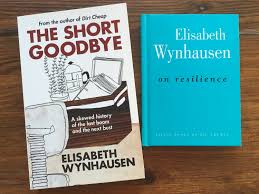
From Maastricht to Manly: the Wynhausen family’s Dutch–Jewish journey
The Wynhausen family represents one of the many Dutch–Jewish stories of postwar migration to Australia. Paul Wynhausen and Marianne (Mary) Nathans were both born in the Netherlands and endured the years of Nazi occupation. They met in Switzerland, where many Dutch Jews had taken refuge during the Second World War.
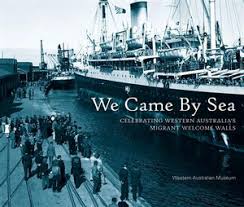
Catalogue List: Peters, Nonja (SLWA)
This document contains the catalogue items associated with Dr Nonja Peters from the State Library of Western Australia (SLWA). Below the pdf is a searchable list of titles, interviewees/subjects, and years to make it easier for search engines to find names and titles. A more readable full catalogue see the
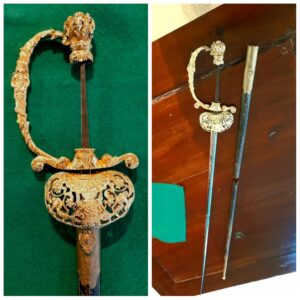
Brisbane’s Allied Capital Story — New Openings for the Netherlands
Symposium Allied Co-operation in Brisbane during WWII: Australia, USA, Netherlands, UK The symposium Allied Co-operation in Brisbane during WWII: Australia, USA, Netherlands, UK (University of Queensland, 30–31 August 2025) drew a full house of delegates, historians, community representatives, and descendants to mark the 80th anniversary of the end of the
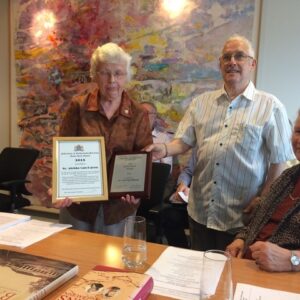
Lia van Haren – Archivist DACC 2009 – 2025
Lia van Haren Lia van Haren has been a long-standing volunteer at the Dutch Australian Cultural Centre (DACC), beginning her service in 2009. Before this, she had little involvement with Dutch organisations in Australia, having assimilated quickly into the broader community after migrating with her family in 1950. Her family’s
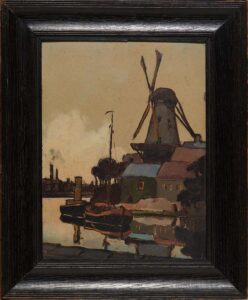
Australian painter Ian Fairweather’s time in the Netherlands
Ian Fairweather and the Netherlands Ian Fairweather (1891–1974), born in Bridge of Allan, Scotland, became one of Australia’s most distinctive modern painters. His path to Australia was long and unusual, and the Netherlands played an important part in it. Wartime and The Hague In 1914 Fairweather joined the British Army.
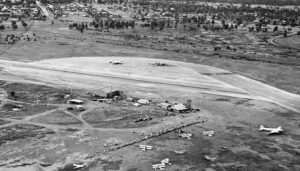
Charleville’s role in the Dutch- Australian connection
Charleville, in western Queensland, is often remembered for its role as a major American base during the Second World War. Less well known is the town’s connection to the Netherlands East Indies (NEI) through the Dutch airline KNILM (Koninklijke Nederlandsch-Indische Luchtvaart Maatschappij). For a brief but critical period before and
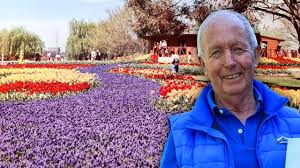
Christiaan Slotemaker de Bruine: The Dutch mind behind Canberra’s Floriade
Christiaan Rudolph Victor Slotemaker de Bruine (born 7 May 1941, The Hague; died 27 August 2024, Canberra) was a Dutch-Australian landscape architect best known as the originator and designer of Canberra’s Floriade, now Australia’s largest spring festival. He conceived Floriade in the mid-1980s, drawing inspiration from the famous Keukenhof in
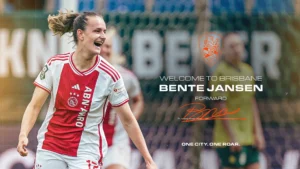
Dutch forward Bente Jansen at Brisbane Roar
Dutch footballer Bente Jansen is part of Brisbane Roar in the Ninja A-League, adding a new chapter to the Netherlands–Australia sporting connection. Jansen came to Queensland in 2025 with a strong pedigree in European football. She previously played for Dutch giants AFC Ajax, where she featured in 24 matches, scored
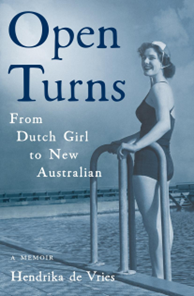
From war-torn Amsterdam to champion in Adelaide: the story of Hendrika de Vries
In a story that crosses borders, generations, and identities, Hendrika de Vries embodies the resilience of Dutch migrants who forged new lives in Australia after the Second World War. Her journey—from the trauma of Nazi-occupied Amsterdam to becoming South Australia’s swimming champion in 1955—is a testament to courage, adaptability, and
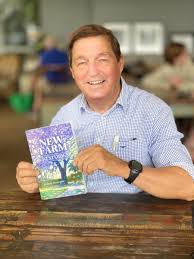
Toast, Motorbikes and Memories: Dutch Life at Roseville (Brisbane) in the 1950s
The following is a chapter from the book “New Farm 50 Stories” by Gerard Benjamin, a longtime resident in Newstead who has been associated with the New Farm and Districts Historical Society for more than 20 years. He regularly conducts history walks in the area and is the author of
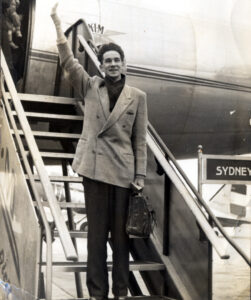
Jan and Toos Janssens: A life of family, migration, and memory
The story of Jan (Johannes Wilhelmus Theodorus) and Toos (Catharina) Janssens is a vivid reflection of the Dutch migrant experience in Australia after the Second World War. Together, their recollections offer a rare and intimate portrait of growing up in the Netherlands during the turbulent 1930s and 1940s, the challenges

Support us in preserving Dutch-Australian heritage – AGM 23 September 2025
The Dutch Australian Cultural Centre (DACC) will hold its Annual General Meeting on Tuesday 23 September 2025 at 5.00pm (AEST). The meeting will be held online, and a Zoom link will be emailed to current members a few days before the date. We now have over 800 people receiving our
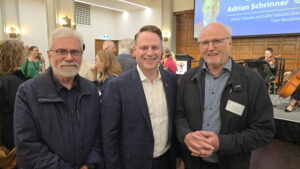
Brisbane’s Lord Mayor hosted civic reception in honour of Camp Columbia Heritage Association
We are proud to inform you that the Lord Mayor of Brisbane hosted an official civic reception in honour of the Camp Columbia Heritage Association on the eve of our international WWII symposium at the University of Queensland. This prestigious event took place at Brisbane City Hall, in the Balmoral
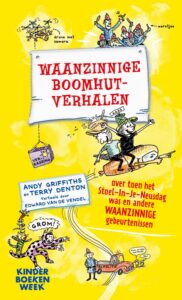
Andy Griffiths and Terry Denton at Children’s Book Week (Kinderboekenweek) in the Netherlands
In 2022, Australian authors Andy Griffiths and Terry Denton, who is also an illustrator, were chosen to write the Kinderboekenweekgeschenk for Children’s Book Week (Kinderboekenweek) in the Netherlands. Children’s Book Week Children’s Book Week, or Kinderboekenweek, is an annual event in the Netherlands that brings the magic of literature to
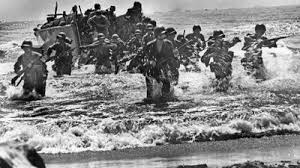
Going North: award winning Dutch WWII documentary of the landing on the Philippine island of Leyte.
Going North is a fine example of a classic Allied propaganda film from the Second World War. It tells the story of the massive force moving from the southern Pacific towards Japan — heading north. With imposing images, pompous music and a sharp commentary voice, the film leaves no doubt
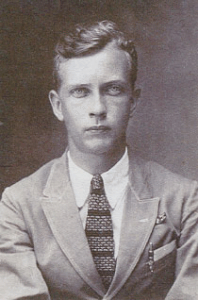
Betrayed and beheaded: the story of Rob Hees and NEFIS Party Lion
English introduction for the Dutch PDF below This Dutch-language document, De verkenningsmissie, Party Lion, van Rob Hees (1901–1942), details the story of Rob Hees, a reserve first lieutenant in the KNIL and civil engineer, who escaped from the Netherlands East Indies to Australia in 1942. It describes his recruitment into
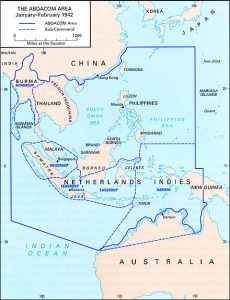
The American-British-Dutch-Australian Command – 1942
The American-British-Dutch-Australian Command (ABDACOM) was the short-lived Allied supreme command for the South-East Asian theatre in the opening months of the Pacific War. Formed at Bandung, Java, on 10 January 1942 and led by British General Sir Archibald Wavell, it became operational only days after Japan entered the war. Its
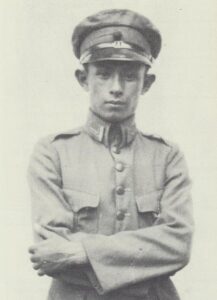
Hendrik Johan de Haas – Dutch officer in NEFIS special operations
Hendrik Johan de Haas was born in Batavia (now Jakarta) on 28 November 1904, the son of Jozef Hendrik de Haas and Johanna Frederika Susanna Jostein. He married Hendrina Maria van der Meer Mohr in Batoeroesa on 2 January 1911. The couple had two children: Robert Johan (born 28 December

Dutch and Indonesian refugees in Australia from the Netherlands East Indies, 1942–1946
By Dr Nonja Peters This paper examines the complex experiences of Dutch, Eurasian, and Indonesian evacuees who fled the Japanese occupation of the Netherlands East Indies during the Pacific War and found temporary refuge in Australia. Drawing on archival sources and eyewitness accounts, it explores their reception, living conditions, and
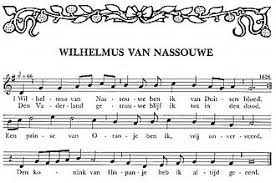
Dutch squadron choir in wartime Australia: voices of resilience and diplomacy
When the Netherlands East Indies (NEI) collapsed under Japanese attack in early 1942, hundreds of Dutch airmen, sailors, and soldiers found themselves in Australia. Among the many military units reconstituted there was the 18 (Netherlands East Indies) Squadron of the Royal Australian Air Force (RAAF), a unique Dutch–Australian squadron flying

Tiwi resistance and Dutch contact: an early act of Indigenous unity- 1705
In 1705, the Dutch East India Company (VOC) launched an exploratory expedition to the Tiwi Islands, north of Arnhem Land in what is now the Northern Territory of Australia. The expedition, led by Commander Maerten van Delft, was one of several early attempts by the Dutch to chart the coastline
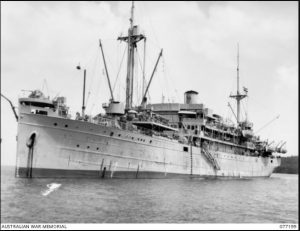
Convoy ZK8: Dutch ships deliver Australia’s troops to the front
In May 1942, the Allied war effort in the Pacific reached a critical turning point. The fall of the Netherlands East Indies (NEI) had left Australia exposed, and Japanese forces were advancing toward Port Moresby. In this tense context, a unique and largely forgotten military operation unfolded: Convoy ZK8, an
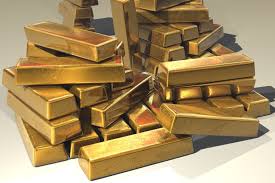
Operation Accountant: safeguarding Dutch gold in exile
In early 1942, as Japanese forces overran the Netherlands East Indies (NEI), Dutch authorities faced the urgent task of preserving their financial and sovereign assets. Among the most critical was the colony’s reserve of gold bullion—essential not just for wartime logistics, but for sustaining the legitimacy of the Dutch government-in-exile
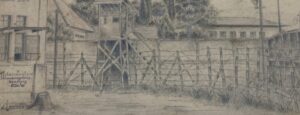
Japanese internees and Dutch migrants: the story of the Lawant family
During the Second World War, the Japanese occupation of the Netherlands East Indies (now Indonesia) led to the internment of tens of thousands of Dutch civilians. Among them were Catharinus Lawant, his wife Maria, and their daughter Martina. Their story—documented through personal sketches and migration records—offers a window into a
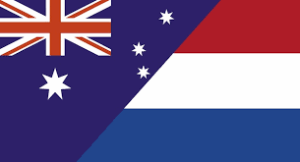
Dutch–Australian wartime cooperation: a six-part series
This series is a tribute to Dr. Jack Ford who passed away in June 2025 Symposium: Allied co-operation in Brisbane during WWII: Australia, USA, Netherlands, UK – 30–31 August 2025 at UQ- Bus Tour Brisbane WWII sites – 1 September More info. This article series explores the evolving relationship between

From indifference to diplomacy: how the war transformed Dutch–Australian foreign relations
Before the Second World War, the relationship between Australia, the Netherlands and the Netherlands East Indies (NEI) was marked by cordial distance rather than active diplomacy. There were no embassies , no treaties of alliance, and few direct communications between the two governments. Australia’s foreign affairs were largely managed through
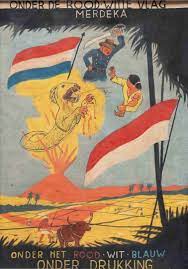
Reform or restoration? Political tensions over the future of the Netherlands East Indies during wartime exile
Following the Japanese invasion and collapse of the Netherlands East Indies (NEI) in early 1942, Dutch political and military leadership scattered across the globe. Many civil and military authorities regrouped in Australia and Ceylon, while the central government-in-exile remained in London. Amid the chaos, a major political fault line emerged

Divided in exile: tensions between Batavia and London in the Dutch war effort in NEI
The collapse of the Netherlands under German occupation in May 1940 left its overseas empire, particularly the Netherlands East Indies (NEI), to operate with significant autonomy. Based in Batavia, the colonial administration continued to govern its territories while the Dutch government-in-exile established itself in London. As the war progressed, tensions
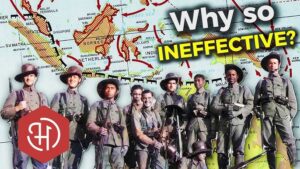
Between secrecy and survival: Australia’s frustration with Dutch neutrality on the eve of war
In the months leading up to the Pacific War, the Netherlands East Indies (NEI) attempted to balance neutrality with quiet resistance to Japan. But to Australian officials, this stance seemed naïve—and potentially dangerous. As early as November 1941, the Australian government was growing concerned that the Dutch in Batavia were
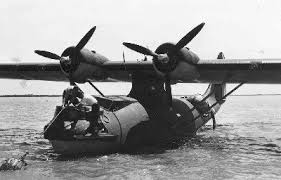
From Pearl Harbor to Broome: Dutch seaplanes and the shifting tides of the Pacific War
In the early hours of 7 December 1941, Japanese aircraft launched a surprise attack on Pearl Harbor, drawing the United States into the Second World War. Among the many casualties at the nearby Kaneohe Bay Naval Air Station was a lesser-known victim: Dutch Catalina flying boat Y-68, belonging to the
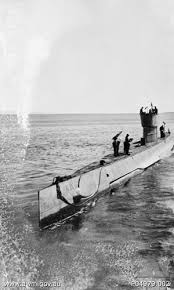
Dutch submarine tactics in Allied strategy: ignored, copied, and overshadowed – WWII
During the desperate early months of the Pacific War, Allied cooperation in Southeast Asia was marked by confusion, mismatched priorities, and poor coordination. Dutch naval forces, particularly the Royal Netherlands Navy (RNN) submarine fleet based in the Netherlands East Indies (NEI), played a critical role in resisting the Japanese advance.
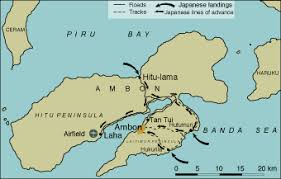
Dutch parochialism and the fall of Ambon: a difficult moment in Dutch–Australian wartime cooperation
The short-lived Allied defence of Ambon in early 1942 is remembered in Australia as one of the most tragic military episodes of the Pacific War. The Battle of Ambon with the near-annihilation of the Australian 2/21st Battalion (‘Gull Force’) and the subsequent Japanese massacre of prisoners at Laha remain seared
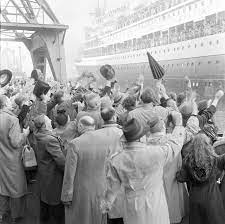
Dutch migrants and their parents back home: caring from a distance
This chapter, co-authored by Loretta Baldassar, Raelene Wilding, and Cora Baldock, forms part of a larger Australian Research Council–funded study examining transnational caregiving among migrant families. Focusing on Dutch migrants in Perth, Western Australia, and their ageing parents in the Netherlands, the chapter explores how families maintain emotional bonds and
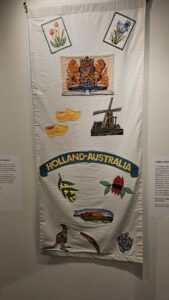
Migration Museum, Adelaide
The Migration Museum in Adelaide is Australia’s oldest museum dedicated to the history of migration. Opened in 1986 and operated by the History Trust of South Australia, the museum explores the diverse stories of immigrants who helped shape South Australia and the nation. Through permanent and changing exhibitions, it documents

Unchained interests: A Dutch perspective on the failure of ABDACOM
This in-depth military study by Major Rene W. A. van den Berg of the Royal Netherlands Army explores the rise and rapid collapse of the American-British-Dutch-Australian Command (ABDACOM), the first multinational Allied command in the Pacific during WWII. Often overlooked in mainstream histories, the Netherlands East Indies played a central
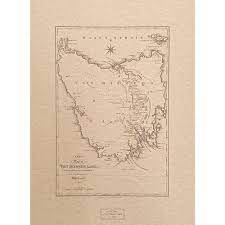
Tasmania on the Map 1856
By Peter Reynders First published by the Dutch Courier in July 2025 With the recent name change of the Mexican Gulf, it became even more interesting to me to look at the process of some of the geographical name changes in history. In that case the name known in Latin
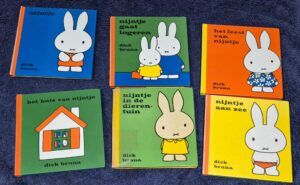
Nijntje (Miffy)
nijntje, known in English as miffy, is a character created by Dutch children’s author and illustrator Dick Bruna (1927-2017). nijntje/miffy is a white rabbit with human characteristics who lives in the Netherlands. The first nijntje/miffy book – bearing the same name as its main character – was published in 1955.
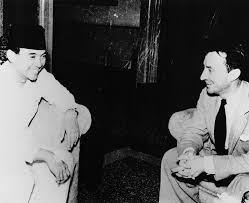
Australia, the Dutch, and Indonesia’s Independence: A pivotal year revisited through Diplomasi 1947
In 1994, the Australian Government Publishing Service released a remarkable volume titled Diplomasi: Australia & Indonesia’s Independence. Documents 1947, edited by political analyst and public servant Dr Philip Dorling. This collection of declassified documents sheds new light on a transformative year in Australian foreign policy—one that placed Australia in the
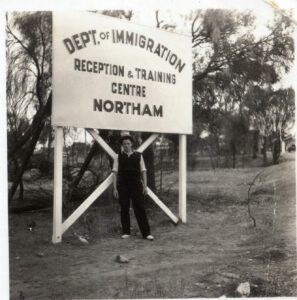
Jack Verschuren – Dutch Football Pioneer in Northam, Western Australia
Jack Verschuren arrived in Western Australia from the Netherlands in 1954, part of the post-war wave of Dutch migrants seeking new opportunities and a better life. Settling in Northam, a regional centre in the Wheatbelt, Jack quickly became a prominent figure in the local football scene during the 1950s and
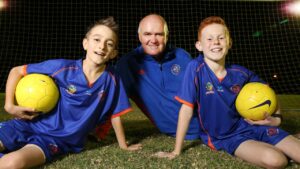
A legacy of football: the van der Veekens of Adelaide
The story of the van der Veeken family reflects the enduring contribution of Dutch migrants to Australian football, spanning two generations of commitment to the game in South Australia. Born in The Hague, Jan van der Veeken arrived in Australia in 1950 as a young child with his family. Upon
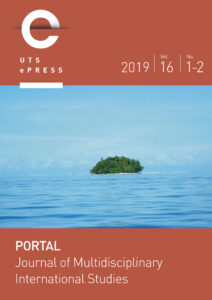
Reframing Dutch–Australian history through the lens of Asia-Pacific decolonisation
In reviewing the article Ripples of Decolonisation in the Asia-Pacific by Charles Hawksley and Rowena Ward (2019), I was struck by how closely its themes intersect with lesser-known Dutch–Australian wartime and postwar connections. While the article does not focus on Dutch-Australian relations per se, it provides valuable context for understanding
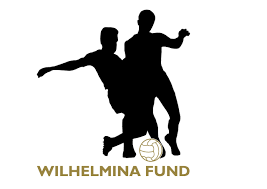
Wilhelmina Fund – A Dutch-Australian Legacy of Inclusion and Community Support
The Wilhelmina Fund, established by Ringwood City Soccer Club in 2019, is a standout example of how a proud Dutch-Australian football club continues to honour its heritage while supporting its local community. Ringwood City SC was founded by Dutch migrants in the post-World War II period—a time when many Dutch
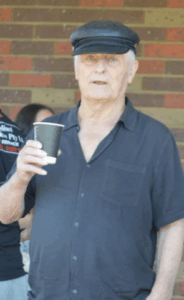
Tony te Wierik – a Fortuna ’60 founding figure in the Latrobe Valley
Tony te Wierik was one of the foundational players of Fortuna ’60 Soccer Club in Morwell, Victoria – known affectionately as the Orangemen, proudly reflecting their Dutch heritage and orange team colours. Tony arrived in Australia in the mid-1950s as part of a large Dutch family aboard the Johan van
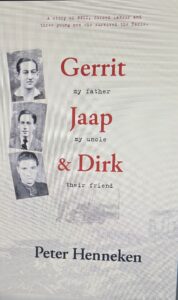
Gerrit, Jaap and Dirk: A Story of WWII, Forced Labour and Survival
In 1943, three young Dutch men—Gerrit Henneken (19), his brother Jaap (18), and their friend Dirk Keijzer (19)—became part of the millions of men and women subjected to forced and enslaved labour in Nazi Germany. What followed was a harrowing tale of hardship, endurance, and ultimately, liberation by the American
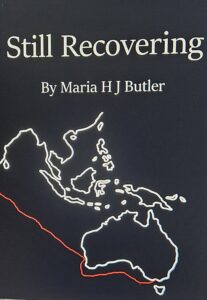
Still Recovering: A Dutch Childhood in Queenscliff – by Maria H.J. Butler
Still Recovering by Maria H.J. Butler is a poignant and personal memoir that offers a unique insight into the post-war Dutch migrant experience in Australia. The book captures the childhood memories of a Dutch, Catholic, New Australian girl growing up in Queenscliff, Victoria. Maria was born in Gouda, the Netherlands,
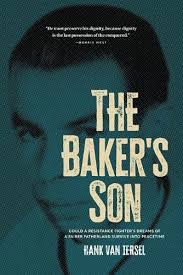
The Baker’s Son: The Story of Henk van Iersel – Resistance Fighter, Migrant, and Musician
The story of Dutch migration to Australia is filled with personal journeys of courage, resilience, and community spirit. Among these is the remarkable life of Henk (Hank) van Iersel, a man who stood against oppression during the dark years of World War II and later sought a new future for
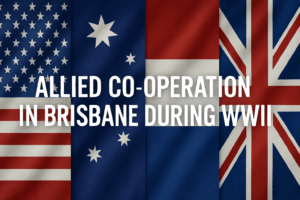
Symposium: Allied co-operation in Brisbane during WWII: Australia, USA, Netherlands, UK – 30–31 August 2025 at UQ- Bus Tour Brisbane WWII sites – 1 September
For Outcomes see: Brisbane’s Allied Capital Story — New Openings for the Netherlands To commemorate this milestone, the Camp Columbia Heritage Association and the support over 20 national and international organisations, will host a major international symposium and guided tour from 30–31 August. Symposium 30 and 31 August at University of Queensland St Lucia Campus This two-day
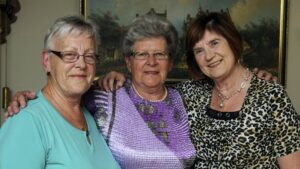
Dutch Australian Association (DAA) in Launceston
The Dutch Australian Association (DAA) was established in Launceston in 1956, at a time when Dutch migration to Tasmania was increasing significantly after the Second World War. The DAA served primarily as a social and cultural organisation, helping Dutch migrants settle into their new lives while maintaining connections to their
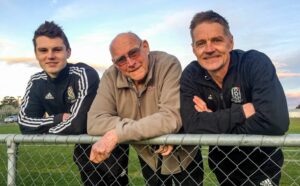
Pete Mies – Dutch football pioneer and community leader in Launceston
Peter Johannes Gerardus Mies, born in 1936 in Neerbeek in the province of Limburg, the Netherlands, was a remarkable figure in Tasmanian football and in the Dutch-Australian community. At the age of 14, Pete joined his father and brother working in the mines of Limburg, contributing to the family’s livelihood
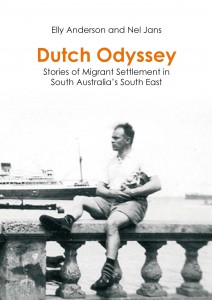
Dutch Odyssey: A Collective History of Migration to South East Australia
Dutch Odyssey is a collective history of Dutch migration, based on the experiences of families who settled in the South East of South Australia from the late 1940s onwards. The authors spent five years gathering stories from first and second generation migrants and expanded their research by consulting archives to
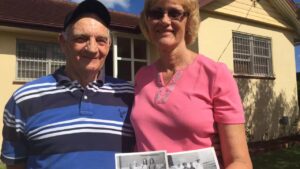
Fred van Breemen – A Founding Figure in Brisbane’s Dutch Football Legacy
Fred van Breemen stands as a testament to the enduring impact of Dutch migrants on Australian football and community life. Born in the Netherlands, Fred migrated to Australia in 1954 aboard the Johan van Oldenbarnevelt. His family settled in Coopers Plains, Brisbane, where his father contributed to the construction of
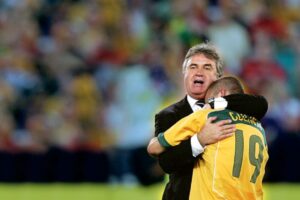
Dutch coaches who shaped the Socceroos and Matildas
Dutch coaches and technical leaders have significantly contributed to the development and success of Australia’s national football teams. Their expertise has been instrumental in guiding both the Socceroos and the Matildas through pivotal moments in their histories. Socceroos Matildas These Dutch professionals have left a lasting impact on Australian football
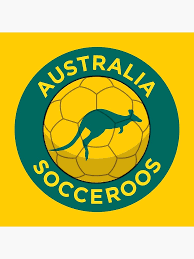
Dutch-Australian Socceroos – the players of Dutch heritage who represented Australia
Dutch migrants and their descendants have made an important contribution to Australian football, not only at club level but also in the national men’s team, the Socceroos. From the 1950s onwards, Dutch-Australians have helped shape the squad during key periods of its development. This article highlights those players of Dutch
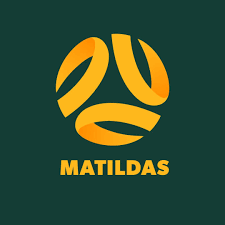
The Dutch influence in the Matildas – from early pioneers to modern stars
The Matildas, Australia’s national women’s football team, are celebrated not only for their sporting achievements but also for reflecting the diverse cultural tapestry of modern Australia. Among this diversity, Dutch migrants and their descendants have played a notable role in shaping the team’s history, from its formative years to its
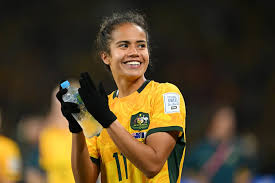
Mary Fowler – Dutch football influence on a Matildas star
At the age of 11, Mary and her family relocated from Cairns, Australia, to the Netherlands to support the football aspirations of Mary and her siblings. They settled in cities such as Rotterdam and Arnhem, immersing themselves in the Dutch football culture. During this period, Mary played for BVV Barendrecht,
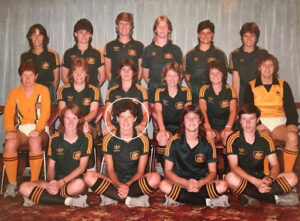
Mandi Langlar – second-generation Dutch-Australian footballer and the legacy of her father Pete
Mandi Langlar’s football journey reflects the contribution of Dutch migrants and their descendants to the development of Australian football, particularly on Sydney’s northern beaches. As a second-generation Dutch-Australian, Mandi carried forward a family passion for the game, achieving national honours at a time when women’s football was still fighting for
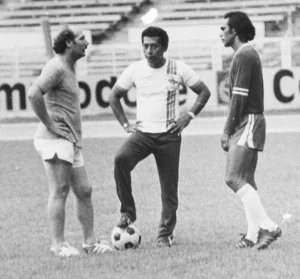
Frans van Balkom – from miner to Dutch-Australian football pioneer and global coach
Frans van Balkom was born on 23 October 1939 in Kerkrade, Netherlands, in the heart of the Limburg coal mining region. Like many from his community, Frans worked as a coal miner in the Limburg mines before their closure in the 1960s. His work in the mines took a toll
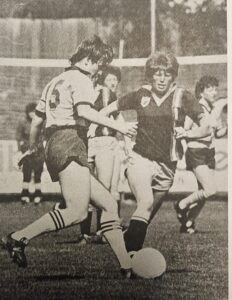
Liz Elliott (née Vervoort) – a Dutch-born football pioneer in Tasmania
Liz Elliott (née Vervoort) was born in 1956 in Venray, the Netherlands, where her parents ran a farm. Growing up as the only girl among six brothers, Liz developed her football skills in the backyard, playing alongside her siblings. Despite her enthusiasm, her father did not allow her to join
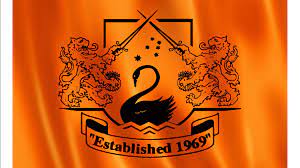
Dutch Society Neerlandia of WA Inc.
The earlier Dutch migrants that arrived in the late 1940’s had made several attempts to establish Dutch clubs in WA, such as the Dirck Hartogh Society and the Australian Dutch League, but these all folded after a short while. But during the early 1950’s the Dutch migrants arrived in larger

Painting ‘Dark History’ (2024)
This painting is part of the Creative Generation Excellence Awards in Visual Art, a showcase of outstanding work by senior high school students from across Queensland. The exhibition at the Queenland Gallery of Modern Art in 2025 celebrates young artists’ creative talents and their reflections on identity, agency and perspective.
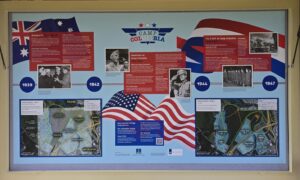
New heritage display at former Camp Columbia in Brisbane
A new, high-quality heritage display has been installed at the entrance to Pooh Corner Bushland Reserve, part of the former Camp Columbia site, in the south-west Brisbane suburb of Wacol. This location marks one of the last visible remnants of Camp Columbia. The new cabinet has been mounted on the
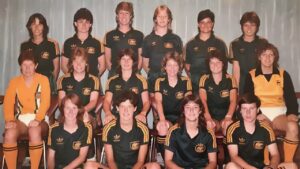
Renaye Iserief – A Dutch-Javanese-Australian Matilda with a natural gift for football
Renaye Iserief is a celebrated figure in the early history of Australian women’s football, but her story is also deeply tied to the broader Dutch-Australian migration narrative. She is one of two Dutch-Australian women — alongside Rose van Bruinessen — who proudly wore the green and gold as Matildas during
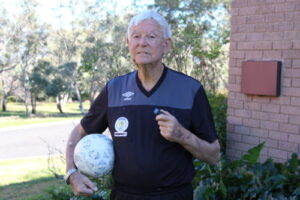
Henk Thijssens – A Dutch-Australian referee’s enduring legacy in Canberra football
Henk Thijssens (1937–2020) was a cornerstone of the football community in Canberra — a respected referee, coach, and club volunteer whose Dutch-Australian journey reflected a life shaped by resilience, service, and love for the game. From Winterswijk to the world Henk was born in 1937 in Winterswijk, a town in
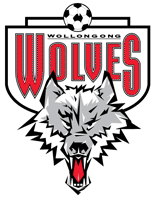
John Vlietstra – Dutch heritage and football legacy in the Illawarra
John Vlietstra is one of the most respected figures in the Dutch-Australian community of the Illawarra region, NSW. A tireless football administrator, community leader, and cultural advocate, his life story reflects the resilience of postwar Dutch migrants and their deep-rooted contributions to local Australian life — particularly through sport and

The Witschge Family in Australian Football Heritage
Dutch Origins and Migration The Witschge family is a notable Dutch-Australian football family that made its mark in Western Australia (WA). Theie eldest son Henry Witschge was born in Amsterdam and in 1954 his family emigrated to Australia. In WA, Henry became involved with the Windmills soccer club (later Morley-Windmills
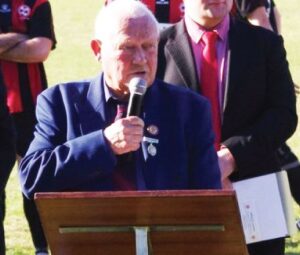
John Van Hoek – A Dutch-Australian pioneer in WA football and community life
John Van Hoek (1933–2016) was a passionate football coach, administrator, and community leader whose Dutch roots and tireless dedication helped shape the sporting landscape of Western Australia for over four decades. From Den Bosch to Ashfield Born in Den Bosch, the Netherlands, in 1933, John Van Hoek emigrated to Melbourne,
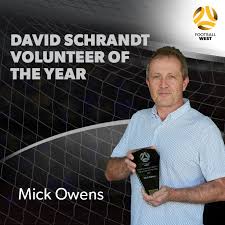
David Schrandt – From Dutch migrant to WA football statesman
David Schrandt, born in Breda, the Netherlands in 1946, is a prominent figure in Western Australian football, known for his contributions both on and off the field. After emigrating to Australia, he grew up in Perth and began his football career as a goalkeeper, later transitioning to a striker. He
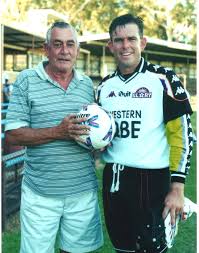
Dutch courage in goal: The Frank and Tony Franken story
Tony Franken, born on 11 January 1965 in Perth, Western Australia, stands as one of Australia’s most accomplished goalkeepers — and a proud product of Dutch migrant heritage. Frank Franken His story begins with his father, Frank Franken, born in the Netherlands in 1935. Like many Dutch migrants who arrived
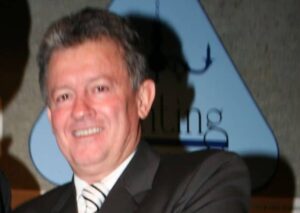
Footballer Rene de Koning
Rene de Koning is a Dutch-born footballer who made a significant impact on the Western Australian soccer scene as a versatile defender and midfielder. He was born in Nijmegen, 1963 emigrated to Western Australia with his family in 1980 and joined Bayswater as a schoolboy. At 17, he debuted in
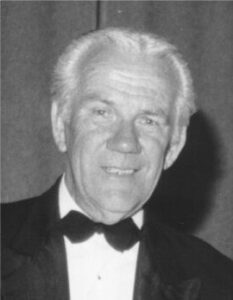
Henk Beumer football administrator WA
Hendrik “Henk” Beumer (1919–2000) was a pivotal figure in the development of soccer in Western Australia, particularly within the Dutch-Australian community. Born in Haarlem, the Netherlands, Beumer immigrated to Australia in 1950, a period marked by significant Dutch migration seeking new opportunities and contributing to Australia’s multicultural fabric. Founding of
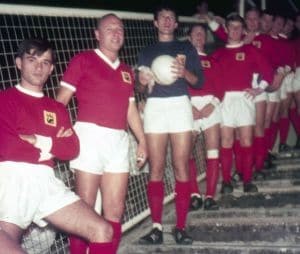
Goalkeeper Chris Wissink
Chris Wissink is a notable figure in Australian soccer, particularly within the Dutch-Australian community. Born in 1946 in Eindhoven, Netherlands, he emigrated with his family to Australia in 1954 and became a distinguished goalkeeper in Western Australia’s soccer scene. Club Career and Achievements Wissink’s soccer career in Australia was marked
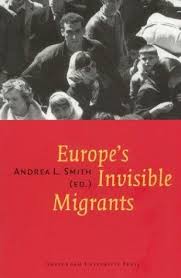
No Sheltering Sky: Migrant Identities of Dutch Nationals from Indonesia
Wim Willems, Institute for Migration and Ethnic Studies, The Netherlands In this chapter, in the book: Europe’s invisible migrants “No Sheltering Sky: Migrant Identities of Dutch Nationals from Indonesia” by Wim Willems, delves into the complex postwar migration and settlement experiences of Dutch nationals from Indonesia, focusing on their journeys

The Diary of Gerard Rhee – one the first Dutch migrants to Tasmania – 1940
The diary of G Rhee is quite unique because it was written in 1940. Gerard Rhee was one of the first Dutch migrants to Tasmania. There are interesting glimpses in this diary of a young man who fell in love with a local lass. Apart from notes about his courting,
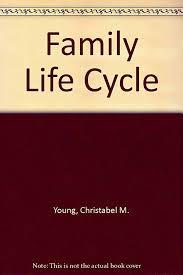
The Demography of the Dutch in Australia by Christabel Young
Christabel Young’s chapter offers a comprehensive demographic analysis of Dutch migration to Australia, tracing the development of the Netherlands-born population and their Australian-born descendants across several decades. Drawing on census data, birth/death records, immigration statistics, and health studies, Young provides an insightful account of the integration, transformation, and demographic profile
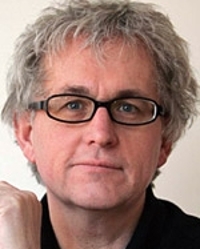
Breaking Down the White Walls: The Dutch from Indonesia
Introduction: Identity, Visibility, and Community Wim Willems’ chapter explores the neglected story of Dutch Eurasians—people of mixed Dutch and Indonesian descent—who migrated to Australia from the former Dutch East Indies (Indonesia) after World War II. The narrative begins with the landmark 1996 De Andere Nederlanders exhibition at the Dutch Consulate-General
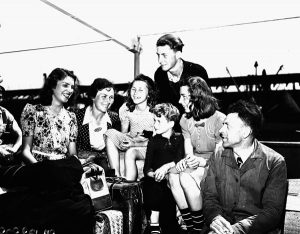
A Dutch Home in Australia: Dutch Women’s Migration Stories
By Wendy Walker-Birckhead This ethnographic study by Wendy Walker-Birckhead focuses on the migration experiences of Dutch women to Australia during the post-World War II period. Drawing on 48 case studies, it explores how migration has been understood and lived differently by Dutch men and women. While male narratives often frame
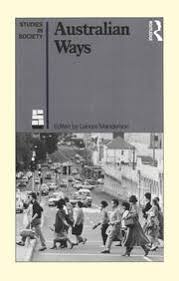
Older Dutch Migrants in Australia: Health and Life Style in Old Age
By Wendy Walker-Birckhead This ethnographic study by Wendy Walker-Birckhead explores the lived experiences, health perceptions, and lifestyle practices of older Dutch migrants in Australia. The chapter draws from qualitative interviews with 19 Dutch-Australians—11 first-generation migrants and 8 adult children—to understand how migration, cultural identity, and ageing intersect in later life.
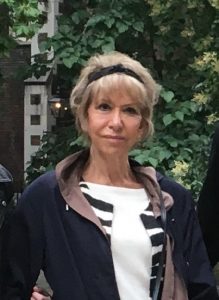
The Enterprising Dutch by Nonja Peters
Nonja Peters’ comprehensive chapter The Enterprising Dutch analyses the occupational adjustment and entrepreneurial activities of Dutch migrants in Western Australia after World War II, examining their transition from wage labour to self-employment. The study spans three distinct groups: first-generation postwar migrants (1947–1975), their Australian-born or raised children (second generation), and
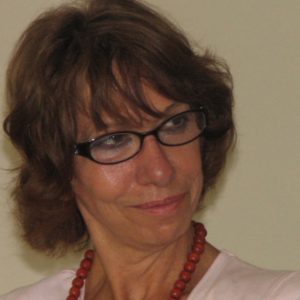
Milk and Honey – But No Gold: Postwar Migration to Western Australia 1945–1964
By Dr Nonja Peters In Milk and Honey – But No Gold, Dr Nonja Peters provides one of the most comprehensive accounts of postwar migration to Western Australia, with a particular focus on the Dutch and other European migrant communities. Based on archival research, oral history interviews, and personal observation,
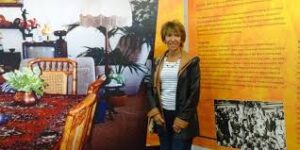
Selling a Dream: Expectation Versus Reality – Post-war Dutch and Other Migration to Australia 1945–1970
In this 2012 paper published in the AEMI Journal, Dr. Nonja Peters examines the migration experiences of approximately 160,000 Dutch individuals who relocated to Australia following World War II. The study delves into how various factors—local, national, and global influences, as well as social, cultural, and economic policies in both
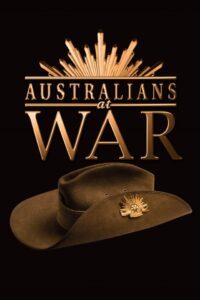
Australians at War in Netherlands East Indies – Film Archive
Selected individuals linked to the Netherlands East Indies (NEI) during World War II for which the Archives holds interviews. Click here for the interviews. The Archive is an Australian Government initiative, commissioned through the Department of Veterans’ Affairs. It is a unique, historical collection, a resource for everyone interested in
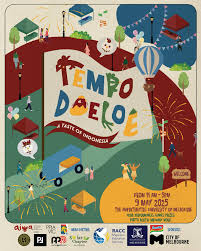
The Other Dutch – Remembering the Indo Experience
De Andere Nederlanders – The Other Dutch is a compelling bilingual exhibition and publication that tells the often-overlooked story of the Indo-European (Indische) community: the descendants of Dutch colonisers and local Indonesians in the former Dutch East Indies, now Indonesia. These “Other Dutch” developed a unique hybrid identity, blending European
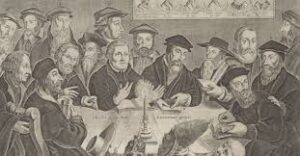
For Faith and Ideology (Dutch migration to Australia)
By Di Gabb and Roberta Julian This chapter traces two distinct yet ideologically aligned waves of Dutch migration to Australia—one preceding World War I and another following World War II. Both were driven not by typical economic motives or adventure but by deeply held ideological or religious beliefs, making these
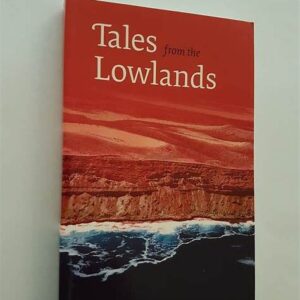
Joed Elich – Dutch sociologist and migration scholar
Dutch and Australian Government Perspectives on Migration By Joed Elich Introduction: Migration and the Double Perspective Joed Elich’s research takes a rare and crucial “double perspective” approach to Dutch-Australian post-WWII migration, examining not only the policies and motivations of each government but also the lived experiences of Dutch migrants and
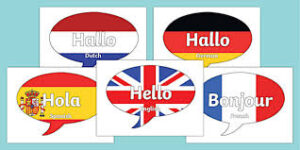
Dutch Australians in Perspective: Language, Identity, and Migration
Drawing on the Works of Desmond Cahill and Michael Clyne Introduction and Overview Post-war Dutch migration to Australia has long been perceived as an understated success story — a community that quietly integrated, worked hard, and caused few social ripples. Yet beneath this stereotype lies a more nuanced and layered
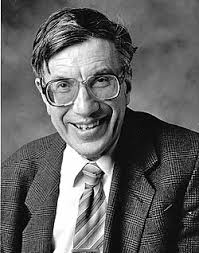
The Dutch Language in Australia – Some Comparisons with Other Community Languages
Author: Michael Clyne Introduction: In this seminal article, sociolinguist Michael Clyne investigates the unique trajectory of Dutch language use and decline in Australia, comparing it with other community languages such as Italian, Greek, German, and Vietnamese. His central question: Is the Dutch linguistic experience in Australia an anomaly, or does
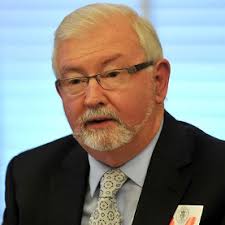
Lifting the Low Sky” – Dutch Australians: Assimilationists or Accommodationists?
Summary Desmond Cahill’s extensive analysis explores whether Dutch Australians have assimilated into mainstream Australian society or adapted through a more complex, accommodationist process. Drawing on historical, cultural, and statistical perspectives, Cahill challenges the longstanding stereotype of the Dutch as “the perfect migrants” who effortlessly assimilated and vanished into Australian life.
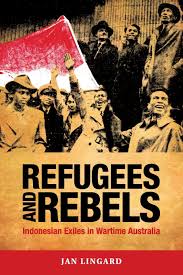
Refugees and Rebels: Indonesian Exiles in Wartime Australia
Jan Lingard’s Refugees and Rebels delves into the largely overlooked history of over 5,000 Indonesians—comprising military personnel, merchant sailors, civilians, and political prisoners—who found themselves in Australia during World War II. These individuals were evacuated from the Japanese-occupied Netherlands East Indies and were dispersed across various Australian cities and towns.
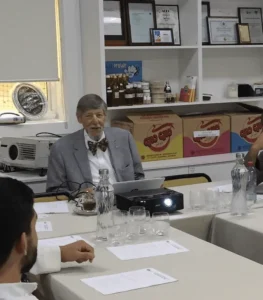
The Religious Contribution of Dutch Migrants to Multicultural Australia
By Gary Bouma Introduction and Summary: Dutch Religious Influences in Australia’s Multicultural LandscapeBased on Gary D. Bouma’s “The Religious Contribution of Dutch Migrants to Multicultural Australia” Dutch post-war migration to Australia is often told in terms of economic resilience, cultural adaptation, or family stories of hardship and hope. But less
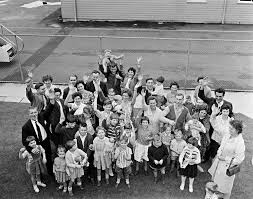
Explanations of Post-War Dutch Emigration to Australia
By Wim Blauw. Introduction and Summary: Understanding Dutch Emigration to Australia After WWII Why did tens of thousands of Dutch citizens leave their homeland after World War II, and why did so many choose Australia as their destination? Wim Blauw’s comprehensive study provides the most thorough sociological explanation to date.
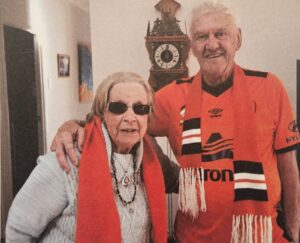
Jan (John) Morcus – a pillar of Dutch-Australian football and community in Brisbane
Jan (John) Morcus represents the spirit of Dutch migration that helped shape Brisbane’s football and community life. His passion for football, dedication to community building, and tireless volunteer work left an enduring legacy that continues today. John was born in the Netherlands, where his father Cor Morcus was a farmer
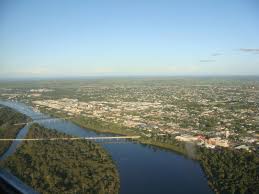
Dutchies in Bundaberg
This is a Dutch Australian Weekly article from 18 November 1991 Since 1989, Bundaberg has had a ‘Dutch Aussie Friendship Club’. Coming from Sydney, where many Dutch associations exist, the driving force behind D.A.F.C., Alex Zwarts, discovered that there was no longer a club in Bundaberg. The previous one had
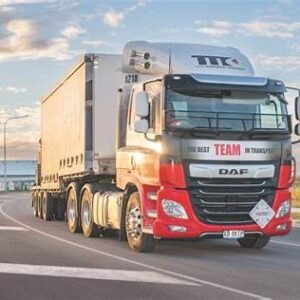
DAF Trucks: Dutch engineering on Australia’s roads
DAF Trucks, with its origins in Eindhoven in the Netherlands, represents one of the great Dutch industrial success stories of the 20th century. While widely recognised across Europe for its engineering quality and reliability, DAF has also carved out a firm place in the Australian trucking landscape. Yet the story
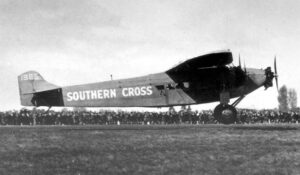
Fokker and Australia: A Century-Long Aviation Partnership
The Dutch aircraft manufacturer Fokker has maintained a significant presence in Australian aviation history, from pioneering flights in the early 20th century to modern-day operations. This article explores the evolution of Fokker’s involvement in Australia, highlighting key milestones and the current status of Fokker aircraft in the country. See also
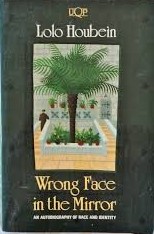
‘Wrong Face in the Mirror’ by Lolo Houbein
In 1987 Dutch Australian author Lolo Houbein published her book Wrong Face in the Mirror. Among other topics, this book deals with the author’s emigration to Australia in the 1950s as a twenty-four-year-old. Houbein describes the challenges of adapting to life in Australia as a Dutch migrant, including the struggle
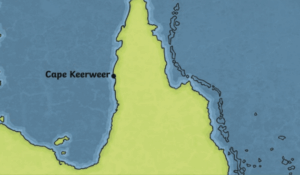
Cape Keer Weer: The First European Place Name in Australia – A Correction
By Peter Reynders For some time, I have argued that the proper English translation of the first European geographic name given to part of Australia is “Cape Return,” not “Cape Turn Again” or any of the other variants that have appeared in various publications. I believe this name was first
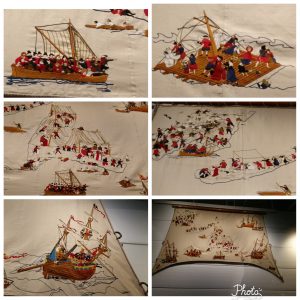
The Batavia and its many stories – New research challenges the Batavia mutiny narrative.
scroll down for: New research challenges the Batavia mutiny narrative The Batavia – 1629 The Batavia, built in Amsterdam in 1628 was the company’s new flagship, she sailed that year on her maiden voyage for Batavia. On 4 June 1629, the Batavia was wrecked on the Houtman Abrolhos, a chain

Dutch Migrants in Queensland
Author: J.A. Hempel (Jan Andrzej Hempel)Published: 1960Publisher: Department of Demography, Australian National UniversityLength: 100 pages Overview: This publication is a demographic and sociological study of Dutch post-war migrants in Queensland, Australia. It was part of a broader research program undertaken by the ANU’s Department of Demography to understand post-war migration
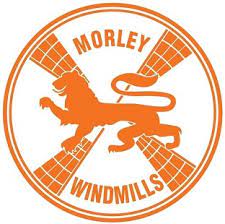
Morley-Windmills Soccer Club: A Dutch-Australian Football Legacy
Founded in 1950 by Dutch immigrants led by Henk Beumer, the Windmills Soccer Club began as a recreational outlet for the local Dutch community in Perth. The club was accepted into the Third Division of the Western Australian Soccer Football Association (WASFA) in 1951 and steadily progressed, earning promotion to
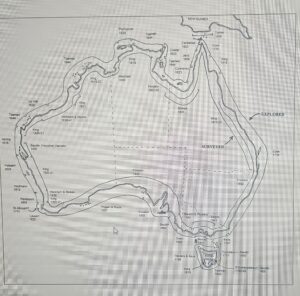
Dutch Voyages and Charting of the coast of Western Australia 1616-1727
YEAR NAVIGATORS VESSELS LOCATIONS KEY EVENTS KEY REFERENCES 1616 Dirk Hartog Eendracht Dirk Hartog Island 1st recorded sighting of west coast of Australia. Arrived 25 October, sailed 27 October. Left Hartog Plate. Major pp.ixxxi-xxxiv; Heeres pp.8-10 1618 Haevik Claesz. van Hillegom Zeewolf North West Cape Sighted North West Cape on
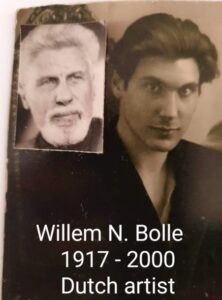
Two lives, one legacy: The art of Wim Bolle and the storytelling of his son Jorge
Wim Nicolaas Bolle (1917–2000) was a Dutch-born artist whose life and work were shaped by the cultural and emotional landscapes of the post-war era. Raised amidst Amsterdam’s vibrant artistic milieu, Bolle developed a visual language deeply informed by both his surroundings and his personal history. His artistic journey was profoundly
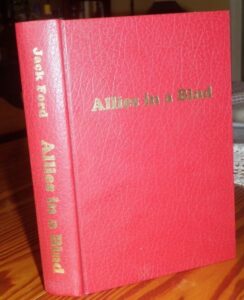
Forgotten allies: how Brisbane’s WWII history has faded from Dutch memory
Even in Brisbane, the global importance of the city’s role during World War II is largely unknown. While many locals are aware of the large American presence, few know that the Dutch also operated from here during the Pacific War. Even fewer in the Netherlands would be aware of the
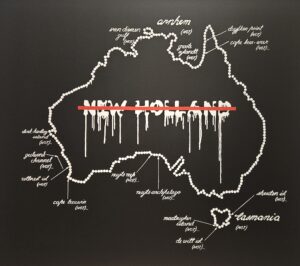
New Holland (NOT) – Painting by Blak Douglas and Adam Geczy
Blak Douglas is a Dhungatti man (Mackley Vally) NSW born in.1970 Adam Geczy is an Associated Professor at the Sydney College of the Arts born in 1969 The painting is done with synthetic polymer paint directly on the wall of the Queensland Art Gallery in Brisbane. The painting is a

‘Dutch Connections’ – ABC digitised radio programmes – 1988
Overview of the Series Title:“Dutch–Australian Connections”]Produced by: Australian Broadcasting Corporation (ABC) and Radio NederlandFormat: 8 x 10-minute radio programsYear: c. 1988 Theme: The series traces four centuries (from 1606 till 1988) of Dutch-Australian connections, covering early exploration, wartime alliances, migration stories, and shared cultural developments. The ABC can supply this
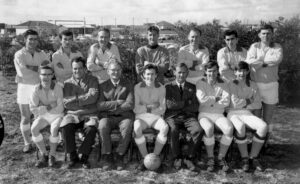
Dutch football legacy in Mount Gambier
In 1957, the Dutch Social Club of Mount Gambier established an amateur football team nicknamed Wit-Blauw (White-Blue), inspired by the colours of Dutch club De Graafschap. Coached by Tony Mulders, the team was multicultural but predominantly Dutch. Despite its promising start, Wit-Blauw lasted only three seasons before disbanding around 1960.
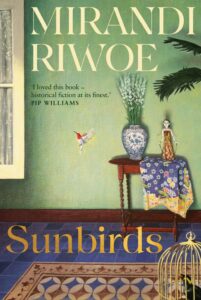
Sunbirds by Mirandi Riwoe
Sunbirds by Mirandi Riwoe (UQ Press, 2023) is a historical fiction novel set in the early 1940s in Java. The novel opens with protagonist Anna van Hoorn fleeing the Japanese Occupation of the Indies for the safety of Australia. Near the Australian coast, Anna’s plane is caught up in the
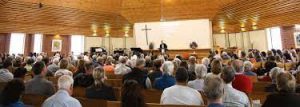
Reg Doedens: A life of faith, resilience, and community- Tasmania
The article below is a brief resume of the life of Reg Doedens. It is structured on the ghosted auto-biography prepared by Anne Rand, with additional notes by the reviewer, (a neighbour, cadet, employee, hardware store co-owner, interviewer (for another book), family friend and fellow Christian). Some of Reg’s story
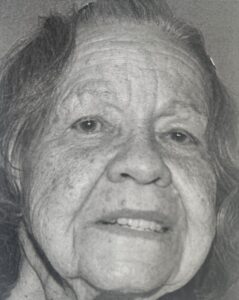
Eugenie Blackney survived the Japanese camps
I have lived in Forest Lake, Brisbane for years. But during World War 11,-I was in Java. When the Japanese invaded, the Dutch East Indies government escaped to Australia and ended up at Wacol, Brisbane. My family came later, in 1945. Dutch East Indies My grandfather was Polish, and he
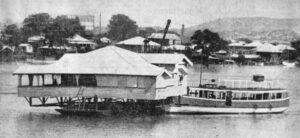
‘Moving Home’: Moving a Queenslander house to the Netherlands
‘Moving Home’ is a large-scale art installation and documentary project that exploresthemes of belonging and displacement through the physical relocation of a Queenslanderhouse from Brisbane, Australia to Eindhoven, The Netherlands. By dissecting the home’sfunction as a dwelling, an artefact, and a symbol of white settler identity, the projectengages with contemporary
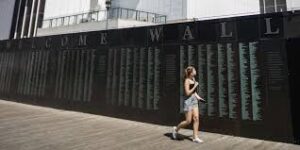
Search the Welcome Walls databases for immigrants.
Welcome Walls are monument dedicated to immigrants who have come to Australia and contributed to the nation’s development. It is a significant project aimed at acknowledging and celebrating the diverse heritage and stories of the millions of people who migrated to Australia from various parts of the world. They serve
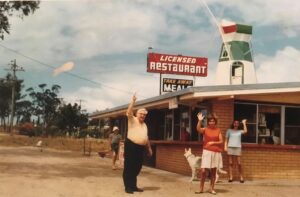
View the documentary film ‘Westlanders in Australia’: The Looyen family’s emigration journey
Westlanders in Australia is a documentary that tells the story of the Looyen family’s migration to Australia, as seen through the eyes of three generations. This “ordinary Dutch family” built a new life in Australia by establishing their own business and raising children, who in turn started families of their
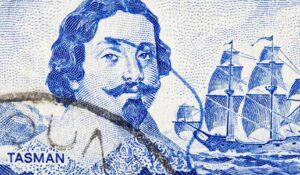
Abel Tasman tercentennial commemorated in London in 1942
With a hat tip to Tony Cunneen in Sydney, we were made aware of a folder in the National Archives of Australia: Netherlands Legation – Tasman Tercentennial (NAA: A6661.180). It begins with suggestions made in April 1942 to find an appropriate way to commemorate the 300th anniversary of Abel Tasman’s
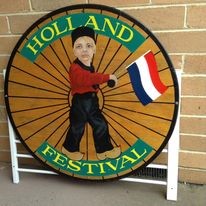
Holland Festival – Melbourne
The Holland Festival has been held in Melbourne each year for 40 years until 2014. After a three years hiatus, the Festival returned in 2017, 2019, 2020, 2023, 2024 and 2025. It is managed by the Rotary Club of Casey under the leadership of Paul Rubens. Holland Festival Management Committee
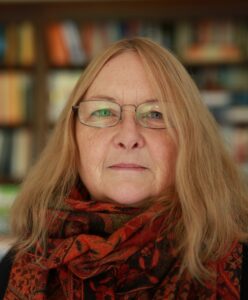
Finding Your Family in the Hostel by Dr Karen Agutter
If you’re searching for information about family members or friends who migrated to Australia and lived in hostels after World War Two, Dr. Karen Agutter has compiled a guide to help navigate state and national archives. Getting started Tracing migrant hostel records can be challenging, but Australia’s archives and libraries
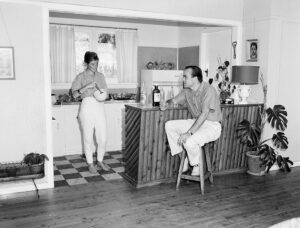
Nienke Teunissen – Reflections of a Granddaughter
The podcast JOS is an introspective exploration of Nienke Teunissen’s quest to uncover the life of her grandfather, Jos Teunissen, who passed away long before she was born. In 1956, at the age of 24, Jos and his wife Josee (who was then 19 years old) migrated to Australia on
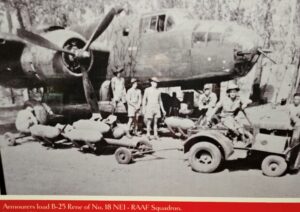
RAAF Members on Netherlands East Indies Aircraft + Archival documents
During World War II, members of the Royal Australian Air Force (RAAF) were involved in a variety of operations, including flying missions on aircraft belonging to the Netherlands East Indies (NEI) Air Force. This cooperation occurred after the fall of the Dutch East Indies (now Indonesia) to Japanese forces in

Dutch Migration to Tasmania in 1950: Motivation, Intention and Assimilation
“Dutch Migration to Tasmania in 1950: Motivation, Intention and Assimilation” is a thesis by Kees Wierenga, submitted in October 2005 for a Bachelor of Arts with Honours in History at the University of Tasmania. The study delves into the experiences of Dutch migrants who relocated to Tasmania in 1950, focusing
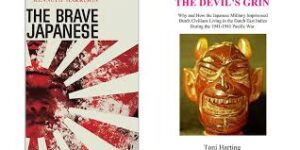
The Devil’s Grin – Japanese imprisonment of Dutch and Australian People
The book The Devil’s Grin by Toni Harting provides an in-depth exploration of the Japanese military’s imprisonment of Dutch civilians in the Dutch East Indies during the Pacific War (1941-1945). Harting offers a detailed account of the Japanese occupation, focusing on the brutality endured by prisoners in the concentration camps,

Brisbane@War: Australia, USA, Netherlands, and UK – Marking the 80th anniversary of WWII’s end with a symposium and tours
This year, 2025, marks the 80th anniversary of the end of World War II, a momentous milestone in Australia’s history and the conclusion of the war in the Pacific. Brisbane played a pivotal role as a strategic hub for Allied operations, cementing its place in global wartime history. The Camp
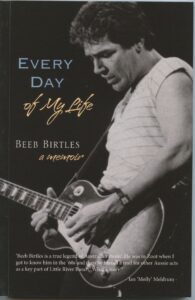
Beeb Birtles: From Dutch Roots to Australian Rock Legend
Beeb Birtles, born Gerard Bertelkamp on November 28, 1948, in Amsterdam, Netherlands, is a celebrated musician, singer, songwriter, and guitarist. As a founding member of iconic bands such as Zoot, Mississippi, and the Little River Band, Birtles has left an indelible mark on the music industry, both in Australia and

How did a VOC canon end up in Maryborough
N.E.I. ARTEFACT FOUND IN QUEENSLAND by Jack Ford Recently, Jack Ford was at Hervey Bay and he visited the nearby city of Maryborough. He visited the Town Hall building that was built in 1908 and he was surprised to find an old Dutch naval cannon mounted outside that building’s entrance.
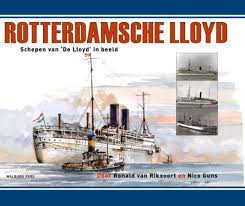
Help uncover Dutch-Australian migration stories through the Rotterdamsche Lloyd collection
The Dutch Australian Cultural Centre (DACC) is happy to support the CBG|Centre for Family History in their initiative to make the collection of the Koninklijke Rotterdamsche Lloyd (1883–1969) accessible and searchable. This extensive collection includes 30,000 scans of passenger manifests, ship logs, and crew lists, revealing an estimated 750,000–890,000 individual
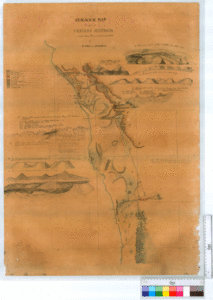
Dutch-born Ferdinand von Sommer left a trail of controversy across colonial Australia
Republished with permission. Original article was published in the Conversation on January 3, 2025 Author:Alexandra LudewigProfessor and Head of the School of Humanities, The University of Western Australia Disclosure statementAlexandra Ludewig does not work for, consult, own shares in or receive funding from any company or organisation that would benefit
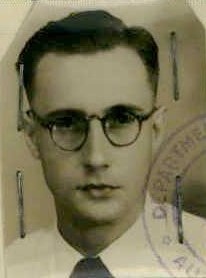
Alexander Jan Reitsma: Dutch economist and global academic influence
Read his full Wikipedia article here. Alexander Jan Reitsma (1919-1982) was a distinguished Dutch economist whose career bridged three continents, making significant contributions to the fields of international economics and trade policy. Born in Dordrecht, the Netherlands, he began his academic journey at the Netherlands University for Economics, earning advanced
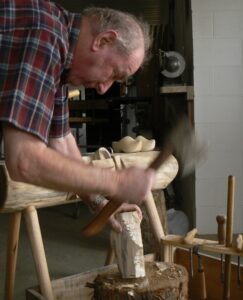
Clog Making in Tasmania
Clogs and Dutch are ideas that belong together, largely due to the success of marketing by the Dutch Tourism industry. A more or less unique product and a more or less unique people – a marketers dream combination. Reality is quite different. Very few Dutch migrants brought clogs with them,
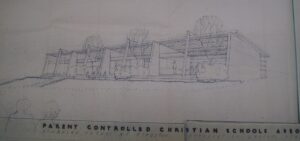
Calvin School Tasmania – became a model for Australia
Calvin School- the why and the consequences In the 1950s, education of children was the joint responsibility of the State and the local Municipality. The State provided the buildings, the teachers and the curriculum. The Municipal Councillors enforced truancy regulations , and managed requests for absences (because mum was sick

Little Groningen – Tasmania
This story is about how Little Groningen came to be. The name was coined by the farmer, Geard, who sold the land to the “G7” scouts, van der Laan and Pinkster. (The “G7” was a group of 7 families who had decided to emigrate to Tasmania and establish a building
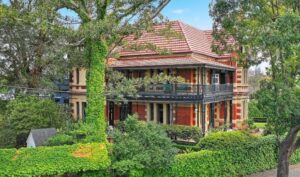
Sydney had two Dutch hospitals in the 1940s
Pierre van der Eng Sydney had two Dutch hospitals during 1944-1946. Both were related to the presence in Australia of a growing number of people from colonial Indonesia during 1942-1945. Since March 1942, officials of the government the Netherlands East Indies left Indonesia for Australia before the Japanese occupation of
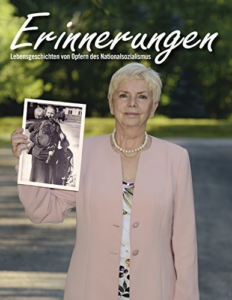
Erinnerungen family de Nijs
A family’s journey from persecution to peace In 1939, the Nazi regime upended the life of my grandfather, a tax accountant in Vienna, Austria. He owned a large apartment in the city, but being born in Czechoslovakia made him a target, despite my grandmother Caroline Kleiner’s Catholic faith and blonde
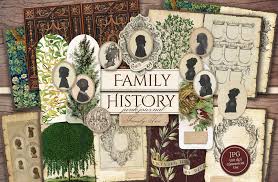
Researching Dutch Australian Family History
Are you interested in your Dutch Australian family history? Did your parents, grandparents, or great-grandparents migrate to Australia from the Netherlands? Or maybe you migrated to Australia from the Netherlands yourself and want to research your family history but don’t know where to start? Don’t worry, we’ve got you covered!
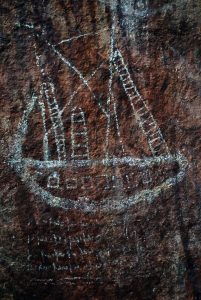
Aborigines and shipwrecks – the arrival of Australia’s first immigrants
Republished with permission. Chapter two from the book: A Touch of Dutch. For the full pdf click here. See also: First contact between the Dutch and the Aboriginal People
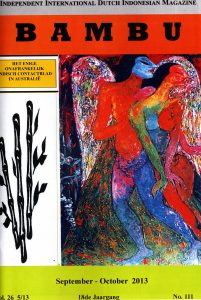
Indo (Eurasian) Communities in Australia
Dutch Indonesian Association – Cairns In April 1995 a small group of Indische mensen’ (people born in Indonesia), such as Rob Elstak, Eric & Rob Marcus, Leo Vandersar, Jan Schmieman and Andreas Flach, came together in Cairns and founded the ‘Dutch Indonesian. Association – Melati’ (Jasmine). Andreas Flach became the
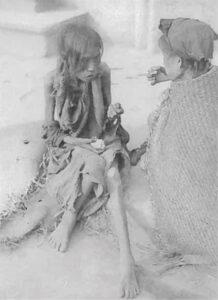
Missing millions: Java’s 1944–45 famine in Indonesia’s historiography
Introduction Very few people in Indonesia, Australia and the Netherlands know that during WWII many Indonesians fought on the side of the Allies. And nobody there knows the estimate of 4 million deaths. Because both are not part of Indonesia’s official history and therefore its public memory. The article below
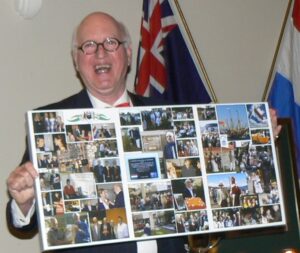
Dr Freddie von Schmidt
The new doctor There is a red book. It is one of many books in a series. This one is devoted to the letter ‘S’. There is nothing in it except surnames starting with ‘S’, and the history of these names. Because it is a Dutch book, the name ‘von
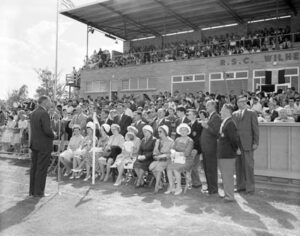
Jan van Hoboken founder of Wilhelmina D.S.C – now Ringwood FC (1908-1993)
Early Life and Career Jan (John) van Hoboken was born in 1908 in Aalten, Gelderland, Netherlands. He began his career in 1929 when he accepted a position at the Borsumij trading company in the Netherlands East Indies. In 1932, he married while living there. When the Japanese invasion of the
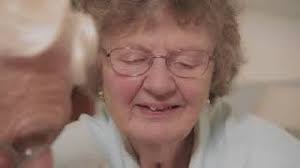
Gerard van Wezel and Marretje Ida Sonnenberg
Source: National Archives of Australia Gerard van Wezel migrated to Australia from the Netherlands in 1952 under an ex-serviceman assisted passage scheme. In January 1958, he began working as a technical officer with the Snowy Mountains Hydro-Electric Authority. During this time, he met fellow Dutch migrant Marretje Ida Sonnenberg, who
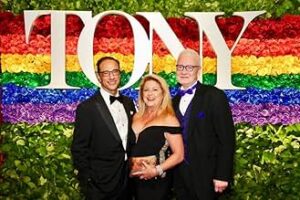
TV Star Sherry Wright (Berta van Wheeley)
Source: National Archives of Australia Sherry Wright, originally named Berta Joanna van Wheeley, migrated from the Netherlands to Australia with her family in 1950. Her father, having endured severe starvation during World War II, was advised to seek a warmer climate for health reasons, prompting the family’s relocation to Brisbane.
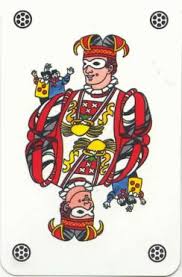
The City of Blacktown Carnival Society “The Jokers”
The following text is from a booklet published by the Federation of Netherlands Societies Ltd. in February 1985. The research for this booklet was done by Mijntje Hage. Like all the other carnival clubs, The Jokers consider it their duty to give as many people as possible a chance to enjoy themselves
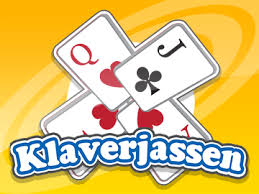
The N.S.W. Klaverjas Federation NSW
The following text is from a booklet published by the Federation of Netherlands Societies Ltd. in February 1985. The research for this booklet was done by Mijntje Hage. This Federation was formed a few years ago to incorporate all the existing “klaverjasclubs”, whether they were part of an organisation or a separate
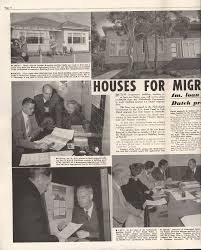
History of the Netherlands co-operative terminating building society schemes
The following text is from a booklet published by the Federation of Netherlands Societies Ltd. in February 1985. The research for this booklet was done by Mijntje Hage. The difficulties of the ‘first’ assisted immigrants were many, “housing” being one of the greatest problems. Although in post-war Holland housing was
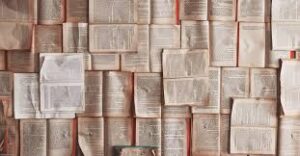
Author and contributor biographies
Republished with permission. Author and contributor biographies of the book: A Touch of Dutch. For the full pdf of the book click here. Introduction chapters of the book: Touch of Dutch
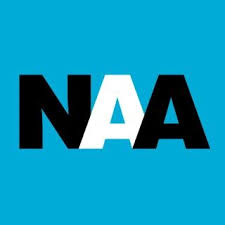
Tracing your Dutch ancestors in the National Archives of Australia
The National Archives of Australia (NAA) has a very extensive archive in relation to the Netherlands . Their archives only contain documents from government sources. The DACC collects private collections and private stories so the combination is complementary. The following article is republished with permission. Chapter 38 of the book:
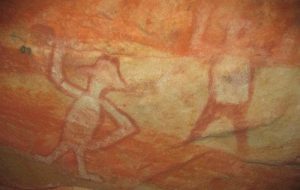
Our Mob: Shipwrecks survivors and WA Aboriginal Peoples
Republished with permission. Chapter 37 of the book: A Touch of Dutch. For the full pdf of the book click here. Introduction chapters of the book: Touch of Dutch
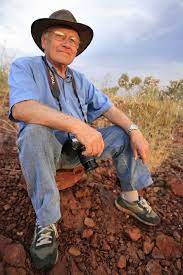
The photography of Richard Woldendorp
Republished with permission. Chapter 36 of the book: A Touch of Dutch. For the full pdf of the book click here. Introduction chapters of the book: Touch of Dutch See also: Dutch-Australian photographer Richard Woldendorp
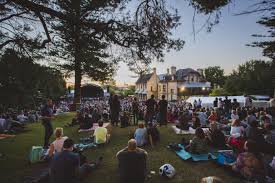
Floating: an exhibition of artworks at the Fremantle arts centre by Dutch Australians
Republished with permission. Chapter 35 of the book: A Touch of Dutch. For the full pdf of the book click here. Introduction chapters of the book: Touch of Dutch
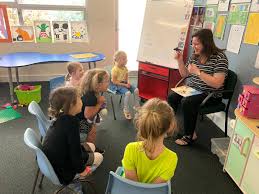
The Dutch School ‘De Schakel’
Republished with permission. Chapter 34 of the book: A Touch of Dutch. For the full pdf of the book click here. Introduction chapters of the book: Touch of Dutch
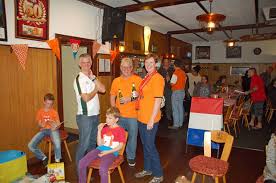
The history of Dutch clubs in Perth – WA 1950s-2016
Republished with permission. Chapter 33 of the book: A Touch of Dutch. For the full pdf of the book click here. Introduction chapters of the book: Touch of Dutch

21st Century Dutch Interests
Republished with permission. Section Five of the book: A Touch of Dutch. For the full pdf of the book click here. Introduction chapters of the book: Touch of Dutch
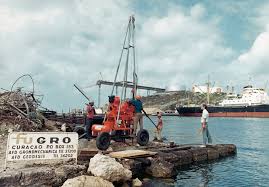
The Dutch in Business: the high-end of town
Republished with permission. Chapter 31 of the book: A Touch of Dutch. For the full pdf of the book click here. Introduction chapters of the book: Touch of Dutch
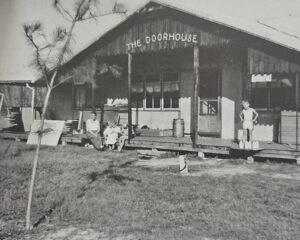
The Doorhouse – Wieman Family
Republished with permission. Chapter 30 of the book: A Touch of Dutch. For the full pdf of the book click here. Introduction chapters of the book: Touch of Dutch
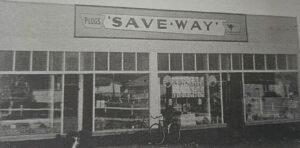
The Plug Family Business
Republished with permission. Chapter 29 of the book: A Touch of Dutch. For the full pdf of the book click here. Introduction chapters of the book: Touch of Dutch
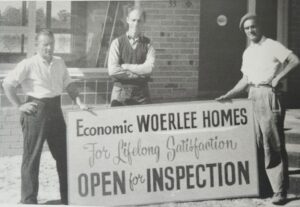
The migration experience of the Woerlee Family
Republished with permission. Chapter 28 of the book: A Touch of Dutch. For the full pdf of the book click here. Introduction chapters of the book: Touch of Dutch
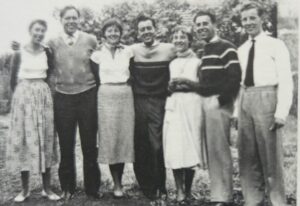
Emigration: My story – Peter Rietveld
Republished with permission. Chapter 27 of the book: A Touch of Dutch. For the full pdf of the book click here. Introduction chapters of the book: Touch of Dutch
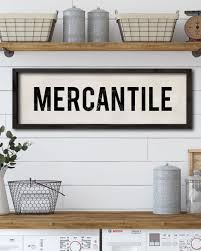
Book: Touch of Dutch – Mercantile
Republished with permission. Section Four of the book: A Touch of Dutch. For the full pdf of the book click here. Introduction chapters of the book: Touch of Dutch
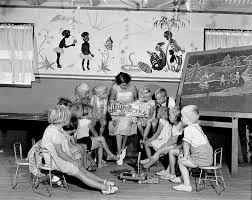
Between two world : second generation Dutch migrants in Western Australia
Republished with permission. Chapter 25 of the book: A Touch of Dutch. For the full pdf of the book click here. Introduction chapters of the book: Touch of Dutch
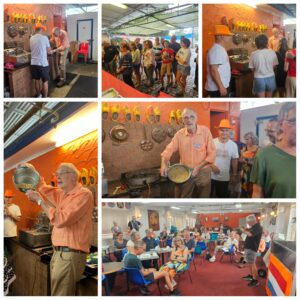
First gathering of all Dutch organisations in Brisbane
As of 16 November 2024, all known Dutch organisations in Brisbane—loosely connected under the Dutchlink Brisbane banner—came together for the first time to strengthen connections and get to know each other better. The event was centered around the making of bitterballen. The Dutch Chamber of Commerce Queensland (DCCQ) and the
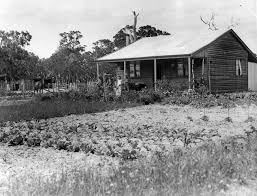
Making a Dutch home in Western Australia from the 1950s
Republished with permission. Chapter 23 of the book: A Touch of Dutch. For the full pdf of the book click here. Introduction chapters of the book: Touch of Dutch
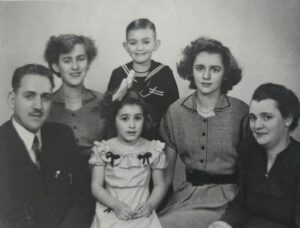
Ticket to a new life
Republished with permission. Chapter 22 of the book: A Touch of Dutch. For the full pdf of the book click here. Families Crijns, Coenen, Verveer Introduction chapters of the book: Touch of Dutch
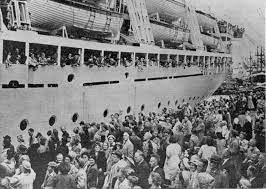
Roller Coaster Migrants
Republished with permission. Chapter 21 of the book: A Touch of Dutch. For the full pdf of the book click here. Families Rietveld, Rijnders Introduction chapters of the book: Touch of Dutch
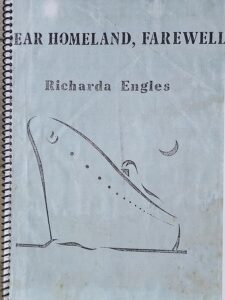
Dear Homeland, Farewell by Richarda Engles
In this booklet, written in the 1980s, Richarda (‘Richa’) Engles (born 1924 in Rotterdam) shares her life story with her readers. With candour and memory for detail she recounts her youth in The Netherlands and her marriage to widower Jacob (‘Jaap’) van der Meer (1916-1970) who brought his five children
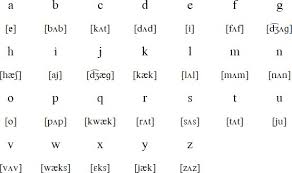
Double Dutch – the Dutch language in Western Australia
Republished with permission. Chapter 20 of the book: A Touch of Dutch. For the full pdf of the book click here. Introduction chapters of the book: Touch of Dutch
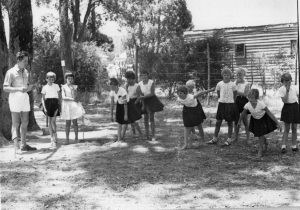
The Free Reformed Community in Western Australia
Republished with permission. Chapter 19 of the book: A Touch of Dutch. For the full pdf of the book click here. Introduction chapters of the book: Touch of Dutch
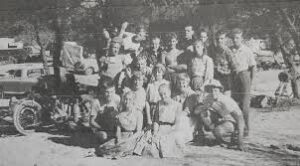
Boomerang Church Youth Club Perth
Republished with permission. Chapter 18 of the book: A Touch of Dutch. For the full pdf of the book click here. Introduction chapters of the book: Touch of Dutch
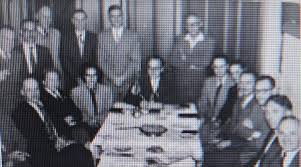
The Hervormde Kerk in Perth
Republished with permission. Chapter 17 of the book: A Touch of Dutch. For the full pdf of the book click here. Introduction chapters of the book: Touch of Dutch
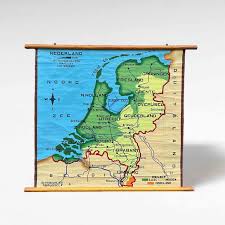
Migration- Leaving from the Netherlands
Republished with permission. Chapter 16 of the book: A Touch of Dutch. For the full pdf of the book click here. Introduction chapters of the book: Touch of Dutch
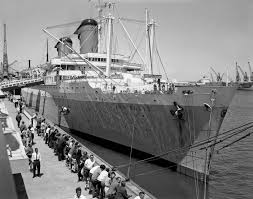
Fremantle: First step to a new future – migration
Republished with permission. Chapter 15 of the book: A Touch of Dutch. For the full pdf of the book click here. Introduction chapters of the book: Touch of Dutch See also: Bonegilla the largest migrant camp – 18.000 Dutch people passed through
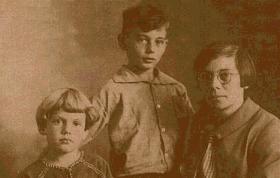
Dutch socialist pioneer links with Dutch literary giants
Republished with permission. Chapter 14 of the book: A Touch of Dutch. For the full pdf of the book click here. Introduction chapters of the book: Touch of Dutch See also: Dutch authors van het Reve and their link with Australia.
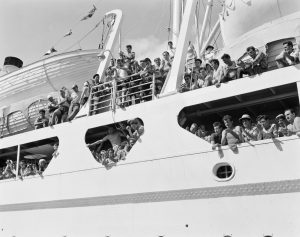
Book: Touch of Dutch: Migration
Republished with permission. Section 3 of the book: A Touch of Dutch. For the full pdf of the book click here. Introduction chapters of the book: Touch of Dutch
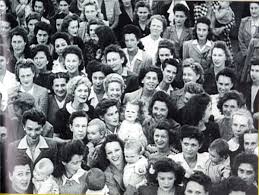
Through the looking glass: an Australian War Bride writes home
Republished with permission. Chapter 11 of the book: A Touch of Dutch. For the full pdf of the book click here. Introduction chapters of the book: Touch of Dutch
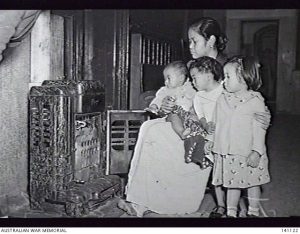
‘These were wild times’: the evacuation of Dutch nationals from the former Netherlands East Indies to Western Australia, 1945-46
Republished with permission. Chapter 10 of the book: A Touch of Dutch. For the full pdf of the book click here. Introduction chapters of the book: Touch of Dutch See also: Evacuees and Refugees from Netherlands East Indies recuperating in Australia after WWII
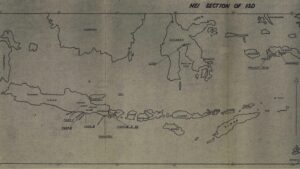
Netherlands East Indies Dutch: experiences of war, occupation, revolution and evacuation, and rehabilitation in Australia 1942-1946
Republished with permission. Chapter 9 of the book: A Touch of Dutch. For the full pdf of the book click here. Introduction chapters of the book: Touch of Dutch
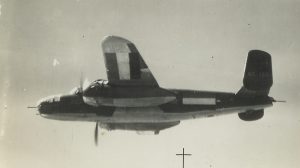
Operation Potschot: Dutch airmen in the defence of Western Australia, 1944
Republished with permission. Chapter 8 of the book: A Touch of Dutch. For the full pdf of the book click here. Introduction chapters of the book: Touch of Dutch See also: No 18 and 120 Squadrons involved in the Western Australian Emergency – March 1944
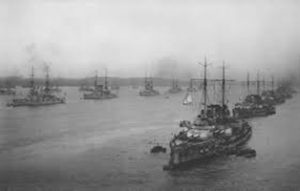
The Dutch Turn Up Down Under – WWII
Republished with permission. Chapter 6 of the book: A Touch of Dutch. For the full pdf of the book click here. Introduction chapters of the book: Touch of Dutch
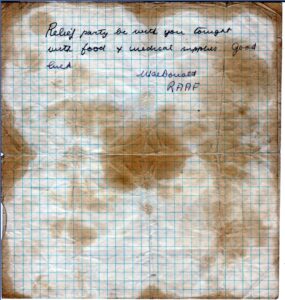
The Diamond Mystery -1942
Republished with permission. Chapter 5 of the book: A Touch of Dutch. For the full pdf of the book click here. Introduction chapters of the book: Touch of Dutch See also: The Lost Dutch Diamonds on Carnot Beach, Western Australia
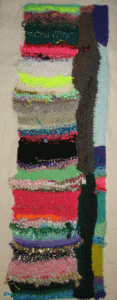
Textile Artist – Aadje Bruce
Born in Amsterdam 11-10-1934, died 5-4-2011 in PerthTextile Artist / Fashion Designer and Mixed Media Artist. Active Period c.1958 – c.2008 Artistic education: Diploma of Art Studies, Perth Technical College (1957), BA Fine Art (Fibre Textiles) Kunstnijverheidsschool/Rietveld Academie, Amsterdam (1982), BA (Sculpture) Curtin University (1990), M.A. Visual Arts, Curtin University
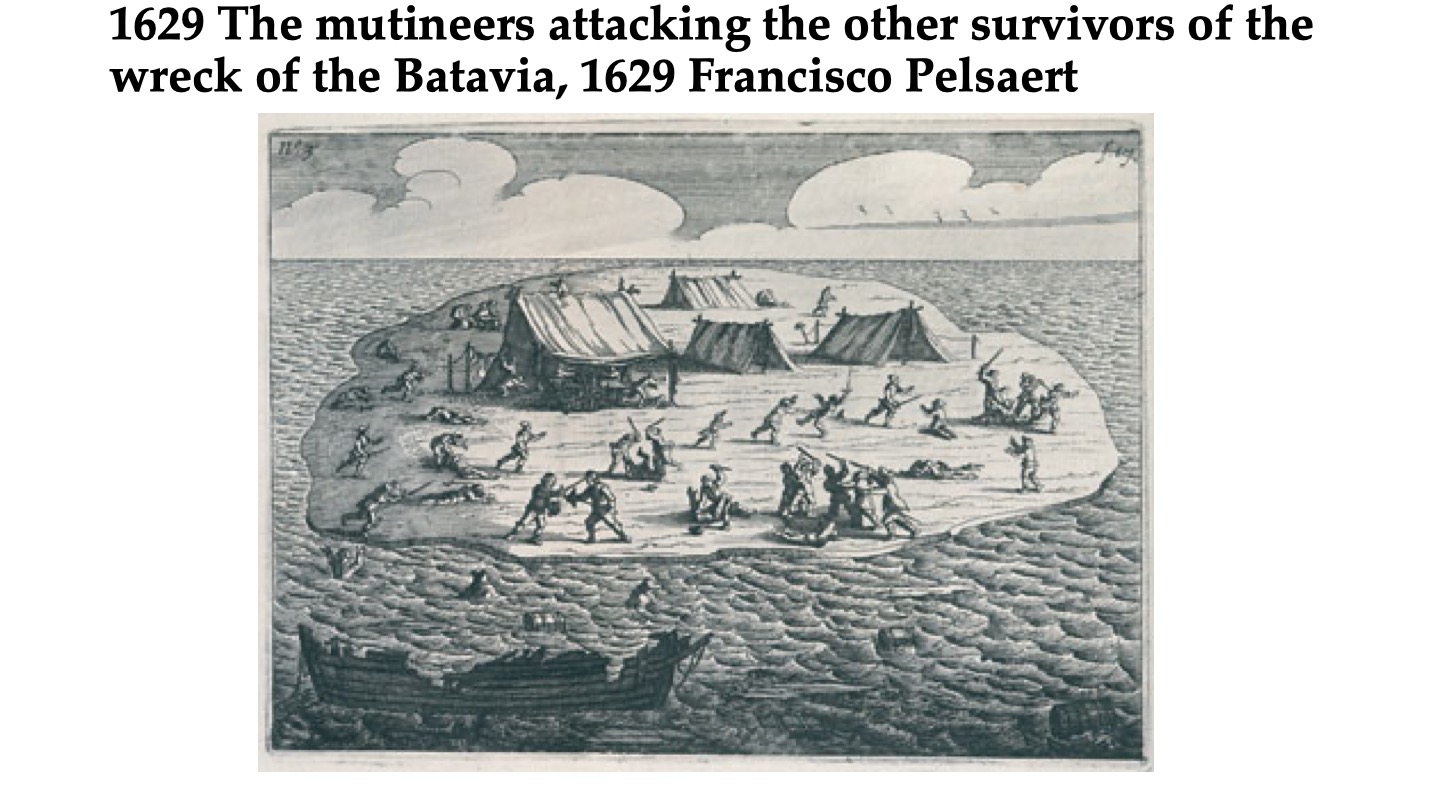
Anthropological analyses of human skeletal remains associated with the Batavia Mutiny
Republished with permission. Chapter 3 of the book: A Touch of Dutch. For the full pdf of the book click here. Introduction chapters of the book: Touch of Dutch See also: Dirk Drok and the discovery of the Batavia The Batavia and its many stories. Batavia research at Flinders University Archaeology

Aboriginals and Shipwrecks – The arrival of Australia’s first immigrants
Republished with permission. Chapter 2 of the book: A Touch of Dutch. For the full pdf of the book click here. Introduction chapters of the book: Touch of Dutch
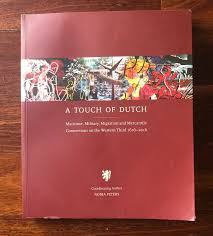
Book: Touch of Dutch – Introduction & Contents
Republished with permission. Introduction chapters of the book: A Touch of Dutch. For the full pdf of the book click here. Full index of the book with links to each chapter see below. Section One: Dutch Maritime history in Australia Chapter 2 Aboriginals and Shipwrecks – The arrival of Australia’s first
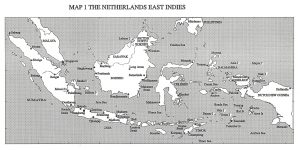
Inventaris Digitale collectie Project ‘Afscheid van Indië’
Inventory Digital Collection Project ‘Farewell to the Indies’

From the Pitch to Perseverance: The Remarkable Journey of Bill Westerveld
Bill Westerveld’s life story is a testament to his enduring passion for football and resilience in the face of adversity. His journey in the sport took him across continents, representing his homeland at the youth level before embarking on a new chapter in New Zealand and later in Australia. Born
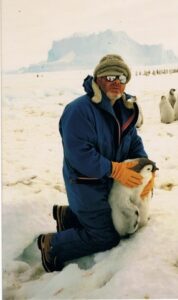
Peter Herweynen – From Canadian chocolate to Antarctic builder
When he was 18 years old, Jan van Herweynen was asked by his father to travel to Tasmania, purchase a piece of land and begin building a house. Jan was accompanied by his cousin Bob Brinkman and the sister of his mother, Janny de Jonge. They left Schipol airport in
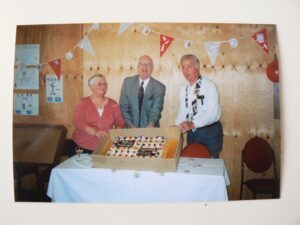
Card Club – Ons Genoegen Tasmania
Saturday the 21st of April was the day the Klaverjas Club “Ons Genoegen” celebrated their 50th anniversary. The celebrations started in the morning at the Lenah Valley RSL clubrooms. Players had come together from Launceston and Hobart to participate in a tournament of wits and skill (and a bit of
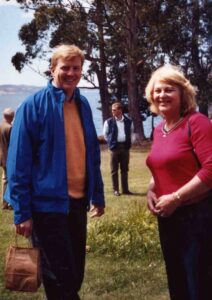
Royal Visit to Tasmania
This article was written during the 2006 Dutch royal visit to Australia. It was weeks of anticipation for the Dutch Community in Tasmania, as they received preliminary invitations and two general invitations in the Saturday Mercury, for the Royal visit. His Royal Highness, the Prince of Orange, and Her Royal
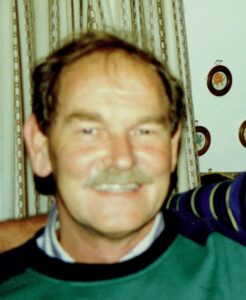
The Rook family: A Tasmanian migration story
By Meinard Karel Rook – Compiled in 2005 ArrivalWe arrived in Australia in August 1950, after a 6 week voyage from Holland on the Sibijaek. Our first land fall was in Fremantle, then on to Melbourne, where we transferred to the Taroona for the voyage across Bass Strait to Beauty
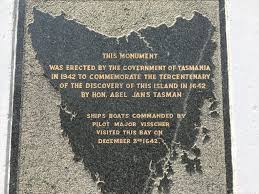
Abel Tasman Stories
Special Tasman’s Briefcase to mark the 300th anniversary of the death of Abel Tasman The briefcase was made from black leather, embossed with the Tasmanian coat of arms. Inside there were several compartments. The main compartment contained a carved {profile?] head of Tasman let into a block of Tasmanian myrtle.A
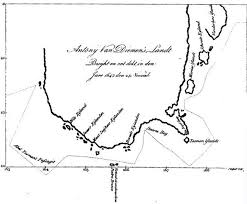
Dutch Tasmanian Connection
Due to changing times and ageing volunteers, and lack of interest amongst the next generation, the Dutch-Australian Society ‘Abel Tasman” (DAS) faded away in the years 2012 – 2015. The strength and commitment to be involved in community events waned. Sinterklaas decided it was too far to come. However, the
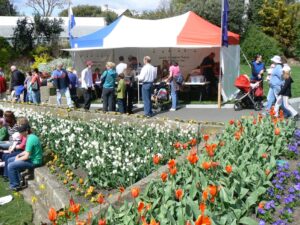
Dutch-Australian Society ‘Abel Tasman” and the tulip festival
BLUE GUM, TULIP & SPRING FESTIVALS From the newsletter of the DAS (Dutch-Australian Society), the Tasman Telegraphs, I have noted the following:[reporting of events the DAS usually lacked pertinent details, as if these facts were common knowledge. In some years there was simply no report. Below is not a selection,

George Huizing Honorary Consul Tasmania
George Huizing 8/9/1938 – 27/12/2016 A newspaper clipping on my desk reminds of the last time I saw George. The clipping concerns a lost property title, in the parish of Lorainah. Property belonging to JKF von Schmidt. I quickly dropped an email to the owner – “where is Lorainah?” JKF,
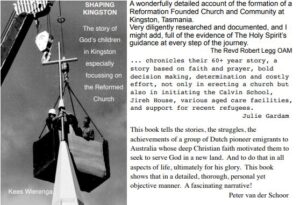
Dutch-Tasmania books
Shaping Kingston – The story of God’s children in Kingston especially focussing on the Reformed Church – written by Historian Kees Wierenga – $40 plus postage Copies of this book are held by the State Library of Tasmania. Copies may also be obtained from the author, as noted above. The
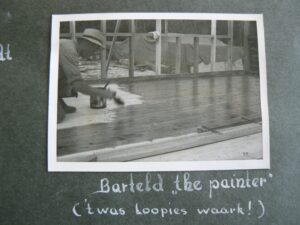
Eulogy Bart Jan Folkerts – 1999
We praise God for the life and witness ofBart Jan Folkerts18 September 1911 to 24 October 1999 An Association [Christian Parent-Controlled Schools] Founder and Gold Member“Now with the Lord he loved and served … a man of strength,courage and determination, a fighter for what he believed in.” “My Grace is
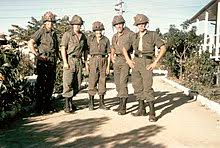
Charlie Rook’s diary of his National Service 1968/69
The journal below is based on the diary Charlie kept through his National Service days. It was later edited by him, and passed to this editor for inclusion in the record of achievements of Dutch migrants to Tasmania. It may be seen as the description of the life of an
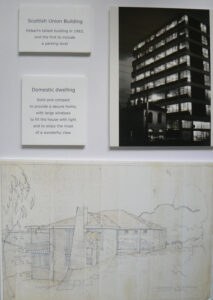
Tasmanian Architect Dirk Bolt
In October 1951 Dirk Bolt migrated from his native Groningen, the Netherlands, to Kingston, Tasmania, Australia, where he married Guusje (Kusha) van der Laan in January 1953. In 1964 they moved to Canberra. From 1971 onward, they moved to various places in response to a series of international appointments
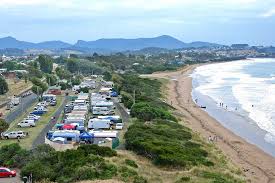
Dutch settlers in Ulverstone, Tasmania
Fair Dinkum Dutch Courage Compiled by Elizabeth Nickols (27 families) Excerpts (and some additional notation by Kees Wierenga)Brandsema, Wilko (Bill) and Hendrikje (Hennie) nee Wind(pp.1 – 9, 20 photos) Wilko was born in 1910 in Stadskanaal, the son of a baker. Hennie was born a year later, her father a
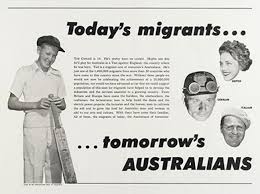
Dutch Identity and Assimilation in Australia: an interpretative approach (thesis)
A thesis submitted for the degree of Doctor of Philosophy of the Australian National University by Wendy Walker-Birckhead – July, 1988 Abstract This ethnographic study examines Dutch identity and assimilation in Australia. Historically, Dutch migrants have been regarded as a highly assimilated group who, upon arrival in Australia, willingly abandoned
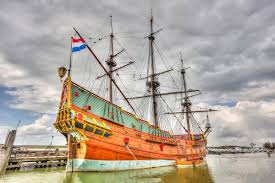
Reports on Australia Dutch Heritage Days – 2012
In 2012, Australia Dutch Heritage Conferences were held in Canberra, Fremantle and The Hague with the support of the Netherlands Ambassador to Australia Willem Andreas . See also: Conference Papers and Keynote addresses by researchers Migrant (R)e-collections- Proposal for a workshop (historic) Project Migrant Australian and Dutch emigrants Dutch Australia At
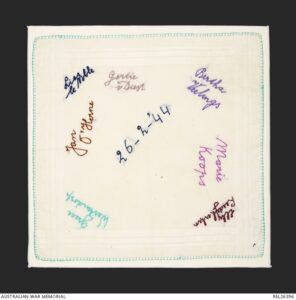
Handkerchief of the Dutch ‘Comfort’ Women WWII
50 years of silence ‘How can you tell your daughters, you know? I mean, the shame, the shame was still so great. I knew I had to tell them but I couldn’t tell them face to face . . . so I decided to write it down.’ Jan Ruff O’Herne’s

B-25 bombers ordered by the Dutch ended up with USAAF
Urgent need to replace aging planes – 162 new planes ordered The Netherlands nor NEI and nor Australia for that matter were well prepared for war. In NEI the ML-KNIL were using the no longer up-to-date Martin bombers (from the Glenn L. Martin Company in the USA). They were the
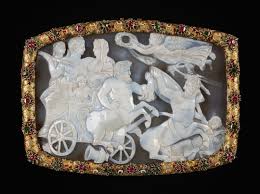
The Gemma Constantiniana and the Batavia shipwreck
The Gemma Constantiniana is a remarkable artifact – only one of three of the Roman period – that weaves together the stories of ancient Rome, Dutch maritime history, and European royalty. This 4th-century CE sardonyx cameo, created during the reign of Emperor Constantine the Great, celebrates the emperor and his
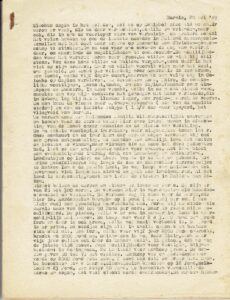
Letters from emigrant Jan de Vries – Tasmania 1949
Introduction The following are 29 letters, written by one of the first Dutch migrants to Tasmania, who settled in Penguin in 1949. He composed these letters as reports for his cohort still in the Netherlands, encouraging them to prepare for their eventual migration and urging them to act quickly. It
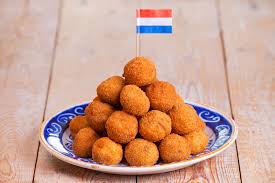
What’s for dinner for Dutch emigrants
The chapter Bitterballen, snacks, nostalgie en Holland-promotie (Bitterballen, snacks, nostalgia, and Holland promotion) in the publication ‘Wat schaft de pot‘ (What’s for dinner) discusses the role of traditional Dutch food, particularly bitterballen and other snacks, in maintaining nostalgia and cultural identity for Dutch emigrants, including those in Australia. Bitterballen, a
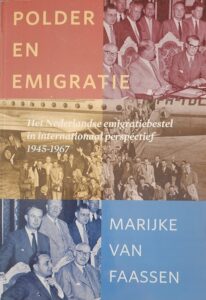
Polder and Emigration: Dutch emigration governance in an international perspective 1945-1967
Marijke van Faassen In “Polder and Emigration,” the Dutch emigration policy is analyzed as an integral part of the Netherlands’ social and economic policy between 1945 and 1967. The book delves into how various key players from government and civil society collaborated post-1945 to shape this policy, situating it within
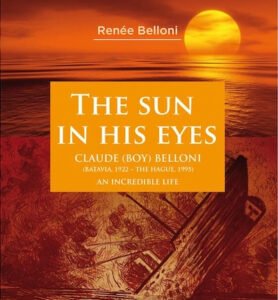
Claude Belloni-Dutch-Indonesian in Australia
The Sun in His Eyes, is book written by Renée Belloni. It explores the life of Claude Belloni, a Dutch-Indonesian man whose experiences capture the complex identity struggles of mixed-race Indonesians during and after Dutch colonial rule. Claude’s life, marked by extraordinary events—from surviving a shipwreck and witnessing the atomic
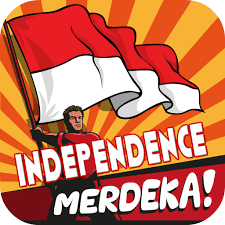
Indonesian Independence: Australia’s Involvement.
This paper by Dr.Nonja Peters presents a comprehensive exploration of Australia’s involvement in Indonesian independence and the complex historical narrative surrounding the Dutch East Indies during and after World War II. It addresses the “History Wars” between Dutch and Indonesian perspectives on Indonesian independence, focusing on critical issues such as
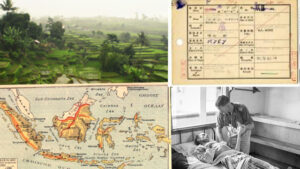
Dutch evacuations from Indonesia to Australia
This paper written by Dr. Nonja Peters, explores the social and political context of two evacuations out of the Netherlands East Indies (NEI) into Australia, the first from just before the Kalidjati capitulation on 8 March 1942 the second in the aftermath of war from 1945 to 1948. Who were
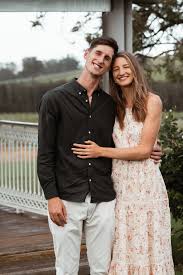
Dutch connection for Australian high jumper Nicola Olyslagers
Nicola Lauren Olyslagers (née McDermott) (born 28 December 1996) is an Australian high jumper. She won the silver medal at the Tokyo 2020 Olympics and the bronze medal at the 2023 World Athletics Championships in the high jump. Olyslagers is the current high jump Oceanian record holder, and the world
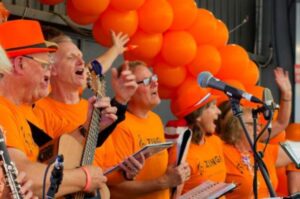
Community music, identity and belonging among Dutchies in Australia.
This article discusses the experiences of Dutch identity and belonging to a music-making group in the Dutch migrant community in Melbourne, Australia. The article shows how making music together can bridge generational, gender and class differences. Multiculturalism empowered the participants to explore their dual identity as Dutch Australians, intersecting with
The Life and Legacy of Dien Knol – Freese (1905 – 2001)
Born on December 15, 1905, in Groningen, the Netherlands, Berendina Annagena (Dien) Knol (née Freese) led a remarkable life marked by resilience, faith, and service. Her family migrated to Australia in 1928 after her father, Jurjen Peter Freese, faced financial ruin in the Netherlands. Dien, aged 23 at the time,
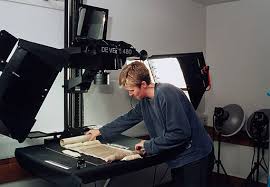
Digital Preservation of Cultural Heritage
The paper “Digital Preservation of Cultural Heritage” examines the current state of digitalisation in Australian archives and libraries, comparing it with global trends. It highlights how technological advancements and globalisation allow us to rethink how we preserve cultural heritage, especially in relation to migration. Migrant histories, scattered across borders, require
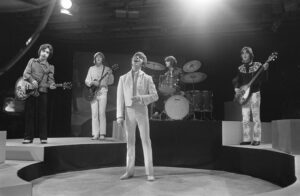
Dick Diamonde (1947-2024)
Dingeman Adriaan Henry van der Sluijs, better known by his stage name Dick Diamonde, was a Dutch Australian bass player. Born in the Dutch town Hilversum, Diamonde emigrated to Australia with his parents when he was four years old. The family lived in the Villawood migrant hostel in western Sydney
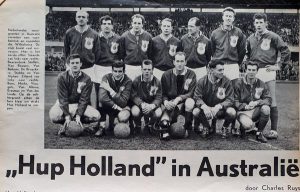
Dutch Soccer Legacy in Eastern Melbourne: From Wilhelmina to Ringwood City FC
The late 1950s and early 1960s marked a significant period in eastern Melbourne’s soccer history, as Wilhelmina emerged as a prominent club, laying the foundation for a cluster of local district clubs with strong Dutch influence. These clubs, including Hollandia, Fern Tree, Ringwood United, and Mooroolbark, thrived with Dutch backing,
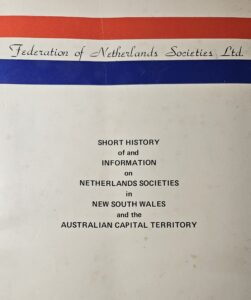
The history of Dutch Clubs in NSW
Short history of and information on Netherlands Societies in NSW and the ACT. The following text is from this booklet published by the Federation of Netherlands Societies Ltd. in February 1985. The research for this booklet was done by Mijntje Hage. Acknowledgement Many thanks to the clubs, their secretaries, and
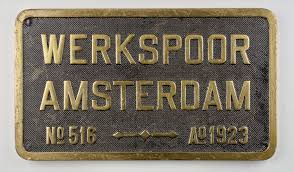
Werkspoor Australia
In 1952, Werkspoor Engineering Works, a Dutch construction company, was commissioned to construct the Shell refinery plant in Geelong, Australia. On 18 March 1954, the Geelong refinery became the first of Australia’s post-war refineries to come on stream. Its commissioning sent ripples of excitement throughout the Geelong community and was
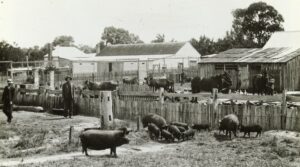
Pioneering Dutch settlers in the 1920s-In search of utopia
By Diane Gabb Introduction Much has been written about the large numbers of Dutch migrants who sought a new home in Australia after the devastation of World War II when over 200 000 citizens had lost their lives and the failed Netherlands economy had little to offer but emigration propaganda. Australia
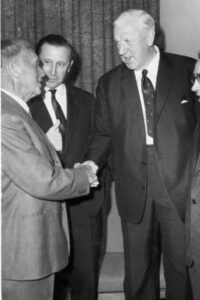
Impact of FIFA Transfer Ban on Australian Football and Dutch Influx: 1959
Following the 1957 Australian Football Coup Australian football clubs began recruiting players from European clubs like those in Austria and the Netherlands. Thirty-four players, including thirteen from Dutch clubs, migrated to Australia, sparking a dispute over transfer fees. In response, FIFA banned Australia from international competitions until transfer fees were
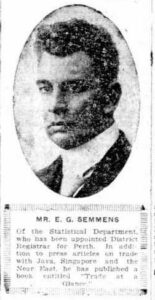
Edgar Semmens founding member Netherlands Chamber of Commerce WA – 1903
Edgar Semmens was married to Anna Siebenhaar, who had arrived from the Netherlands in the 1890s, following her younger brother the socialist and activist Willem Siebenhaar who had arrived in Perth a few years earlier. As a result of his marriage to Anna – who was active in the small
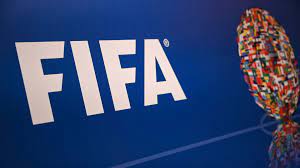
The Dutch Influence in the Australian Football Revolution of 1957
The history of soccer governance in New South Wales, Australia, dates back to 1882, evolving through various associations until the formation of the Australian Soccer Football Association (ASFA) in 1921. By 1943, the New South Wales Soccer Football Association was established to oversee the sport within the state. In 1957,
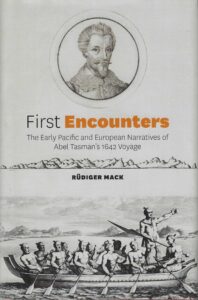
‘First Encounters: The Early Pacific and European Narratives of Abel Tasman’s 1642 Voyage’ by Rüdiger Mack
New Zealand-based author Rüdiger Mack is releasing a new book about Dutch navigator Abel Tasman (1603-1659). Titled First Encounters: The Early Pacific and European Narratives of Abel Tasman’s 1642 Voyage, Mack’s 348-page book takes a new look at the beginnings of contacts between the Dutch and Indigenous peoples in Australia,
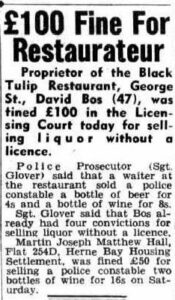
David Bos Dutch restaurateur of the Black Tulip
David Bos, a Dutch immigrant, arrived in Sydney in the 1930s. During World War II, he played a crucial role as manager of the Netherlands Canteen. This canteen became a vital social hub for Dutch military personnel after the Japanese occupation of the Dutch East Indies in 1942. After the
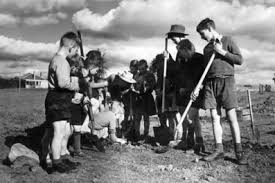
From Tyranny to Freedom:Dutch children from the Netherlands East Indies to Fairbridge Farm School WA, 1945-1946
This book is reproduced here with permission. Pictures of Fairbridge Farm School
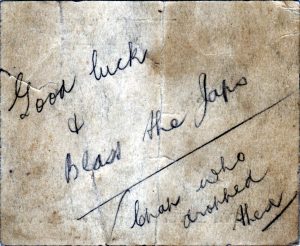
The diamond mystery (WWII)
Republished with permission. Chapter five from the book: A Touch of Dutch. For the full pdf click here. See also: Dutch-Russian Ace Pilot Iwan Smirnoff (WWII) The Lost Dutch Diamonds on Carnot Beach, Western Australia
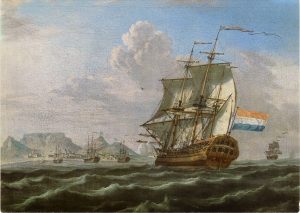
Dutch Maritime history in Australia from the Book ‘A Touch of Dutch’
Republished with permission. Section one from the book: A Touch of Dutch. For the full pdf of the book click here. Introduction chapters of the book: Touch of Dutch See also: Following the Dutch VOC Seafarers
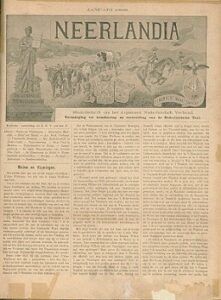
Anna Siebenhaar under government surveillance Perth ca 1900
Anna Siebenhaar, the older sister of Willem Siebenhaar, followed his brother from the Netherlands to Perth, Australia in the 1890s. In 1896 at the age of 42 she married Edgar Semmens at Coolgardie In 1908, Anna was appointed the Australasian representative of the ‘Het Algemeen Nederlandsch Verbond’ (the ANV or
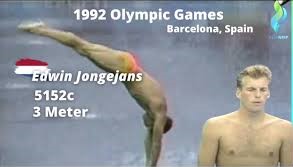
Edwin Jongejans: From Dutch Olympic Diver to World-Class Australian Coach
Edwin Jongejans, born on December 18, 1966, is a retired diver from the Netherlands who has made significant contributions to the world of diving, both as an athlete and a coach. Jongejans’ journey in diving began on the global stage with his participation in the 1988 and 1992 Olympic Games.

Timeline of recorded ship landings 1606-1814
This is a timeline of the build-up to and recorded events of Australia’s earliest maritime history. It Includes the ‘Australia On The Map (AOTM) Landings List 1606 – 1814’ from Willem Janszoon* to Louis de Freycinet and Matthew Flinders. It is a database of concise information about landings on and
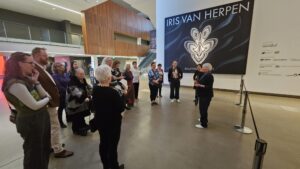
Pictures from the DACC tour of the Iris van Herpen Exhibition
The DACC was able to secure an exclusive tour through the Iris van Herpen exhibition. The event was a sold out success with the limited available tickets within days. The exhibition is on till October 7 and is highly recommended. The 40-year old Iris van Herpen is a Dutch fashion
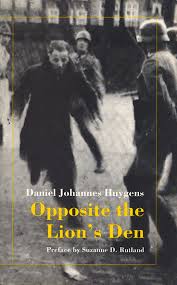
Daniel Johannes Huygens – book: “Opposite the Lion’s Den”
Daniel Johannes Huygens, born in Utrecht, Holland, in 1908, is recognized as an unsung hero of World War II for his courageous efforts in hiding Jewish families from the Nazis. During the German occupation of the Netherlands, Huygens and his wife, Lydia, transformed the upper story of their house into
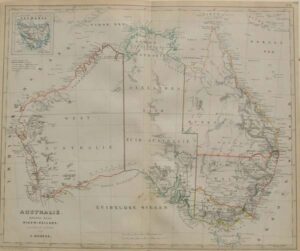
The Dutch Toponymic Legacy in Australia
A country’s toponyms has many hidden complexities. For example, some name-forms can deceive theunwary in terms of their origins and meanings. Australia’s toponymy is a good case in point.Many of Australia’s toponyms are transparent as to their etymologies, such as, Port Macquarie (NSW),Sandy Bay (TAS), whilst others are more opaque,
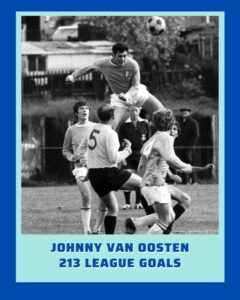
Jan Van Oosten: A Legendary Goal Scorer in Western Australian Football
Early Career and Rise to Prominence Jan (later John, Johnny) Van Oosten was born in The Hague. The family emigrated to Australia in 1954, when Jan was 7 years old. They settled in Victoria Park. His father was Dutch, his mother Polish, they had met each other in Germany where
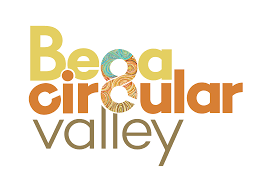
Dutch Circular Economy inspires the Bega Valley
Bega aims to become Australia’s most circular economy by 2030, inspired by pioneering Dutch practices. The concept of circularity, which involves keeping materials in use at their highest value, designing out waste, and regenerating natural systems, has taken root in Bega, following the Dutch model. Circularity is described as a
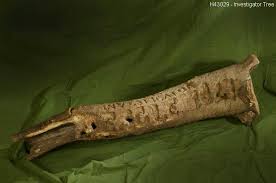
Dutch links with Sweers Island – Gulf of Carpentaria
Sweers Island is an island in the South Wellesley Islands in the Gulf of Carpentaria, Queensland. The island was given its European name by explorer Matthew Flinders on 16 November 1802 after Salomon Sweers, a council member of the East India Company at Batavia who was one of those who
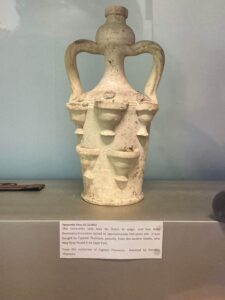
Dutch? 17c vase – Cooktown Museum
While the vase looks more Middle Eastern or Asian it might come from a Dutch ship. It forms part of the Captain Thomson collection at the Cooktown Museum. As indicated in the label below the picture it may have found by Frank Jardine, an early landowner, settler and police commissioner
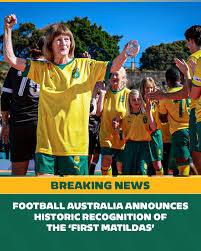
Trixie van Lieshout (Tagg): First Female Coach of the Matildas
Early Life and Introduction to Football Trixie Tagg (née van Lieshout) was born on December 13, 1948, in Amsterdam. Growing up in Amsterdam-West, Trixie was introduced to football at a young age, playing street football with friends—mostly boys—in the late 1950s. She fondly remembers listening to football matches on the
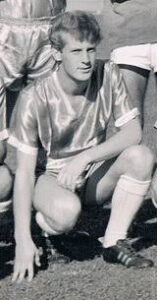
Ted de Lyster from football to looking at young adults with intellectual disabilities.
Ted de Lyster, born on June 17, 1947 in The Hague, is an Australian former association football player whose career, though brief at the international level, holds a special place in the history of Australian football. De Lyster’s journey from his early days in the Netherlands to representing Australia on
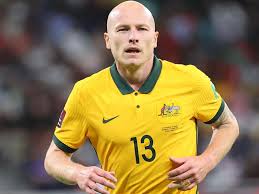
Aaron Mooy from Sydney to Football Stardom and Retirement
Dutch heritage Aaron Frank Mooy, originally named Aaron Kuhlman, was born on 15 September 1990 in Sydney, Australia. His surname was changed by his Dutch mother after her divorce. Mooy had minimal contact with his father, only meeting him briefly at age 14 to sign forms for a Dutch passport.

Book: Shaping Kingston- The story of God’s children in Kingston
From their initial close connection with St Johns Presbyterians, a committed group of immigrant Dutch Christians moved on to build a church true to the Reformed tradition at Kingston. With original sources and interviews supplementing his research, Kees Wierenga chronicles their 60+ year story, a story based on faith and

Thank you DACC website users – website statistics
We are excited to share with you our latest website statistics, which serve as a resounding vote of confidence in the digital strategy we embarked upon four years ago. This snapshot, taken on July 7th, offers a comprehensive overview of our website’s performance over the past 28 days. Your continued
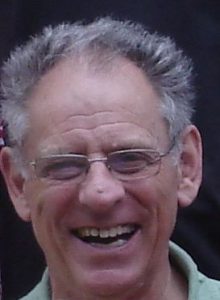
Associate Professor Klaas Woldring – Historic Maps and Political Publications. New Book: A Vision for Australia – October 2025
This article is about Associate Professor Klaas Woldring, a retired academic and longtime member and board member of the DACC. The article contains a short biography of Klaas, and outlines some of his academic work and his interests in retirement. Biography Klaas Woldring was born on 2nd July 1934 in
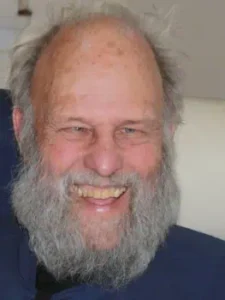
The colourful life of Jan de Voogd
Johannes Jan Nicolaas de Voogd, known as Jan, was born in January 1932 in Japan to Dutch parents, Nicolaas Arie Johannes (Niek) de Voogd (1899-1977) and Amarintia Clasina de Vries (1903-1998). Jan’s parents married in 1930 in Kattendijke in Zeeland, the Netherlands. At the time his father Niek was an
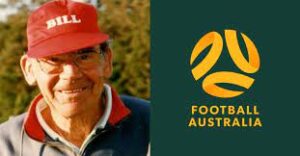
Bill Vrolyks OAM: A Legacy of Football and Community Service
William (Bill) Vrolyks was born in the Netherlands in 1925. In 1945 at the age of twenty, he was sent to Australia as part of the Royal Dutch Air Force for training to fight the Japanese during the Second World War. At the time, there was a major union boycott
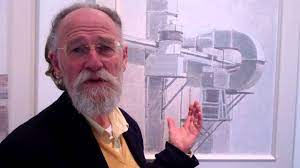
Hendrik Kolenberg Art Curator – Art Gallery of NSW
Early Life and Education Hendrik (Cornelis Gijsbertus) Kolenberg was born in Rotterdam, the Netherlands, on July 31, 1946, to Gijsbertus Anthonius Kolenberg and Wilhelmina Maria Kolenberg (née Schellaars). In October 1952, the Kolenberg family emigrated to Australia, where Hendrik began his education. He attended Black Forest Primary, Forbes Primary, and

Zing! Sing in Dutch: Eight Years of Growth and Development in Review
From its inception in August 2016, Zing! Sing in Dutch promised to be a choir with a difference. Following a series of two vibrant workshops in June that year featuring nursery rhymes, cabaret ballads, pop songs and waltzes (all in Dutch), a core group formed under the leadership of founder
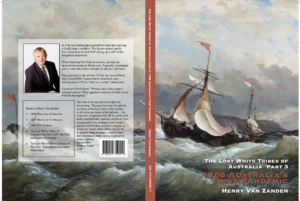
1766 Australia’s First Pandemic
After publishing ‘The Lost White Tribes of Australia‘ Part Two, the author Henry van Zanden realised that the Victorian chapters deserved a more thorough investigation and its own book dedicated entirely to the smallpox outbreak in Victoria and NSW. In Victoria, he explored the South-western districts especially Lake Condah and
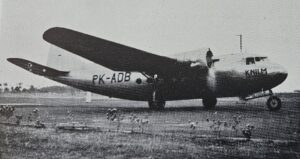
Three WWII emergency landings of Dutch planes in the NT in one day
On February 28, 1942, Japanese troops rapidly advanced through northern Java, quickly occupying airfields and towns. Within hours, they were only 50km from Andir Airport (Bandung) in West Java, where five civilian Royal Netherlands Indies Airways (KNILM) planes were based. Only the next day did the Dutch Government in Exile
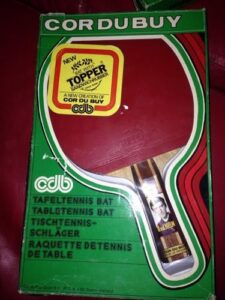
Cornelis du Buy – table tennis champion
Cornelis du Buy was born on January 8, 1921, in Amsterdam, the son of Cornelis du Buy and Maria Catharina Ramakers. During his teenage years, in the interwar period, Cornelis learned table tennis at home from his father, playing on the dining table. Cornelis’ mother, originally from Limburg, acted as
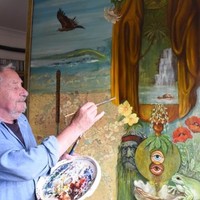
Nico Martin van Dalen – Artist
Nico was born on 8 December 1932 at Nijmegen, Netherlands, and migrated to Australia in 1955. On arrival he stayed in the Bonegilla Migrant centre, in 1997 he produced 15 cartoon styled drawings of live as an early migrant in Australia. He worked as a designer in various positions until
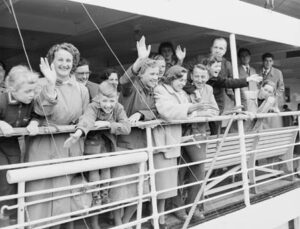
Dutch Women in Australia
In this paper Dr. Nonja Peters explores the manner in which Dutch women, who left the Netherlands at various times during the postwar period, negotiated and carved out an ‘identity’ and satisfied their need for a sense of belonging in Australia. The interpretation derives its conclusions from oral history interview
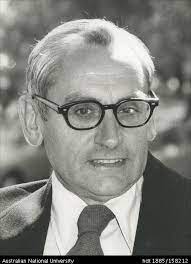
Pastor Hans Mol’s Life, Career, and Contributions
Biography Johannis Jacob “Hans” Mol, (14 February 1922 – 26 November 2017) a notable sociologist of religion, was born in Rozenburg. His early academic pursuits at the University of Amsterdam were disrupted by World War II when he refused to pledge allegiance to the Nazi party. Consequently, he was forced
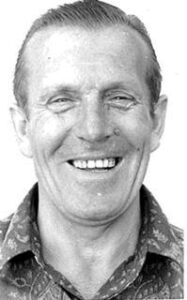
Peter van Ryn – a ‘Sophie’s choice’ and being the physio for the Socceroos
Information provided by Peter’s son Laurie Early Life and Athletic Career Petrus “Peter” or “Piet” van Rijn was born in The Hague (Den Haag), Netherlands, on 18May, 1917 (and passed away on 26th June, 2002). His parents were Piet van Rijn and Antonius Hendrieka Knijf. His mother was born in
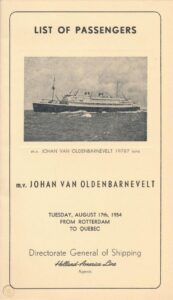
Where to find Shipping Lists – Passenger arrival records?
The National Australian Archives (NAA) holds a large number of passenger arrival records. These records indicate how people moved into and out of Australia. You can search these arrival records in the NAA collection. This includes detailed passenger records for arrivals and departures at all Australian ports from 1924. This
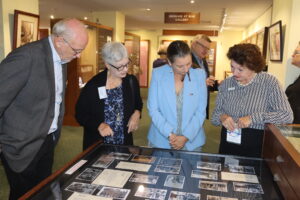
Camp Columbia Exhibition at the MacArthur Museum, Brisbane
In April, representatives of the Camp Columbia Heritage Association (CCHA) met with John Wright, the director of the MacArthur Museum in Brisbane (MM-B), to discuss the possibility of hosting a pop-up exhibition on Camp Columbia. Since Wacol, the actual location of Camp Columbia, is out of town, we explored the idea of
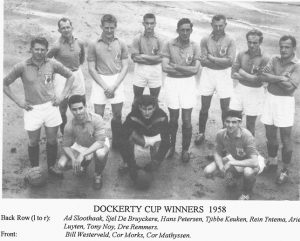
Football player and recruiter Tony Noy
Tony Noy, emigrated to Australia from Gennep as an eighteen year old with his family and was soon playing in the Melbourne competition, first with Slavia, and then with Wilhelmina, enticed there by Van Hoboken with the promise of a job for his father and cheap housing for his family.
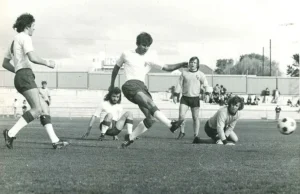
Top scorer in Adelaide: footballer Willem Slager
Willem (Willy. Wil) Slager born in 1941 in Ede near Arnhem. His family was evacuate to Friesland in 1944 when the Allied launched operation ‘Market Garden’ with bitterly fighting around Arnhem. He arrived in Australia in 1957 and settled in the suburb of Elizabeth in Adelaide. Het got a job
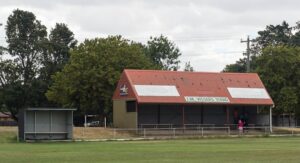
The Dutch heritage of Ballarat City F.C.
According to Adam Muyt in his book Clogball, Ballarat fielded a range of football clubs with typical Dutch football names: Juliana, Wilhelmina, Hollandia, and Fortuna. By the end of the 1960s, these clubs had folded, merged, or were no longer majority Dutch. In 1967, what was left merged into the

Socceroo Adrian Leijer 2nd generation Dutch
Born in 1968, he largely grew up in, the New South Wales town of Dubbo to a family of Dutch and English heritage. He played from Under 10 – Under 14 with SASS Strikers Junior Soccer Club in the Dubbo & District Soccer Association. Whilst with SASS, he represented Western
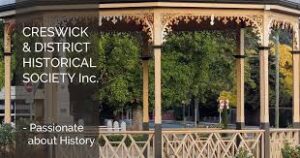
Creswick Victoria – Little Holland
Creswick welcomes the Dutch The Creswick and District Historical Society, Inc. has published a new history of Dutch immigration to Creswick, contributed by the Dutch community. This essay, “Creswick Welcomes the Dutch,” authored by Jack van Beveren, Gerarda van Hamond, Jo van Oostveen, Rita Flapper, and Marilyn Lennox, chronicles the
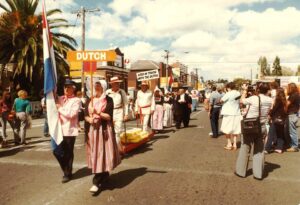
The Dutch in Geelong
Dutch Clubs In 2024, the Dutch population in Geelong comprises of 1400 people. In the early 1950’s they established the Geelong Dutch Club, which has since grown to 10 active Dutch clubs servicing the Geelong Region, they are: • Swallows Karnival Club• The Rocket Club• Micare/ Dutchcare• 50 plus Club•
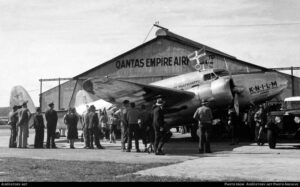
WWII Dutch Lockheed crash landed near Katherine
The following is a translation of a story recorded in the book: “De KNILM vloog door..“ (The Royal Netherlands Indies Airways continued to fly) On Thursday, March 26, 1942, a Lockheed Super Electra SE-14 PK-AFM operated by KNILM (Royal Netherlands Indies Airways) failed to arrive at its destination of Batchelor
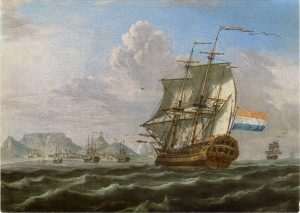
First Dutch contacts in Australia – North west coast of Australia 1643 to 1688
[North West Cape to Cape Londonderry] Tasman’s Voyage of 1643 Documentary Source other than original Journal Witsen, N 1705Noord en Ooste Tartarye,Amsterdam: Francois Halma, pp.175-6. p.175In latitude 190 35’ and longitude 1340 natives who appeared in great numbers threw stones at the people the Dutch sent ashore in 1643; these
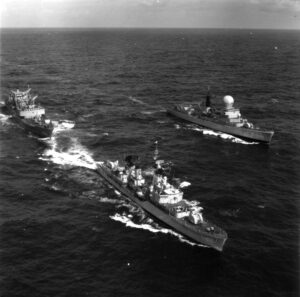
Three Dutch Naval Visits to Australia in the 1970s
Following the extensive naval presence during WWII, the more peaceful years of the 1960s, saw a new approach emerged where Naval Visits were amalgamated with a national ‘Holland Promotion’. This represented a distinct new form of ‘Flying the Flag’, showcasing the national flag by sending one or more warships abroad.
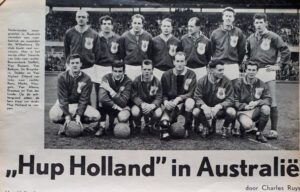
‘Holland’ wins 1956 World Cup Down Under
The Laidlaw World Cup Down Under, nestled amidst the post-war resurgence of football fervor in Victoria, stands as a testament to the multicultural tapestry woven into the sport’s fabric. Its origins traced back to 1949 with a diverse array of teams taking to the field, including representatives from Great Britain,
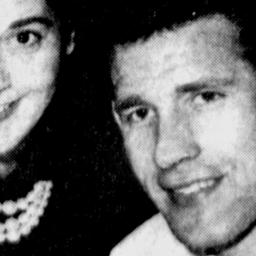
Dick van Alphen: A Tribute to an Australian Soccer Icon
Born on September 18, 1934, in the Netherlands, Van Alphen left an indelible mark on Australian soccer, leaving behind a legacy that continues to inspire generations. Dick passed away on May 21, 2009, at his home in Hervey Bay, Queensland. Van Alphen’s journey in soccer began in his native Amsterdam,
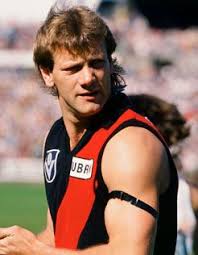
“The Flying Dutchman”: The Legendary Career of Paul Vander Haar
Paul Vander Haar was born in the Netherlands on 7 March 1958 and was one of five children born to Dutch migrants, Bernardus Josef (Ben) and Judith. His surname was originally spelled: van der Haar. On the field he is often referred to as ‘Vander’. Paul Vander Haar’s legacy in
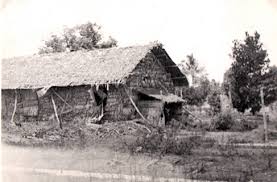
Japanese concentration camp Palembang and the Paradise Road Women Choir
In the occupied Netherlands East Indies, Japan sought to eradicate all Western influence from public life. In the outlying regions, non-Asian individuals were promptly interned following the occupation. Consequently, women from the Netherlands, Australia, England, and the Dutch East Indies found themselves compelled to coexist in internment camps. In the
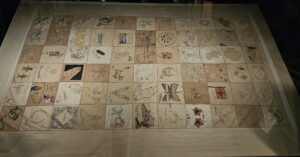
The Changi Quilts – WWII
Changi Prison, originally designed to hold 600 inmates, was overwhelmed with around 2,400 internees, including civilians associated with the British and Dutch colonial administrations. Among them were women and children, housed alongside male prisoners of war. Despite being overcrowded, Changi was relatively modern, boasting amenities like flushing toilets, though hygiene
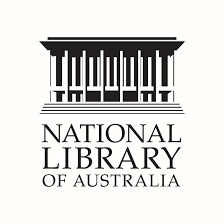
Interviews and information of Dutch WWII veterans and related information
Dutch war veterans in Australia oral history project [sound recording] The aim of this project “is to collect interviews that will recapture the life experiences of a representative group of Dutch veterans in Australia. Most of these veterans served with the Royal Netherlands Army in the Netherlands East-Indies (NEI) during
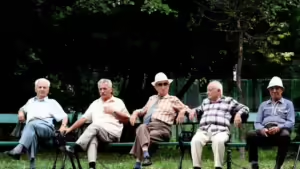
Projected Dutch Aged Stats NSW 1981- 2001
The following text is from a booklet published by the Federation of Netherlands Societies Ltd. in February 1985. The research for this booklet was done by Mijntje Hage. The Dutch NSW Nursing Committee is actively carrying out a feasibility study regarding the establishment of a nursing home or, alternatively, the provision of
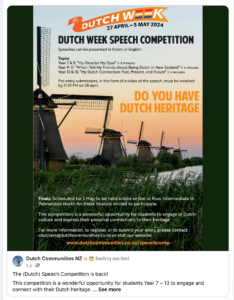
Organising Dutch Speech Competitions
We received an email with this Facebook post from the Dutch Community in New Zealand, with the suggestion that this perhaps is also an idea for Dutch organisations in Australia. Dutch Clubs and Dutch Language Schools might be interested in organising something along these lines.
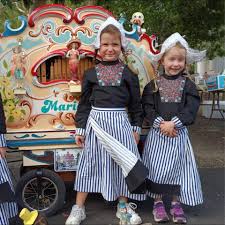
The New South Wales-Holland Festival Committee (history)
The following text is from a booklet published by the Federation of Netherlands Societies Ltd. in February 1985. The research for this booklet was done by Mijntje Hage. In 1980, the vision for a grand Dutch celebration emerged, realizing that such an endeavor required the collaboration of many individuals beyond the capabilities
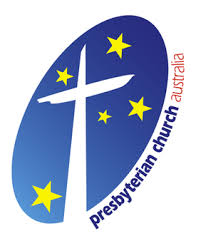
Protestant Dutch Benevolent Society
The following text is from a booklet published by the Federation of Netherlands Societies Ltd. in February 1985. The research for this booklet was done by Mijntje Hage. The P.D.B.S. started its work in Australia in 1948. It began as a social committee of the Dutch congregation of the Presbyterian Church and
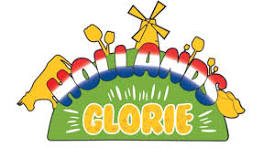
Hollands Glorie Dutch Club in the Sydney region
The following text is from a booklet published by the Federation of Netherlands Societies Ltd. in February 1985. The research for this booklet was done by Mijntje Hage. We don’t have any further information on this club. The youngest club in the metropolitan area of Sydney is “Hollands Glorie”. Only formed in 1983,

Blue Mountains Dutch Club
The following text is from a booklet published by the Federation of Netherlands Societies Ltd. in February 1985. The research for this booklet was done by Mijntje Hage. It is the only info we have on this organisation. The activities of this club are also very varied, but on the whole, everything
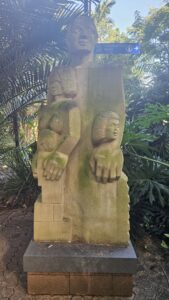
Dutch-Australian sculptor Antone Bruinsma
Antone Bruinsma, an Australian-based sculptor, boasts over 35 years of professional experience in his craft. Having relocated to Australia from Amsterdam, Holland, with his family at the age of 12, his artistic journey began by spending quality time with his father, a Dutch artist and painter, in his art studio.

DACC – Primary Research Projects
The following breakdown provides a comprehensive overview of completed and ongoing research projects in the field of DACC. Allies in a Bind: Australia and the Netherlands East Indies in the Second World War Australia Explained: A Site for Newcomers and Old Hands Children Born on Ships En Route to Australia
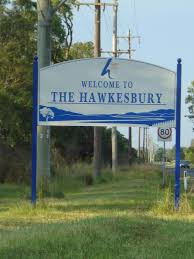
Hawkesbury and district Dutch Australian Society
The following text is from a booklet published by the Federation of Netherlands Societies Ltd. in February 1985. The research for this booklet was done by Mijntje Hage. It is the only info we have on this organisation. When land became scarcer and dearer and people had to move to the outer
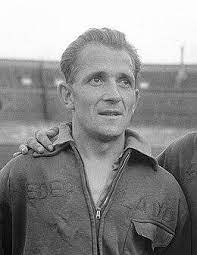
Michaël “Sjel” de Bruyckere: A Football Journey from the Netherlands to Australia
Michaël “Sjel” (Mike) de Bruyckere, born in Kaatsheuvel, the Netherlands, on 6 February 1928, was a remarkable Dutch and Australian footballer whose legacy extended beyond the pitch. Early Years and Dutch Success. De Bruyckere commenced his football journey as a junior player in his local club before catching the eye
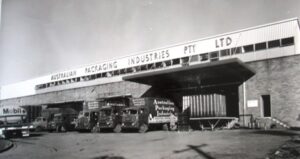
Dutch company Van Leer produced packaging materials in Australia’s capital cities
By: Pierre van der Eng Van Leer was a Dutch company producing metal and later also plastic drums and pails for packaging and storage. Founded by Bernard van Leer, it started operations in Amsterdam in 1919 as Van Leer’s Vereenigde Fabrieken NV. Before World War II, it internationalised operations by
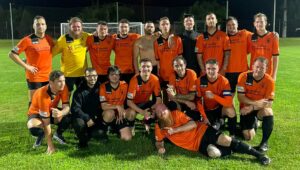
Fortuna 60 SC – The Orangemen – Morwell Victoria
Morwell in the Latrobe Valley saw a large influx of Dutch emigrants in the 1950s. In 1954 12% of the population was Dutch this increased to 15% by 1961. Dutch Clubs followed soon as it is no wonder that many of the Dutchies became involved in football. Fortuna ’60 Soccer
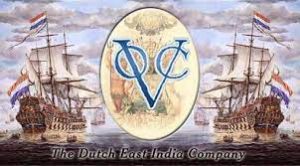
First Dutch contacts in Australia – North coast of Australia 1636 to 1705
[Cape Londonderry to Norman River] Gulf of Carpentaria and Arnhem Land The coast of Arnhem Land was mapped by the Dutch in the “Arnhem” skippered at that stage by Willem van Coolsteerdt in 1623 but there are no accounts of what transpired during that section of their voyage. Voyage of
Philips – historic ephemera
Philips factory in Newcastle produced almost all Australia’s electric lamps for 70 years Frans Leddy reorganised Philips Australasia Turning Adversity into Opportunity: Philips in Australia, 1945-1980 European Integration and Australian Manufacturing Industry History of the manufacturer Philips Australia
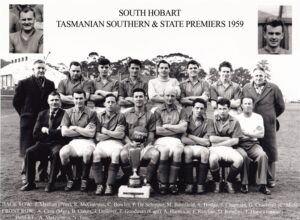
Remembering Tasmanian Football Legend Adrian Harmsen
Adrian (Aad) Harmsen was born in Leiden in 1925. From a young school age he played football and became a key player in the local football club. During WWII he became involved resistance work and in 1945 he was employed as a translator at the Royal Dutch Aiforce. Worried about
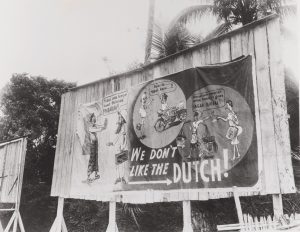
The end of WWII. Liberation of Borneo by Australian troops.
The 15th day of August 1945 will go down in history as the day of the end of the Second World War. On that day, Japan capitulated and the President of the United States announced that the conflict in the Pacific was over. But there was no question of a
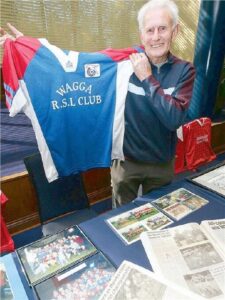
Wens de Jong – football lengend of Wagga Wagga
Wens de Jong was born in 1938 in Oude Wetering (Zuid Holland). At the age of 18, he embarked on a journey to Melbourne in 1956 alongside his parents John and Regina, along with their six siblings. His father, who worked as a baker in their village, had a passion
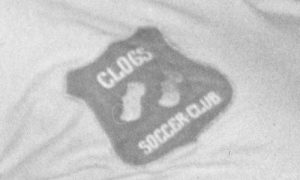
The Clogs ( Klompen) Dutch football Club in Wagga Wagga
In the 1950s, a wave of Dutch migration reached Wagga Wagga, leaving its mark on the Riverina town’s sporting landscape with the formation of the Clogs (Klompen) football club. This article draws upon rich archival records to illuminate the Clogs’ story, revealing the unique spirit and challenges they faced. Founded
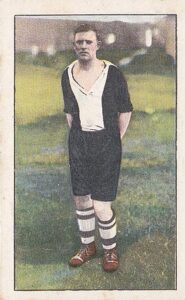
Cees van der Zalm (1901-1957) Dutch National Footballer and Australian Coach
Cees van der Zalm was a Dutch footballer born on September 30, 1901, in Loosduinen, The Hague. He had a notable career with the Netherlands National Football team (Oranje), playing three matches between 1927 and 1929.He played for VUC in The Hague and captained the club until his retirement of
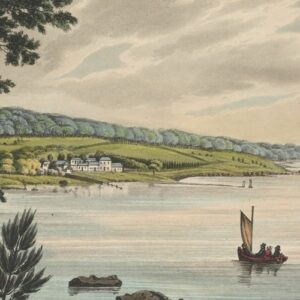
Dutch spy woman involved in the decision to start the NSW penal settlement in 1788?
Margaretha Wolters, also known as Marguerite Wolters, was an intriguing figure in 18th-century espionage. Her clandestine activities appear to have played a pivotal role in shaping British decisions during that era. Amazingly she appeared to have run a European espionage network, first with her husband but after his death on her

Conference Papers and Keynote addresses by researchers
The following overview has been compiled by Dr. Nonja Peters Papers on Dutch culture and heritage by Nonja Peters 2016: Opening and closing/summing up speeches at the NIAS LORENZ International Workshop on Digital Humanities – Conceptualising a model for the Digital Preservation of Immigrants Cultural heritage, 22 and 26 August
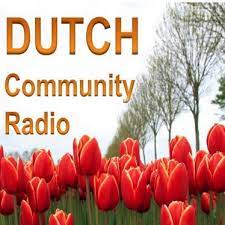
Dutch Community Radio Western Australia
The history of Dutch Community Radio in Western Australia is rich with dedication and passion from its volunteers. It began nearly 50 years ago with reel-to-reel tapes and has evolved significantly since then. Initially established through the Multicultural Radio and Television Association (MRTA), the Dutch program aired on Radio 6NR
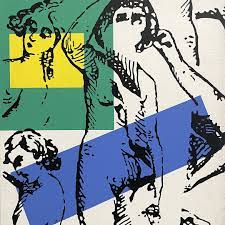
A Visual Exploration of Dutch and Eurasian Experiences in Indonesia Amidst Turbulent Times
Abstract of a review titled: Review: Landscape of the soul by Ron Witton An exhibition titled “Landscape of the Soul,” is shedding light on the often-overlooked experiences of European Dutch and Eurasian individuals in Indonesia during pivotal historical epochs. The narrative unfolds against the backdrop of Japanese Occupation, the Revolution,
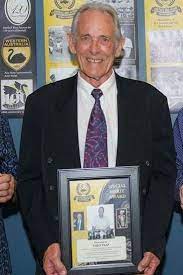
Theo Paap: A Dutch-Australian Football Legend
Theo Paap’s journey from Amsterdam to Perth in 1956 marked the beginning of a remarkable career in Australian football. Born in Amsterdam in 1943, Paap quickly immersed himself in the local Dutch football scene, joining the Windmills Football Club (now Morley Windmills). He immediately made an impact, rising through the
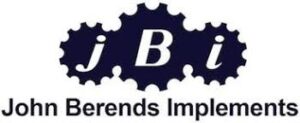
John Berends: A Life of Innovation and Service in Australia’s Agricultural Landscape
John (Jan) Berends was born in 1937, in a village near Zwolle, where he attended high School (HBS – B). After successfully completing his secondary schooling, he was conscripted into National Service, although not quite voluntary, serving for 21 months. He obtained the rank of sergeant and was discharged in
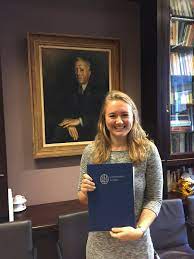
We were the ones that integrated’:Dutch post-war migrant children in Australia
A research on the change in transnational ties of Dutch post-war migrant children in Australia On November 1, 2018 Anne Brehler defended her Master thesis ‘We were the ones that integrated’: Dutch post-war migrant children in Australia. She got cum laude Congratulations. This research focuses on children of post-war Dutch
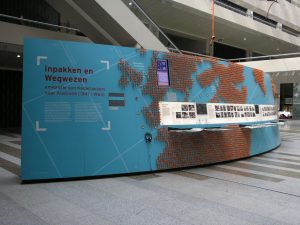
The preservation and digitalisation of Dutch- Australian Migrant Registration Cards
The preservation and digitalisation of Dutch- Australian Migrant Registration Cards Over the decades, the Netherlands Embassy and Consulates in Australia maintained a card system documenting migrants from the Netherlands. The system contains over 55,000 cards, representing 80-90% of Dutch people who emigrated to Australia between 1946-1991. In 1998, The Consul-General
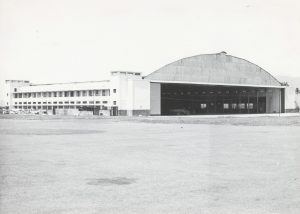
‘Albury rescue’ repeated during WWII in the Netherlands East Indies
The Dutch and their WWII Allies were totally unprepared for the rapid advances of the Japanese army. Nobody had expected that Singapore would fall within 10 days, and in no time, they invaded the Netherlands East Indies (NEI). Despite the rapid progress, the Dutch Government-in-Exile in London did not allow
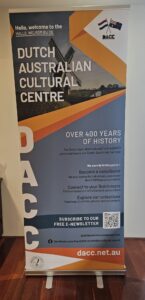
Collaboration with Dutch organisations in Australia
A revitalised Dutch Australian Cultural Centre (DACC) operates digitally Australia-wide and even internationally. The DACC was established in 1983 to oversee the preservation of Dutch heritage in Australia, including maritime history, migration, businesses, and the Dutch presence in Australia during World War II. For most of its existence, the DACC
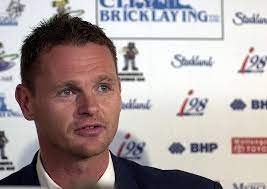
Socceroo Mike Petersen: A Legacy of Dutch Heritage and Football Mastery
Mike Petersen, born of a Dutch father and an Australian mother on May 6, 1965, in Melbourne, emerged as a stalwart midfielder whose illustrious career spanned continents and left an indelible mark on Australian football. Rooted in his Dutch heritage, Petersen’s journey from the grassroots of Port Melbourne juniors to
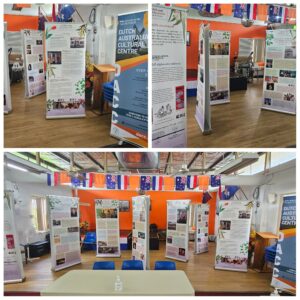
Exhibition and presentation – Brisbane – The heritage shared between the Netherlands and Australia (1606 – 2016)
Post-event reflections (added 6 March 2024) The lecture and exhibition by Dr. Nonja Peters was well-attended by members of the DACC and the Dutch Club NAQ, as well as by interested members of the public. Attendance was approximately 35-40 people, and Dr. Peters received keen questions from the audience. After
The DACC Research Team
We proudly present our DACC Research Team. The team is involved in: The DACC Research Team includes.:
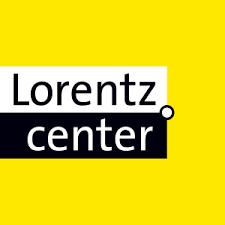
Migrant (R)e-collections- Proposal for a workshop (historic)
All over the world migrants have left multiple traces, deep traces that are indispensable forthe fostering of heritage communities and for research in the humanities and social sciences.Yet the growing societal demand for cultural services and the increasingly insufficientresources available to manage migrants’ cultural heritage is creating a gap —
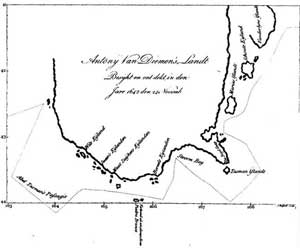
Abel Tasman Landing Site – Tasmania 1642
The Tasman expedition left Batavia (Netherlands East Indies, now Jakarta, Indonesia) on 14th August 1642 with two vessels, the Heemskerk with a 60-man crew and the Zeehaan with 50 men on board. They first called at Mauritius, where they stayed for a month-long repair to both ships. Intending to sail
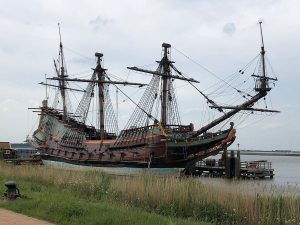
First Dutch contacts in Australia – Tasmania 1642 to 1772
Blackman Bay and East Coast of Tasmania 1642 Tasman’s Voyage of 1642 Journal – Abel Tasman Tasman, A J 1898Abel Janszoon Tasman’s Journal, J E Heeres (comp. and trans.),Amsterdam: Frederick Muller. p.15 [Report of Pilot-Major and Second Mate, 2 December 1642]They [shore party] had heard certain human sounds, and also sounds nearly
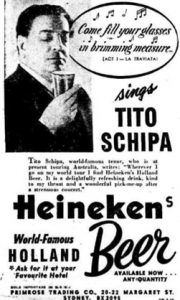
Heineken beer has been on tap in Australia since 1884
Pierre van der Eng It may appear that Dutch multinational beer brewer Heineken has long tried to carry the proverbial coal to Newcastle, because its beer has been on sale in Australia since 1884. In October that year, an advertisement of trading company Boult Bros in Adelaide announced the sale
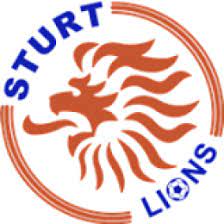
Orange Soccer Club lives on as Sturt Lions in Adelaide
The name of the current Sturt Lions Soccer Club shows the Dutch heritage of the club, the club still plays in orange and has the Dutch Lion in its logo. The Orange Soccer Club was formed in 1953 by Dutch migrants. In 1963 the club amalgamated with the Sturt Soccer
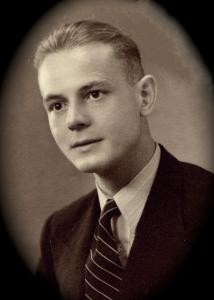
Dirk Drok and the discovery of the Batavia
Dirk Drok (Dalfsen, Netherlands 1915–1988), Perth) and his wife Kitty Isabella Theodora Uitenhage de Mist-Barkey (Java 1921–2001 Perth) lived in Java, Netherlands East Indies NEI (now Indonesia). After the Japanese had occupied the NEI, Dirk and kitty both – separately – ended up in Japanese Camps. There is an extensive
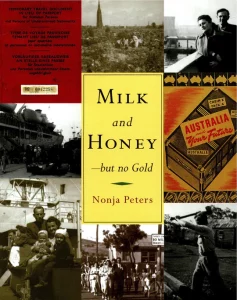
Milk and Honey – but no Gold
By Dr. Nonja Peters Milk and Honey – but no Gold is the story of those who left behind their country of birth, and everyone and everything they knew, to become part of Australia’s mass migration scheme in the years following World War II. Some were homeless and displaced refugees from
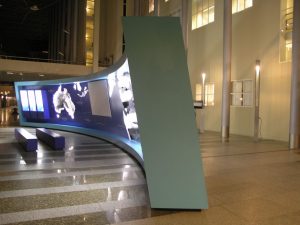
‘Inpakken en wegwezen – emigratie van Nederlanders naar Australië’
Hieronder is het Initiatiefrapport (gedateerd: 17 december 2004) van de tentoonstelling met de werktitel: ‘Inpakken en wegwezen – emigratie van Nederlanders naar Australië’ . Deze exposities was georganiseerd in het kader van het evenement ‘1606 – 2006; 400 jaar relaties Nederland – Australië’. In 1606 voer het VOC-schip Duyfken vanuit
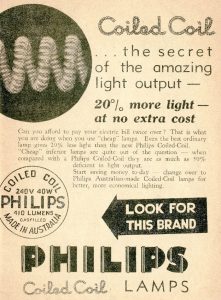
Philips factory in Newcastle produced almost all Australia’s electric lamps for 70 years
Pierre van der Eng Dutch firm NV Philips Gloeilampenfabrieken exported its incandescent lamps to agents in Australia since 1912. Its lamp sales increased quickly during World War I, when Australian imports form the UK dwindled. In 1926 Philips established its own subsidiary company in Sydney: Philips Lamps (Australasia) Ltd. It
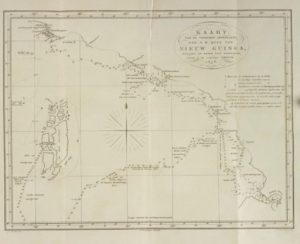
Early nineteenth century English/Dutch rivalry in Eastern Indonesia and Australia
This article is about the Dutch seizure of part of New Guinea in 1828. The English activities in Northern Australia played an important role in this. The author of the article is Jeroen Overweel. He is engaged in cultural heritage participation and is an independent researcher on Indonesian, Melanesian and
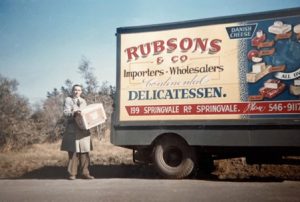
Rubens Family and Rubsons – Dutch Food Wholesalers in Melbourne
Ruben (Ruud) Rubens Ruben (Ruud) Rubens was born in Amsterdam on 3 September 1917 and died in Melbourne on 7 November 1993. After completing his high school education (MULO), he became a bicycle dealer and sales representative. He was an active sportsman—an accomplished sailor, swimmer, and soccer player—and even played
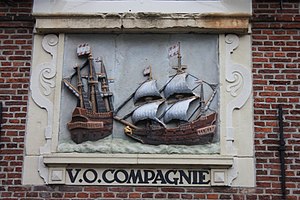
First Dutch contacts in Australia – Cape York and Torres Strait 1606 to 1643
RELATING TO: The Voyage of the Duyfken – Willem Janszoon (Master) and Jan Lodewijkszoon van Rosingeyn (Supercargo) , West Cape York Peninsula, Queensland, 1606. Documentary Sources other than original Journals Recording Navigator: J Carstenszoon 1623, taken from:“Summary abstract of the Journal of the … voyage of discovery … with the yachts Pera and
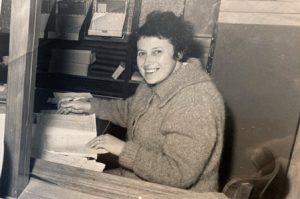
Milly Rubens Schelvis, surviving WWII concentration camps in Europe
Milly Schelvis was born in Amsterdam 11th September 1919. She had a normal, loving childhood although that is set in the background of Holland in the 1920’s and 30’s. They lived in the poor parts of the Jewish sector of Amsterdam and that meant poor housing, hunger and dreadful filth
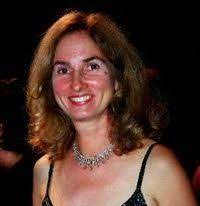
Annita van Iersel, former spouse of PM Paul Keating
Anna Johanna Maria van Iersel, known as Annita, is an accomplished Dutch-born Australian artist and the former spouse of Paul Keating, a former Prime Minister of Australia. She held the name Annita Keating from 1975 to 1998. Annita van Iersel was born on 5 October 1948 in Oisterwijk, a town
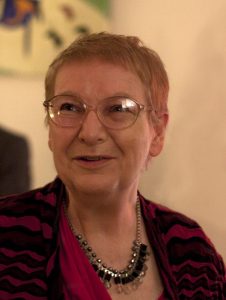
Marianne Pietersen interviews herself and others in Brisbane
I’ve been doing interviews of Dutch migrants for the Dutch Courier newspaper since a couple of years, and prior to that I wrote many articles about events in my retirement village, or at the Dutch Club in Qld, or Dutch activities in the ACT. But now I’ve been asked to
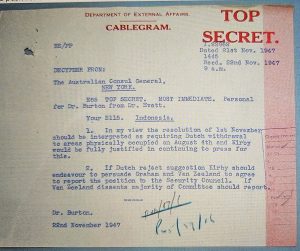
Links to declassified WWII Australian Documents re the Netherlands East Indies
Researched by Ruby Todorovski, researcher at the University of Queensland. Source: National Archives of Australia. Netherlands East Indies Commission for Australia and New Zealand Netherlands East Indies Government-in-Exile in Australia (1944-1946) Netherlands Forces in Australia WWII Evacuees from Netherlands East Indies recuperating in Australia after WWII Migration and Repatriation issues
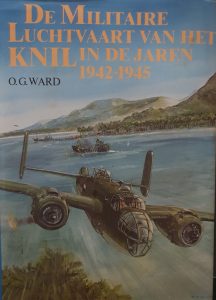
Netherlands Forces in Australia WWII
Declassified documents from the National Archives of Australia, researched by Ruby Todorovski, University of Queensland Links to other declassified WWII Australian Documents re the Netherlands East Indies Military Command After the surrender of the Dutch military in the Netherlands East Indies to the Japanese in March 1942, the Dutch military
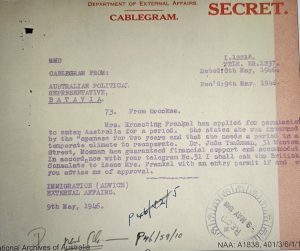
Migration and Repatriation issues after the liberation of NEI
This file, researched by Ruby Todorovski researcher at the University of Queensland includes documents regarding people who wanted to migrate to Australia after the war and issues regarding the repatriation of service people. See also: Evacuees from Netherlands East Indies recuperating in Australia after WWII Links to declassified WWII Australian
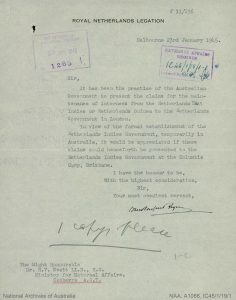
Various WWII Diplomatic Australian documents
All files below were researched by Ruby Todorovski, researcher University of Queensland Netherlands East Indies, Transfer of Government Officials to Australia – 1942 7th March 1942, Dr van Mook, van Oyen and van Plas arrived in Perth Major-General Van Oyen in charge of postwar reconstructions in NEI 26/10/43 Red Cross
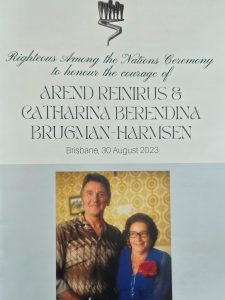
Arend and Catherina Brugman – Righteous Among the Nations
On 30 August 2023 Arend Reinirus and Catherina Berendina Brugman-Harmes were posthumous awarded the title: Righteous Among the Nations by Mr Chris Cantor the Deputy Chief of Mission of the Embassy of Israel in Australia. The medal and certificate were received by their granddaughter Mrs Anne-Marie Buttigieg. Her grandparents with
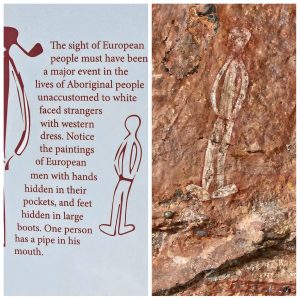
South coast of Australia to 1772 and beyond
Although part of the south coast, from Cape Leeuwin to around Fowlers Bay, was first mapped in 1627, there are no documented accounts of any visits until Vancouver entered King Georges Sound on 29 September 1791, staying until 11 October 1791. While extensive investigation were undertaken in the area, and
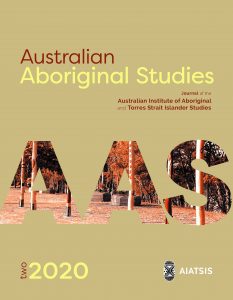
Discussion on Dutch influence on the Nhanda language.
Nhanda is an Aboriginal language of Western Australia, once spoken along the coastal strip from possibly as far south as Hill River north through to Champion Bay and the mouth of the Murchison, up to country just south of Shark Bay. There has been very little work on Nhanda until

The role of Australia in Indonesia’s independence. Declassified secret docs from the Australian Government.
The declassified original secret and top secret documents are in the pdf file at the end of this article. Change of support Australia promptly and unconditionally welcomed the Dutch after the fall of the Netherlands East Indies (NEI) in 1942. They wholeheartedly supported the establishment of the NEI-in-exile on their
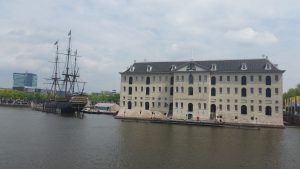
First Dutch contacts in Australia – Lower west coast – cape Leeuwin to Swan river 1658 – 1697
Elburgh 1658 Documentary Source other than original Journals “Letter of the Governor-General and Council to the Managers of the VOC December 14, 1658” in J E Heeres 1899The Part Borne by the Dutch in the Discovery of Australia,London: Luzac and Co., p.81. p.81the skipper, together with one of the steersmen,
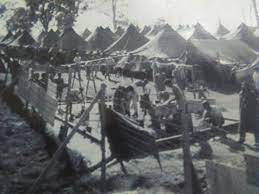
WWII Camp Victory Casino
After the Japanese invasion of Indonesia in 1942, the Dutch fled to Australia taking with them Indonesian soldiers, sailors, government officials and more. The Dutch Government made a deal with the Australian Government which gave the Dutch extra-terrestrial rights over many Indonesian refugees, declaring several former army camps as Dutch
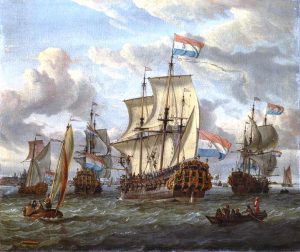
VOC vessel names: what naming patterns reveal about the name-givers’ mindsets
By: Jan Tent Studies of proper names have revealed naming patterns which may provide insights into the attitudes and values of the contemporaneous name bestowers. This essay analyses the names conferred upon thevessels of the United East India Company or Vereenigde Oostindische Compagnie (VOC), in order to ascertain whether there

Merdeka Down Under? Indonesian Civilians and Military Personnel in Australia(1942–1949)
This thesis from Dr. Judith Mirjam Rozeboom examines the lives and treatment of the Netherlands East Indies (NEI) people who resided in Australia during WWII and their return to their home country after the war. It compares the lives before, during and after the war of European Indonesians and indigenous
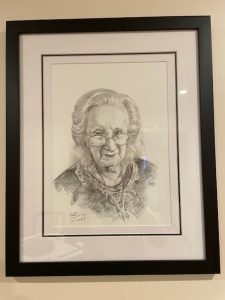
Petronella Jacoba Wensing OAM
Petronella Wensing (1924-2023) was a Dutch migrant to Australia who passed away in 2023. Below is an obituary written by her son Ed (posted with permission). A short story about Petronella was published in The Canberra Times: The Canberra Times also published a shortened version of Ed Wensing’s obituary for
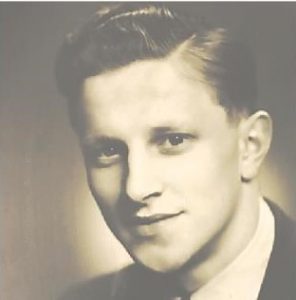
Charles Lambert Betz – The economic integration of Dutch migrants in Australia
Born: 3 June 1930 (Limburg, The Netherlands)Died: 12 January 2018 (Canberra) Charles was a demographer and public servant who served in Papua New Guinea (1967-72) and Australia thereafter.He was a proud and active member of the Australian Dutch community. Driven mostly by the desire to improve their material position Dutch
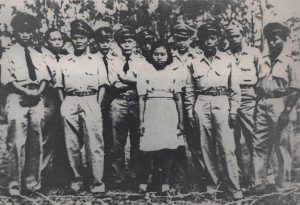
Coosje Ayal – guerrilla fighter studied nursing in Brisbane
Coosje Ayal, born in 1926 in the Moluccas, Western New Guinea, became a notable figure for her resistance efforts during World War II. Adopted by her aunt and uncle, who was a civil servant of the Dutch colonial government, she attended a Dutch school and learned the language. When the
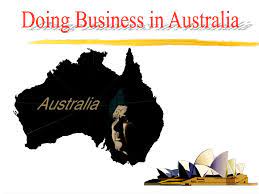
More than 150 Dutch companies established subsidiary operations in Australia
By: Pierre van der Eng Several Dutch companies have operations in Australia today. The members of the Netherlands Chamber of Commerce in Melbourne and Dutchlink in Sydney include Dutch mastheads like Rabobank, Randstad, ING, Heineken and Vopak. Australia has long been relatively open to inward investment by foreign companies. In
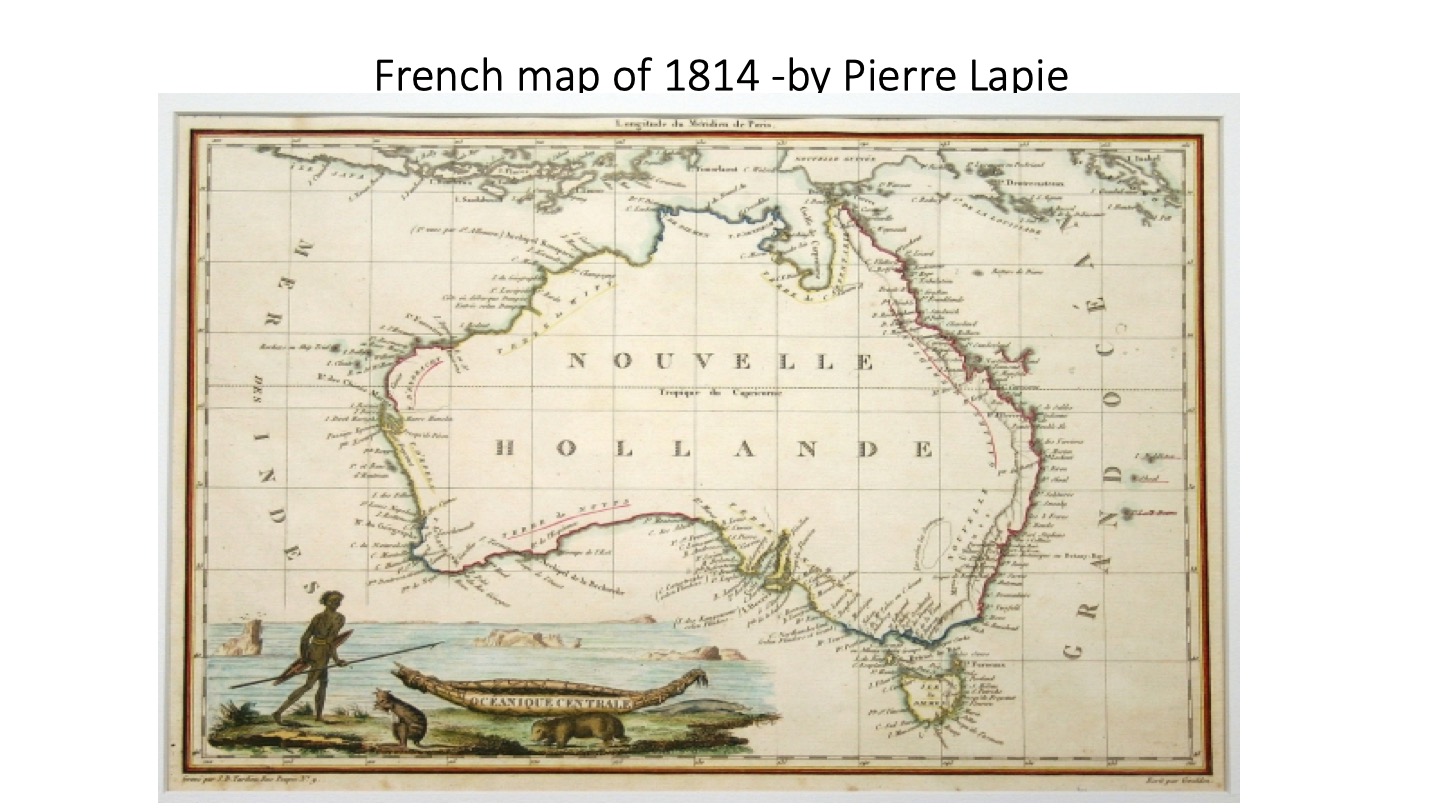
Dutch Australians at a Glance (DAAAG)
Introduction DAAAG was created to be an accessible, easy to navigate, multimedia internet service dedicated to the sustainable digital preservation of Dutch Australians’ cultural heritage – for use by scholars, researchers, bureaucrats, journalists, Dutch individuals and other digital end users worldwide. DAAAG is an initiative of the History of Migration
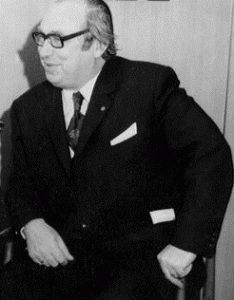
Herman Diederik Huyer Managing Director Philips Australia
Dutch businessman Herman Diederik Huyer, who settled in Australia in 1969. Huyer was born in the Netherlands in 1920, and after World War II worked for the Dutch multinational company, the Philips Group. He held posts around the world during his career. Frank Leddy reorganised Philips Australasia More than 150
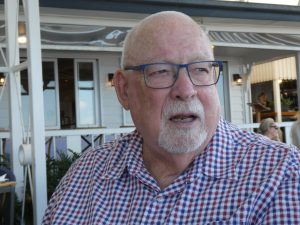
Interview: Henk Mollee – Hollandia Soccer Club – F.C. Lions
Australia is a land of immigrants. I am an immigrant, and you, dear reader, are probably too. High levels of immigration in the years before 1891 resulted in 32% of the population listed as overseas-born in Australia’s first country-wide census in 1891. These numbers decreased substantially in the first half
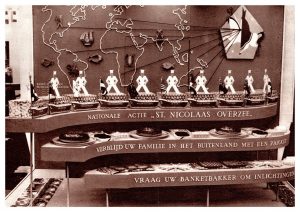
Sinterklaas Overseas Foundation
Family in Holland could have a Sinterklaas package sent to their relatives overseas. There was all kinds of stuff in there. Candy, calendar, teaspoon, gramophone record, booklets, tablecloth, you name it. In the DACC archives is a tablecloth and sugar bowl from such a package (see below). See also: Sinterklaas
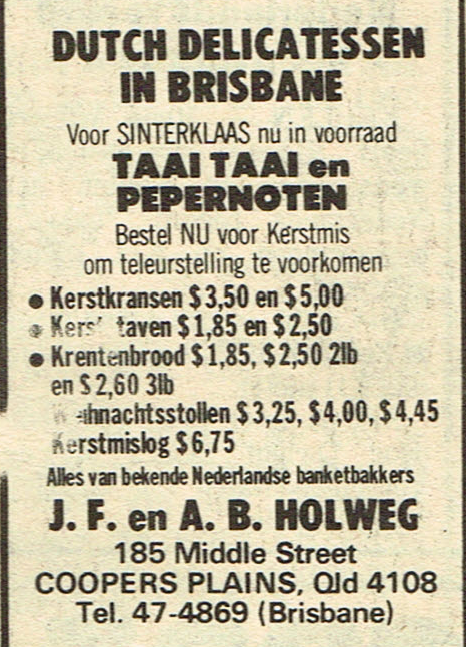
Sinterklaas Treats
Pepernoten: The Traditional Sinterklaas DelicacyIs Christmas Eve truly complete without gingerbread cookies? Sinterklaas festivities naturally include these delightful treats, making them an essential part of the celebration. Gingerbread cookies, available at Dutch shops or enjoyable to make at home, hold the top spot on our list of Sinterklaas treats. Engage
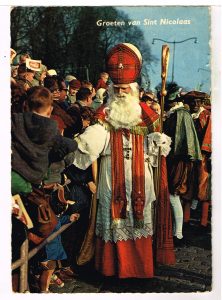
Sinterklaas celebrations at Dutch Clubs in Australia
These are photographs and Dutch Australian Weekly (DAW) newspaper clippings from the DACC archives of Sinterklaas celebrations within Australian club from the early fifties onwards. Dutch Australian Weekly newspaper clippings The DAW also used Sinterklaas to promote a subscription to the newspaper as a Sinterklaas gift Information on the Dutch
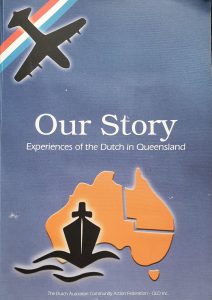
Our Story – Experiences of the Dutch in Queensland
To ensure that the stories of Dutch migrants would be preserved for future generations, the former Dutch-Australian Community Action Federation Qld Inc. (DACA) published a 208 page book ‘Our Story — Experiences of the Dutch in Queensland’ in 2001. Editors: Annelies Zeissink, DACA-President and Rob-Jan Mynarends. The book presents personal
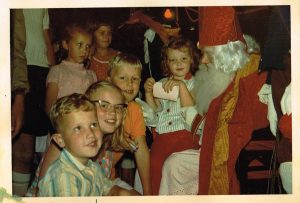
Sinterklaas in Australia
The story of Sinterklaas (Sint Nicolaas) is of course well known, there is plenty of information on the internet about this typical Dutch tradition. Although it has changed over the years due to changes in society e.g. the arrival of radio, television, internet as well as an increasingly more multicultural
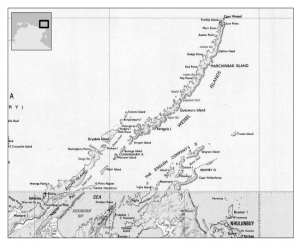
The cartographic migration of Wesel(s) Eijland – Dr. Jan Tent
The Wessel Islands group off the north-eastern coast of Arnhem Land has a rather abstruse history in terms of its naming and ultimate cartographic location. Cartographic evidence, and some primary documentary evidence points to a Wesel(s) Eijland initially referring to an island off the southern coast of present-day West Papua.
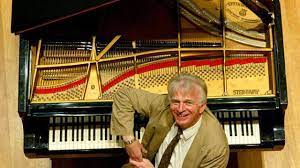
Gerard Willems – Dutch-Australian piano virtuoso
Gerard Willems AM is a Dutch Australian classical pianist and double ARIA award winner. He came by boat (Grote Beer, Holland-America Lines) with his family in 1958 and went through several years of migrant camp experience. You can see a glimpse of his work here: See also: Gerard Willems Interview:
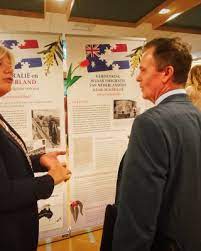
Project Migrant Australian and Dutch emigrants
In February 2023, Australian Ambassador Dr. Greg French and State Archivist Afelonne Doek opened the temporary exhibition People Movement Stories in the Netherlands National Archives in The Hague. Since that time the exhibition has also been travelling to Perth, Brisbane and Melbourne. In the exhibition, twelve people tell the story
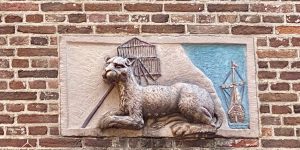
Cape Leeuwin Gable Stone in Amsterdam
Verenigde Oostindische Compagnie – VOC – (Dutch East India Company) related gable stone with a lying lioness in the ‘gable stone wall’ at the Oudezijds Kolk in Amsterdam. The stone comes from Kleine Kattenburgerstraat 14/16 and was found there by Van Arkel and Weissman (Noord-Hollandsche Oudheden 6destuk (1903) page 43).
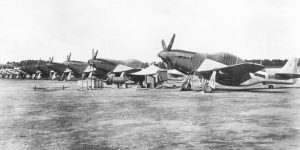
The NEI Personnel & Equipment Pool Squadron Canberra – Bundaberg
The establishment of the NEI Personnel & Equipment Pool (PEP) Squadron, initially stationed at RAAF Base in Canberra, resulted from the need to allow Netherlands East Indies (NEI) crews to recover and prepare for upcoming operations after completing their operational tours. Additionally, they required a base to accommodate spare aircraft
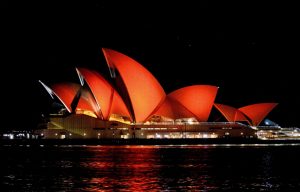
Dutch involvement in the Sydney Opera House
The Sydney Opera House, opened on 20 October 1973, and stands tall as an iconic symbol of Australian culture. Queen Elizabeth II officially opened it, emphasising the power of human creativity. The Sydney Symphony Orchestra performed at the official opening, under the direction of Dutchman Willem van Otterloo. The orchestra’s

Archived: Dutch WWII historian visits Brisbane on 17 November
Presentation on Australian-Dutch WWII events at ANZAC Square & Memorial Galleries Camp Columbia Heritage Association invites you to a presentation by Dutch historian Bas Kreuger on Dutch Australian WWII events on 17 November 2023 at the ANZAC Square & Memorial Galleries. Reservations are limited to 60 persons. Register for free
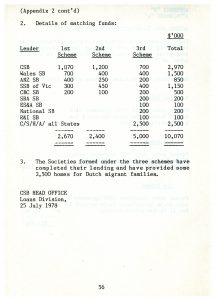
N.E.S.I.S. Netherlands Savings and Investment Society Ltd.
This institution was a non-profit organisation established to provide extra finance to people of Dutch descent for home improvements, especially those who related to the Netherlands Co-operative Housing Society (formerly the Netherlands Co-operative Building Societies, whose name was changed in 1981). The affairs of N.E.S.I.S. are managed by the same
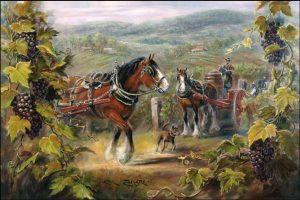
Almar Zaadstra – Painter of Australian history
Almar Zaadstra is an Australian artist based in Casterton, Victoria. Almar arrived in Australia at the age of 6 in 1966, the 4th of six children born to Sake and Ytje . They left Oudega in Friesland , Netherlands, to give their boys a brighter future in a new country,
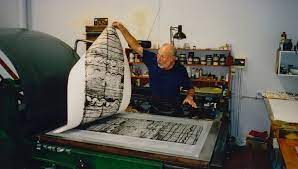
Master Lithographer Fred Genis- first celebrity printer in Australia.
Fred Genis (1934 Amersfoort, Netherlands – 2022 Mullumbimby, Australia) was a Master Lithographer and the first celebrity printer in Australia. Genis was a partner in the Hollanders Workshop in New York in the late 60’s, early 70’s, working with artists like Robert Rauschenberg, Willem De Kooning, Sam Francis, Jasper Johns, Larry Rivers
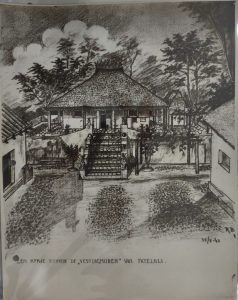
Amazing drawings from Timor fighter Richard Bartman who drowned at the sinking of the HMAS Armidale (1942).
By Gerard van Haren Richard was born on January 3, 1913, in Probolinggo, situated on the island of Java. He held the position of a militia sergeant, bearing the title tkl (2nd class), and was identified by pedigree number 13613. On December 15, 1941, he received his assignment for the
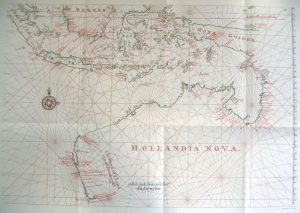
The last VOC exploration voyage to Australia – 1756
The text below is a brief summary of a report titled “EXPLORATORY VOYAGE OF THE SHIPS RIJDER AND BUIS, COMMANDED BY LIEUTENANT JEAN ETIENNE GONZAL AND FIRST LAVIENNE LODEWIJK VAN ASSCHENS, TO THE GULF OF CARPENTARIA.” This report was submitted by Gerrit de Haan, the “Master Cartographer” at Batavia, on
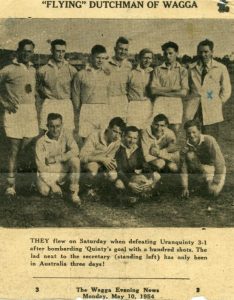
Clogball: Remembering the 38 Dutch football clubs of Australia
From the book Clogball – The Dutch and Soccer in Australia. A migrant Story. By Adam Muyt If you think the Dutch have never won a World Cup you’re mistaken: Holland won a World Cup back in the 1950s. Huh? More than 1.25 million European immigrants poured into Australia in the
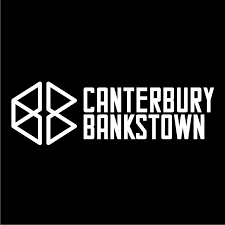
De Nederlandse Vereniging in Bankstown
The following information was written in 1985. The Club no longer exists This club is at the moment in a kind of transition state. Many of its old members have moved and their children live too far away from Bankstown and have started their own interest groups further away in
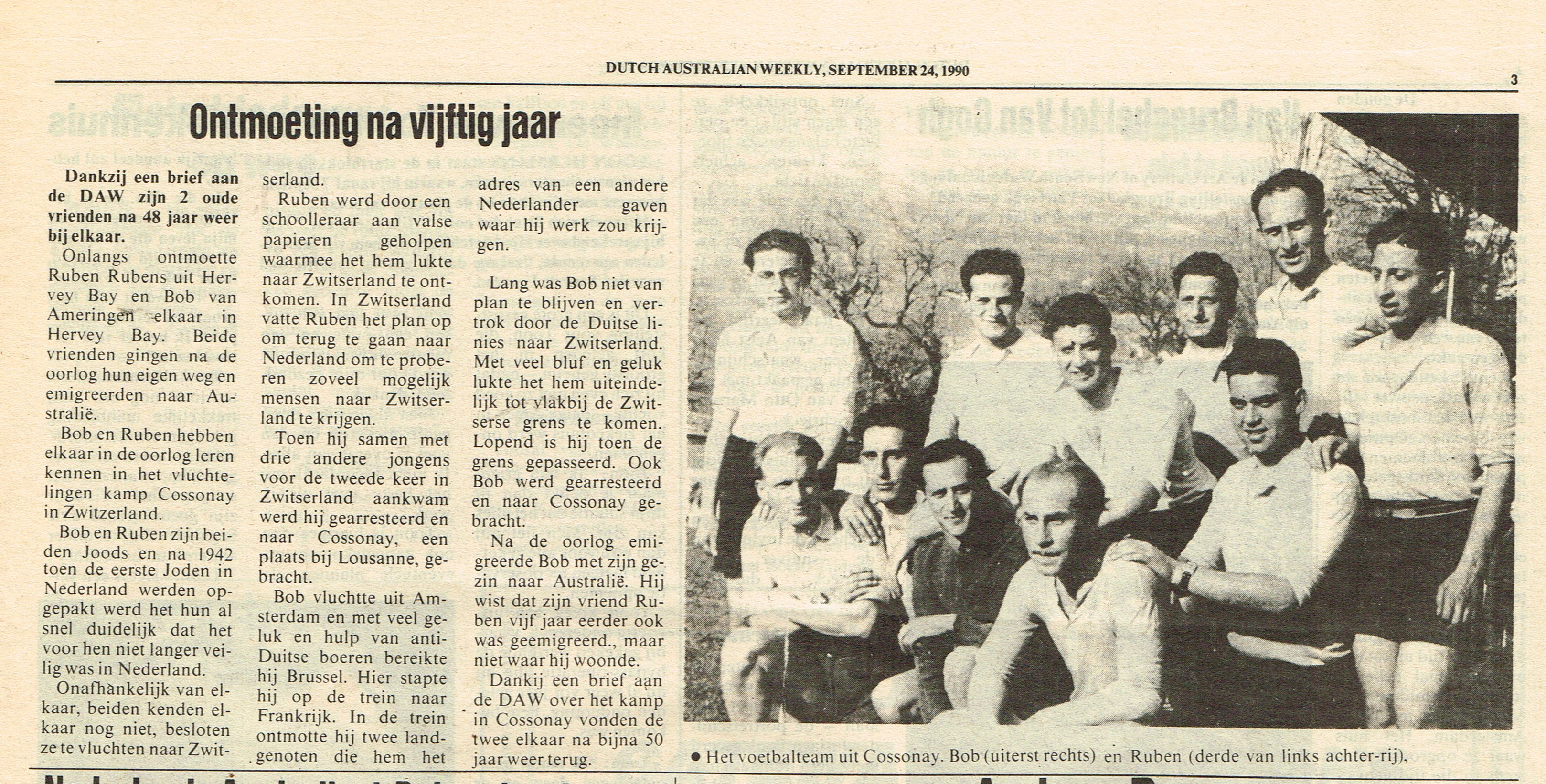
Dutch Jewish refugees met again in Australia
Article about Ruben Rubens and Bob van Ameringen. They were friends in the Netherlands before WWII when their lives were disrupted. They became refugees but eventually, separately, settled in Australia. Here after 50 years they met each other again for the first time.
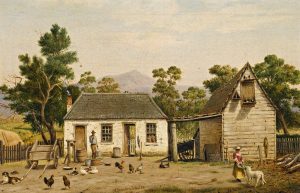
Dutch-Australian painter Henricus van den Houten (1801-1879)
Henricus Leonardus van den Houten (The Hague 1801- Melbourne 1879) was a Dutch-Australian painter, lithographer, and art teacher. He developed a passion for art at a young age. He studied painting and honed his skills under the guidance of renowned Dutch artists, specialising on portrait paintings. He worked in Leiden,
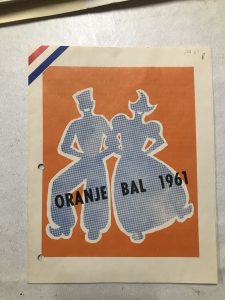
Archive Nederlandse Vereening in NSW
Main article Nederlandse Vereeniging in NSW This is one of the very first Dutch Clubs in Australia, established in 1944.
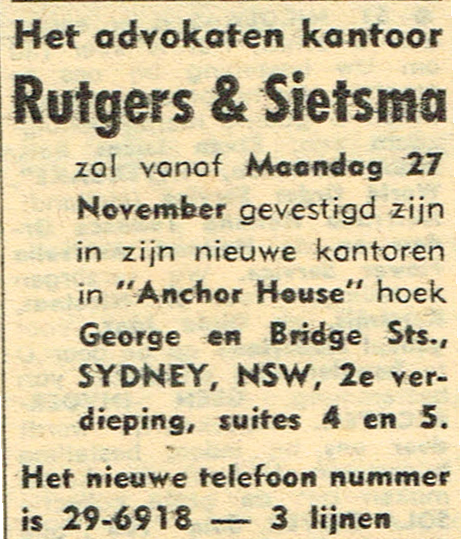
Dr. Sir Hendrik Johan Rutgers (1917-1997)
Gedurende de Tweede Wereldoorlog was Henk verzetsstrijder tijdens de Duitse bezetting van Nederland. Na de oorlog werd hij uitgezonden naar Batavia in het voormalige Nederlands Indie als Officier van Justitie bij de berechting van Japanse oorlogsmisdadigers. Hij ontmoette daar voor het eerst Dick van Arkel. Beiden realiseerden dat Australia hen
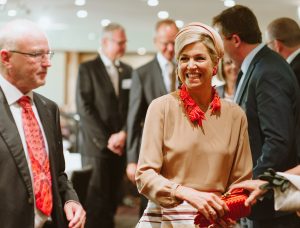
Royal Netherlands State visit to Australia 2016
The state visit of His Majesty King Willem-Alexander and Her Majesty Queen Máxima of the Netherlands to Australia in October/November 2016 was a significant diplomatic event that strengthened the ties between the two countries. Here is some information about their visit: During their visit, King Willem-Alexander and Queen Máxima visited
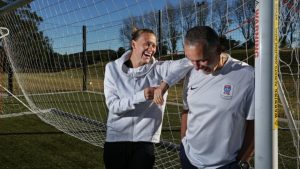
Dutch heritage of Australian football players Gary and Emily van Egmond
Gary van Egmond was born in Newcastle in 1965. His family had emigrated to Australia at an earlier time. He played professional football for the Newcastle United Jets and the Australian national team. He also coached the Newcastle Jets and the Australian national team. He married Anette and they have

Results DIMEX (Dutch Immigrant’s Experiences) surveys – 2004 and 2018
In 2004, volunteers from the DACC undertook the first Dutch Immigrant’s Experiences (DIMEX) survey. This first survey aimed to investigate several aspects of Dutch emigration to Australia. Key topics covered by the survey included: main reasons for emigration; % house ownership, % naturalised as Australians, when and why; membership of
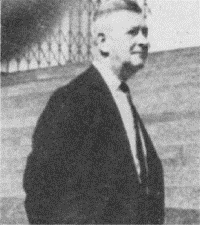
Dr. Cornelius Wouters, champion of Dutch culture.
Dr. Cornelius Willebrod Wouters (18 August 1896, Waspik -20 January 1978, Brunssum). During his youth and early adulthood he moved around the Netherlands. He met his wife in Waalwijk and after several other jobs became a translator for the Dutch National Mines (Staatsmijnen) in Heerlen. He migrated to Australia in
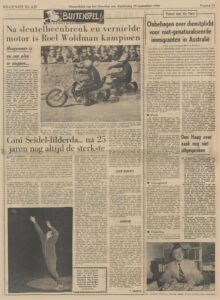
Australia emigration in Dutch Newspapers 1954-1978
Dr. C Wouters has been the most important person during the emigration period between 1950 and 1980 representing the Dutch emigrants in Australia. He tirelessly advocated for recognition of Dutch culture, history and especially its language. He was a prolific writer of articles and letter to the editors in the
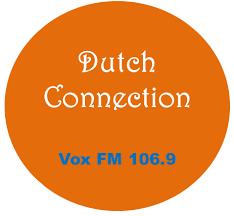
Dutch Connection – Dutch Radio for the Illawarra
By Dr. Yoke Berry from Dutch in Wollongong, released at the celebration of the 25th anniversary of the Dutch Connection radio programme. On Sunday the 9th of November 1997, the first Dutch program in the Illawarra was broadcast on the community radio station VOX FM 106.9. For the programmers and listeners
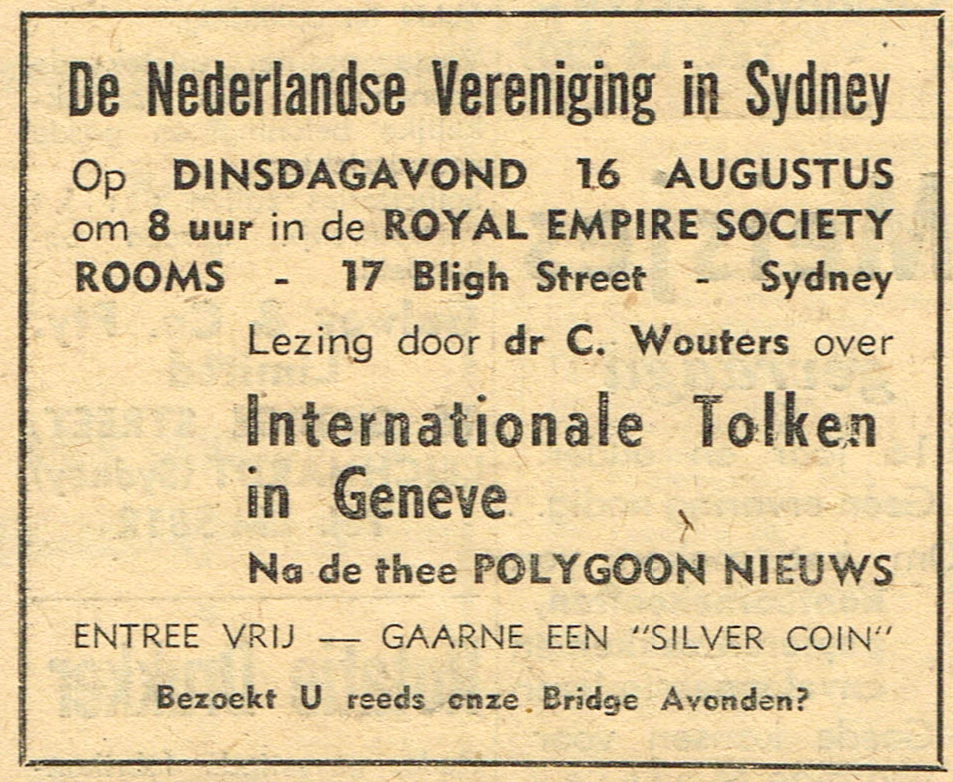
Nederlandse Vereniging in NSW (1944-2008)
This is one of the earliest Dutch Clubs in Australia, founded in 1944. The official name was first Nederlandse Vereeniging in Nieuw Zuid Wales (N.Z.W), later documents state Nederlandse Vereniging in NSW and later the more common name was used Nederlandse Vereniging in Sydney or in English Netherlands Society in
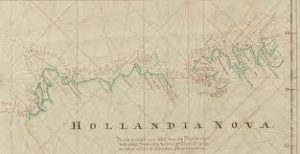
The 1705 van Delft expedition to northern Australia: a toponymic perspective – Dr. Jan Tent
During the 17th and 18th centuries the Dutch were quite active in exploring the western and northern coastlines of the Great Southland. Of one of these expeditions, conducted by Maerten van Delft in 1705, intelligence is limited and it is infrequently mentioned in the canon of Australia’s exploration. The only
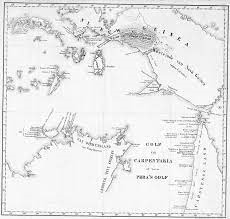
The curious Van Dijk map of the Gulf of Carpentaria – Dr. Jan Tent
In 1859 the Dutch historian, L.C.D. van Dijk published a book on the voyages of discovery made by Jan Carstenszoon in 1623 and Jean Etienne Gonzal in 1756 to the Gulf of Carpentaria. The book contains a commentary of the two voyages as well as a copy of Carstenszoon’s journal.
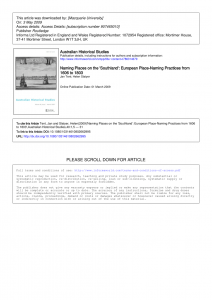
Naming Places on the ‘Southland’: European Place-Naming Practices from 1606 to 1803
The history of charting Australia’s coastline is well documented from most perspectives,but not from a toponymic standpoint. Between 1606 and 1803, some nine hundredEuropean placenames were bestowed along the Australian coast. Authors Jan Tent and Helen Slatyer report here on an investigation and analysis of the place-naming practices of the
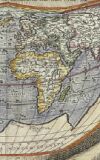
Naming places: Dutch voyagers and toponyms in the fifth part of the world, 1616-1722
Some of the first Europeans to venture into the southern Pacific Ocean were the Dutch during the 17th and early 18th centuries. The linguistic legacy of these expeditions can be found in a small number of Dutch words adopted into Polynesian languages as well as toponyms bestowed by them. The
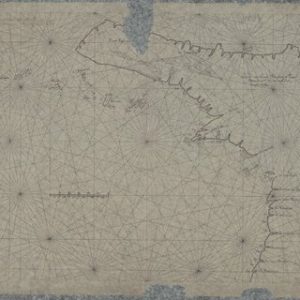
Moent and Dubbelde Ree: Two of Australia’s First Recorded Placenames – Dr. Jan Tent
The year 2006 marked the quatercentenary of the first known European charting of any part of the Australian coastline, when the Dutch mariner Willem Janszoon explored 300 kms of the north-west coast of Cape York Peninsula. He bestowed seven placenames, two of which, Moent and Dubbelde Ree have ambiguous meanings
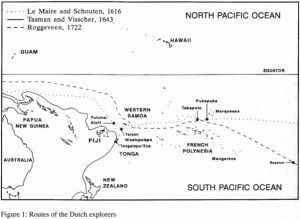
Early Dutch loanwords in the South Pacific
The Polynesian islands share in common the fact that the first European language they came into contact with was the English brought first by Captain Cook, spread by whalers and traders and later consolidated by missionaries. The purpose of the paper below is twofold. First, the authors will present evidence
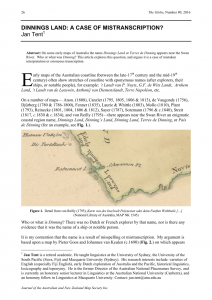
Dinnings land: a case of mistranscription? – by Dr. Jan Tent
On some early maps of Australia the name Dinnings Land or Terres de Dinning appears near the Swan River. Who or what was Dinning? This article explores this question, and argues it is a case of mistaken interpretation or erroneous transcription. “The crucial word in the description is duyning. What
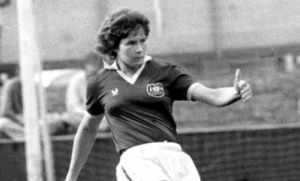
Rose van Bruinessen – Dutch heritage in the early Matildas
Rose van Bruinessen (later known as Rosemary Moodley) was one of the pioneering figures in Australian women’s football. Known as Matilda #10, she played a significant role as a defender in the foundational years of the Australian Women’s National Football Team — now world-renowned as the Matildas. Rose was born
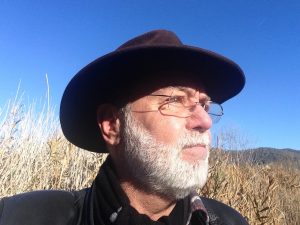
Dutch names in Australia – Linguist Dr. Jan Tent
Dr Jan Tent was born in Amsterdam, his parents originating from Groningen. Jan’s father worked for IBM in Amsterdam. In 1957 his father was made production manager of the IBM typewriter and punch card plant in Lidcombe (Sydney). The appointment was supposed to be for two years but stretched out
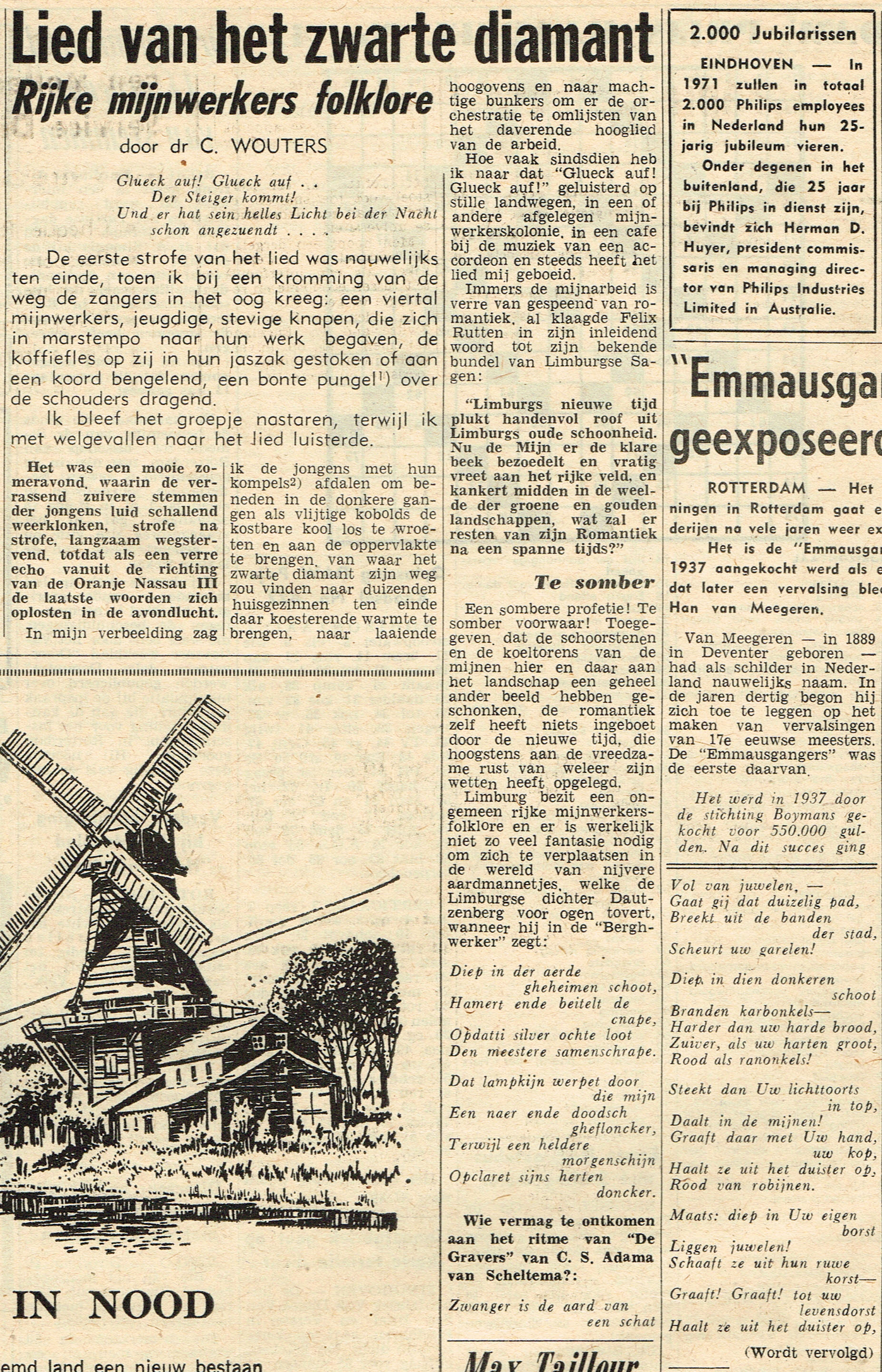
Articles, Poems and Letters to the Editor from Dr. C Wouters
Dr. Wouters did not shy away from controversial issues. He refused to swear allegiance to the Queen during his naturalisation ceremony, instead he was allowed to swear on the Bible, something that since that time has been accepted by the Australian Government. He advocated for equality for migrants within various
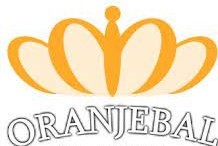
De Nederlandse gemeenschap in het sociale leven van Australia – 1958
The Dutch community in social life in Australia.
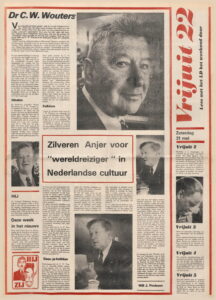
Many awards bestowed on Dr Wouters
Dr. Cornelius Wouters is most likely the internationally most awarded Dutch-Australian. He was awarded the Knighthood in the Order of Oranje-Nassau. He also received the Silver Anjer from the Prins Bernhard Fonds in 1976 for his contribution to the preservation and promotion of Dutch culture in Australia. The Silver Anjer
Stephanie Branz – Dutch-Australian Sports-commentator
In this video clip from the National Archives of Australia Stephanie talks about her Dutch heritage. Stephanie Brantz is a television presenter and sports personality from Australia. Born in 1972 in Queensland to Dutch parents to Phillipa and Hans Branz, she began her modeling career in 1985 while attending St
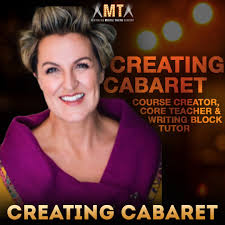
Dutch/Australian Artist Queenie van de Zandt Invites Dutch women over 40 to share their stories of menopause and middle age
Queenie van de Zandt is the daughter of Ria and Hans van de Zandt. Hans is the co-founder of the Canberra Dutch Club in the ACT. Queenie mentioned that she is very proud to be Dutch and that parts of her Dutch heritage have influenced her writing. In particular in
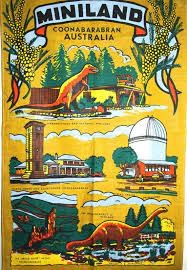
Peter Zorgdrager established Miniland in Coonabarabran
Miniland was a theme park in Coonabarabran, New South Wales, Australia. It was opened in 1972 by Peter Zorgdrager, a Dutch immigrant who was inspired by Dusneyland. The park featured a variety of giant sculptures, including dinosaurs, animals, and landmarks from around the world. It also had a children’s playground,
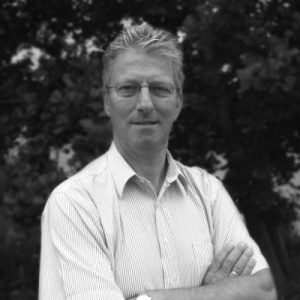
Catalogue of an exhibition (in Groningen) about the history of Australia – 1988
Het onbekende Zuidland naderbij’ by Jaap van der Veen is a catalogue of an exhibition about the history of Australia, the Aborigines and the Dutch explorers and emigrants. It is published by Volkenkundig Museum ‘Gerardus van der Leeuw’ in Groningen in 1988. It contains contributions from Don Grimes and other
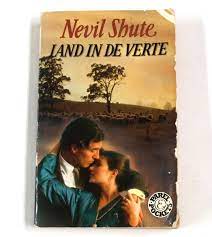
Dutch emigration literature in Australia
In previous months we have highlighted Dutch literature in Australia and we continue this month with another collection of interesting and often forgotten books. However, some will recall nostalgic memories from those who arrives as children or as emigrants from the 1950s and 1960s. Land in de verte – 1952
The DACC Library Collection
The DACC Library has a collection of books, magazines, CD’s, DVD’s and VHS tapes. Most are not yet in the online data base. The table below lists the categories and the number of books and magazines in each category. Please contact the DACC for further information.
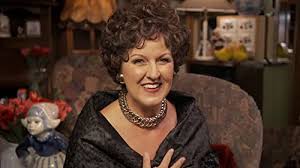
Jan van de Stool – the Dutch/Australian comedic, alter-ego of performer Queenie van de Zandt
Jan van de Stool, International Musical Therapist – was a successful Real Estate Agent before giving it all up and making a natural progression into becoming a Self-Help Guru. She lives in Woy Woy, with Pieter, her husband and cousin, and their son Henk, and promotes her unique brand of
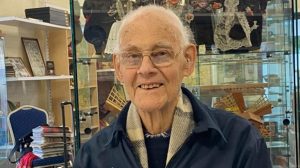
Ype De Bruin OAM leading figure in the Dutch Community in Victoria
Ype is the President of the Associated Netherlands Societies in Victoria; a position he has held for 29 years. He worked for 32 years with the Gas & Fuel Corporation, during which time he held several management positions and set up a training school in Victoria for technical and non-technical
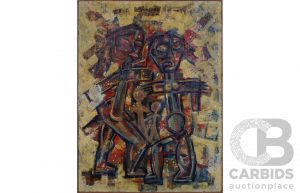
Dutch-Indonesian-Australian Geophysicist and artist William Wiebenga
William Alexander Christiaan Johannes Wiebenga was an Indonesian-Dutch-Australian geophysicist and artist. He was born in Benkoelen, Indonesia (now known as Bengkulu, Indonesia) on December 5, 1910. His father with the same name, William Alexander Christiaan Johannes Wiebenga, was a Dutch civil servant. His mother Jeanne Helene de Rochemont was born
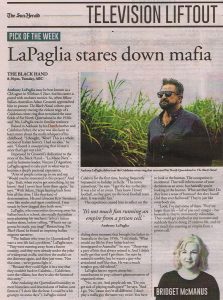
Australian Actor Anthony LaPaglia has Dutch Ancestry
Maria Johannes Brendel is a secretary and the mother of Australian actor Anthony LaPaglia. She is originally from the Netherlands and has Dutch ethnicity. Her husband Gedio “Eddie” LaPaglia, emigrated from Bovalino, Province of Reggio Calabria, Italy. They had two other sons, the Australian actor Jonathan LaPaglia and Michael LaPaglia,
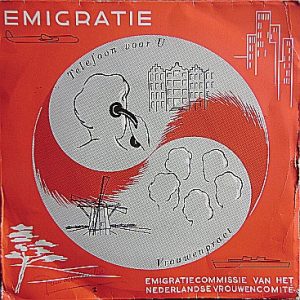
Emigratie Commissie of the Nederlandse Vrouwen Comité
The Emigratie Commissie was a committee of the Nederlandse Vrouwen Comité (NVC – Dutch Women’s Council). The Emigration Commission of the Dutch Women’s Council, was an organisation in the Netherlands that focused on assisting women and families with the process of emigrating to other countries. The committee operated during the

Stichting Landverhuizing Nederland (Foundation for Emigration Netherlands) – 1913-1967
The Nederlandse Vereniging Landverhuizing (Netherlands Association Emigration) was established in 1913 to promote Dutch emigration. It merged with the Emigration Centre Holland (Emigratie Centrale Holland) in 1931 and formed the Netherlands Emigration Foundation (Stichting Landverhuizing Nederland). The foundation was renamed the Dutch Emigration Service (Nederlandse Emigratiedienst) in 1952. The foundation
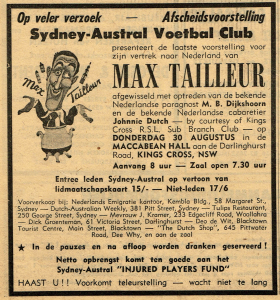
Dutch Football Club Austral Sydney
Dutch Football Club Austral was a soccer club that was founded in Sydney by a group of Dutch immigrants, under the name Hollandia at the Black Tulip Restaurant in George Street in 1949. Its restaurateur David Bos became the first president and also was its main sponsor. The first game

The Return of Dutch Migrants from Australia, New Zealand and Canada – 1983
The book The Return of Dutch Migrants from Australia, New Zealand and Canada is a research report written by Wim Blauw and Joed Elich and published by the Netherlands Interuniversity Demographic Institute (NIDI) in 1983. The book is based on a survey of 1,200 Dutch migrants who returned to the
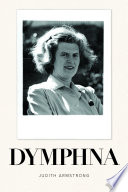
Hilma Dymphna Lodewyckx married to Manning Clark.
Hilma Dymphna Lodewyckx (1916-2000) was the daughter of Augustin Lodewyckx and Anna Sophia Hansen. She was born in Stellenbosch, South Africa and later moved to Melbourne, Australia with her family when her father was appointed lecturer at the University of Melbourne. She mainly used her middle name Dymphna. Her father
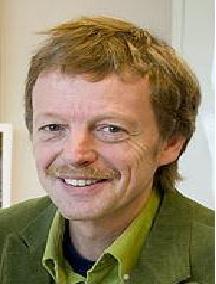
Investigating Lexical Attrition in Long-Term Dutch Expatriates in Australia: A Study on First Language
Dissertation by Ton Ammerlaan (born 1960) Radbout University Nijmegen – 1996 Introduction: Language attrition, the gradual loss of one’s first language (LI) proficiency due to decreased exposure and use, has been a topic of interest in sociolinguistic and linguistic research. This article focuses on the nature of variables influencing lexical
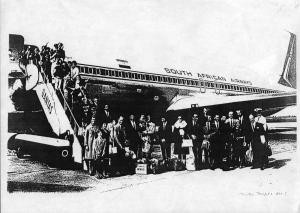
Information from the Dutch Emigration Service – 1953
Nederlandse Emigratiedienst, Australië. Dagelijks leven van emigranten tegen de achtergrond der Australische economie. Recente emigrantenbrieven, aangevuld met enkele belangrijke artikelen, welke de laatste tijd over Australië het licht zagen, themanummer van: Leven en Werken in den Vreemde. Actualiteiten ten behoeve van de Emigratie-voorlichting. Uitgave Nederlandse Emigratiedienst, 12 sept. 1953 This
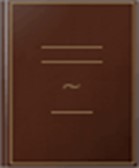
Dutch in Victoria – Henk Overberg
Dutch Communal Life in VictoriaBy Henk Overberg Henk Overberg’s detailed sociological and historical analysis of the Dutch in Victoria reveals that ethnic communities do not simply emerge by demographic presence alone. Rather, they must be made—through shared identity, communal interaction, organisational structures, and the development of collective memory. Overberg contends
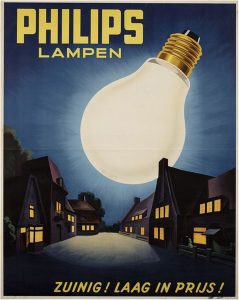
Frank Leddy reorganised Philips Australasia
By Hans Overberg Franciscus Nicolaas Leddy (1903-1964), company director, was born on 20 April 1903 at Rotterdam, the Netherlands, son of Franciscus Nicolaas Leddy, director of prisons, and his wife Cornelia, née Delabrie. Educated at Leiden high school and the Nederlandse Economische Hogeschool, Rotterdam, young Leddy began his professional career
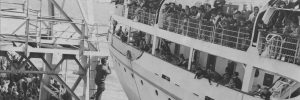
Study: Why potential emigrants cancelled their plans – 1959
Regeringscommissaris voor de Emigratie, Bureau Onderzoekingen, Annulering van emigratie. Een onderzoek bij 500 Australië-units naar de redenen, waarom zij van emigratie afzagen. ’s-Gravenhage: Regeringscommissaris voor de Emigratie, Bureau Onderzoekingen, 1959. This is a title of a report published in 1959 by the Regeringscommissaris voor de Emigratie, Bureau Onderzoekingen (Government Commissioner for Emigration,
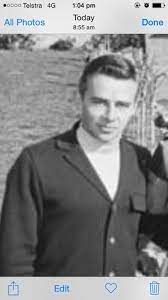
Jan Wakker jockey
Jan Wakker was a Dutch-Australian jockey who had a successful career in horse racing. He was born on January 10, 1943, in Groningen, and emigrated to Australia in 1950. His family settled in Moe. Fred Wakker (Jan’s father) found a racing pigeon in the family loft and decided to chase
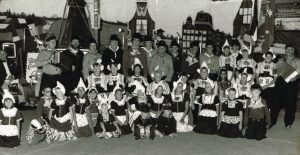
Dutch Folk Dancing Group
Dr. Cornelis Wouters was the founder of the Dutch Folk Dance Group, a group of over 30 enthusiastic Dutch immigrants (later joined by Australians who married Dutch immigrants). They performed folkloric dances at charitable association gatherings. No other group could boast such original national costumes, as all Dutch regional costumes
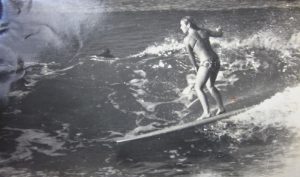
Surf Champion Dorothy de Rooy
Dorothy De Rooy (Vidgen) is a former professional surfer and champion who was born in Breda, Netherlands in 1948. When she was three years old, her family immigrated to Australia, and they eventually settled in Mona Vale, where her maternal grandparents were already living. Dorothy attended Mona Vale Public School
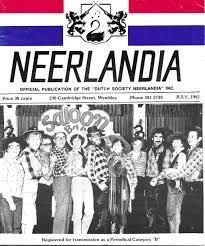
Journalist and publisher Jan Rempt
‘Aan de rand der wereld. Een Hollandse emigrant in Australië’ with a foreword written by B.W. Haveman, Regeringscommissaris voor de Emigratie (Government Commissioner for Emigration) was published in Dokkum by Schaafsma & Brouwer in 1953. The book is written by Jan D. Rempt, a Dutch journalist who immigrated to Australia
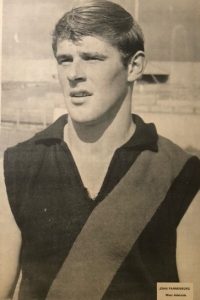
Footballer John “Jack” Pannenburg
John “Jack” Pannenburg was born in1946 in Arnhem, the Netherlands. His family immigrated to Australia when he was young, and he grew up in Mount Gambier, South Australia. Pannenburg was a talented footballer, and he joined West Adelaide Football Club in the South Australian National Football League (SANFL) in 1966.

Geschreven portretten van Nederlandse emigrantenpriesters in Australië – 1994
A Book Review: Written Portraits of Dutch Migrant Priests in Australia The book Geschreven portretten van Nederlandse emigrantenpriesters in Australië, translates to Written portraits of Dutch migrant priests in Australia in English. It was edited and adapted by J.W.P. Elferink from the original manuscripts of Theo van der Meel, a

Emigration survey: Inpakken en wegwezen? – 1981
Ministerie van Sociale Zaken, Inpakken en wegwezen? Een onderzoek naar kenmerken en motieven van emigranten naar Australië, Canada en Nieuw-Zeeland. Onderzoek verricht door het Ministerie van Sociale Zaken met medewerking van het Instituut voor Psychologisch Marktonderzoek te Rotterdam en de Nederlandse Stichting voor Statistiek te ’s-Gravenhage. Den Haag: Ministerie van
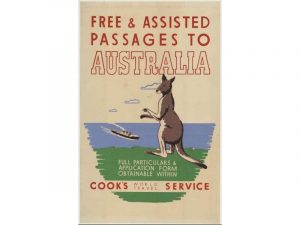
Thesis: De teruggekeerde emigrant (The Returned Emigrant) – 1966
The document De teruggekeerde emigrant (The Returned Emigrant) is an unpublished thesis written by Heikina R. Scholten in 1966. It is a qualitative study on the reasons for return to the Netherlands of Dutch emigrants from Australia for the purpose of information provision. The thesis was submitted to the Haagse
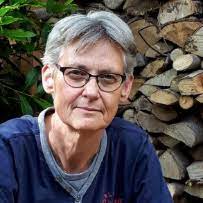
‘Invisibility and selectivity’. Dutch migration in the 19th and 20th century – 2010
Marijke van Faassen is a Dutch historians who has been involved in several research projects and publications related to migration history. Marijke is a senior researcher at the Huygens Institute for the History of the Netherlands, and has a specialisation in (digital) scholarly editing. She has worked on various topics
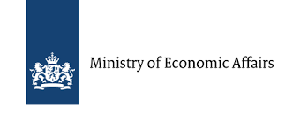
Report of the orientation trip to and through Australia and New Zealand – 1957
A. Drost & B.J. Spitholt, m.m.v. J.M. van Delden, Verslag van de oriëntatie-reis naar en door Australië en Nieuw-Zeeland, typescript, 1957 (Koninklijke Bibliotheek Den Haag, sign. NL 94 H 1000). This is a report of a trip to Australia and New Zealand by three Dutch officials: A. Drost, B.J. Spitholt,

Textile artist Annemieke Mein
Annemieke Mein was born in Haarlem, in 1944. Her Dutch heritage has had a significant influence on her art. Growing up in the Netherlands had a profound impact on her appreciation for nature and the environment. She spent much of her childhood exploring her grandparents’ garden in the Netherlands and
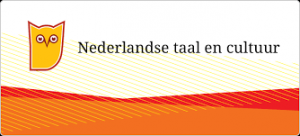
Dr. Cornelis Wouters and the Dutch language
In the 1950s, Dr. Cornelis Wouters advocated for more attention to be given to the culture of the countries from which many immigrants had settled in Australia, in the country’s education system. He argued that this could be achieved by broadening the curriculum to include lessons in languages other than
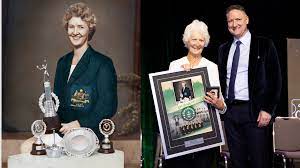
Netball champion Ingrid Huisken
Ingrid Huisken is a Dutch-Australian former netball player who had a successful career playing for both Australia and the Netherlands. She was born on January 16, 1961, in Leiden. Her family migrated to Australia when she was 12 years old in 1973. Ingrid began her netball career playing for the
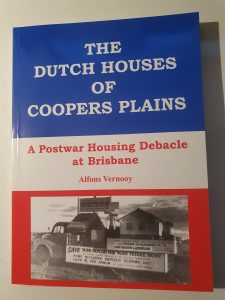
The long Dutch relationship with the Southern and Southeast suburbs of Brisbane.
The long Dutch relationship with Southeast Brisbane began during World War II, when in 1942 the Americans established Camp Columbia in Wacol, Brisbane to stop the Japanese advance in the Southwest Pacific. The camp became the staging ground for the American campaign, covering an area of 20 by 15 square
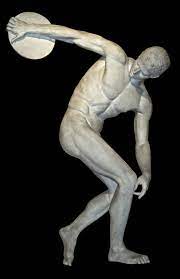
Peter Tangelder discus throwing champion.
Peter Tangelder is a former Dutch-Australian discus thrower who had a successful career in the sport. He was born on December 13, 1958, in the Netherlands, and migrated to Australia in the early 1980s. Tangelder was a member of the Australian athletics team for several years and competed in many
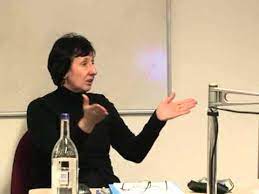
The Effect of Mixed Marriage on Language Shift in the Dutch Community in Australia – 1980
This thesis was written by Anne Pauwels, a linguist and professor. The main focus of the thesis is to examine how mixed marriages between Dutch- speaking and English-speaking Australians impact on the use and maintenance of the Dutch language in Australia, within the family and the Dutch community. The project
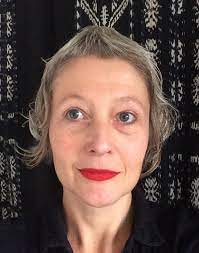
Manon van Kouswijk – jeweler
Manon van Kouswijk, a Dutch artist born in 1967, has been residing and creating in Melbourne since 2010. She received her education at the Gerrit Rietveld Academy in Amsterdam, where she later became the Head of the Jewellery department from 2007 to 2010. Central to Manon’s artistic approach is her
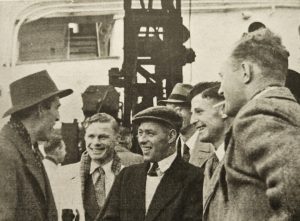
Dairy cows and dairy products in Dutch-Australian emigration literature, 1945-1965
Melkkoeien en zuivel in Nederlands-Australische emigratieliteratuur, 1945-1965 This is the original article by Prof. Ton van Kalmthout with graphics, pictures and source references in Dutch. Below that is a PDF of the article’s English translation. Author: Professor dr. A.B.G.M. (Ton) van Kalmthout – senior-onderzoeker Literatuurgeschiedenis | Koninklijke Nederlandse Akademie van
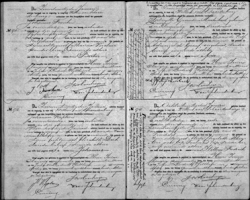
Unpublished transcript: “Emigration from the Netherlands” by Professor Geijl
This particular work is not widely known or may have limited information available, it doesn’t appear in the overview of his extensive list of publications. It is a typescript with handwritten additions, and it is located in the Koninklijke Bibliotheek (National Library) in The Hague, under number NL 94 B
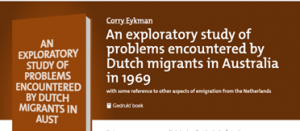
Study: Dutch Migrants in Australia: Challenges and Experiences – 1969
A study conducted by Corry Eykman (Eijkman) in 1969 explored the challenges and experiences of Dutch migrants in Australia. The study found that Dutch migrants faced a number of challenges, including the language barrier, the different climate, the unfamiliar culture, the loneliness of being away from their family and friends,

Dutch Women Share Their Emigration Stories – 1960
A book published by the Emigratie Commissie van het Nederlandse Vrouwen Comité (Emigration Committee of the Dutch Women’s Committee) features writings by emigrant women who share their experiences from afar. The book, titled “Ons tweede huis: Emigrantenvrouwen schrijven van verre” (Our Second Home: Emigrant Women Writing from Afar), was released
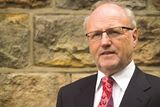
Paul Budde co-founder of the UN Broadband Commission for Digital Development
Paul was born in Vught on 8 September 1950. His parents Herman Budde and Annie Velthuis were born in Ootmarsum. (See also: The War of my Parents) In 1953 the family moved to Oss. Paul has a sister Monique and brother Rob. After his education and military service, Paul worked

Dutch schools and courses
Schools (listed alphabetically) Dutch Courses (listed alphabetically by provider) Books Nederlands als 2e taal
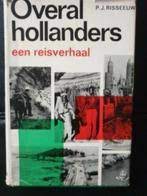
Everywhere Dutch (Overal Hollanders) book by J.P Risseeuw – 1965
“Overal Hollanders” by Pieter Johannes Risseeuw (1901 – 1968) is a historical account of Dutch migration and settlement around the world, focusing in particular on Australia. The book was published in 1965 by Bosch & Keuning N.V. in Baarn, the Netherlands. In “Overal Hollanders,” Risseeuw traces the history of Dutch
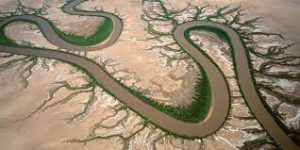
Dutch-Australian photographer Richard Woldendorp
This article is written with the assistance of Richard’s wife Lyn she also made the photo selection below. Lyn is a photo librarian and has been doing this for 60 years. Richard Woldendorp was born in Utrecht, Holland on the 1st January 1927, and lived for some time in Leeuwarden
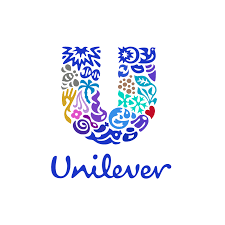
Unilever and the Australian link to the rise of margarine.
In 1869, a French chemist named Hippolyte Mège-Mouriès invented a spread made from beef tallow and skimmed milk that he called “margarine.” Margarine was initially viewed with suspicion and was slow to catch on in Europe, but by the late 19th century, it had become popular as a cheaper alternative
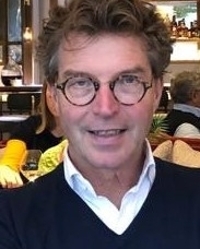
Dutch emigration literature with regard to Australia 1946 – 1992
The following list of Dutch emigration literature (in a broad sense) includes book titles that specifically relate to emigration of Dutch people to Australia. The list, compiled by Ton van Kalmthout, does not claim to be exhaustive, but forms a first step towards a further inventory of reading materials available
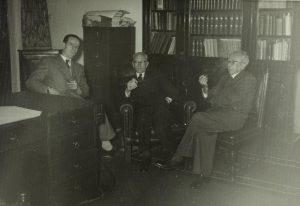
Augustin Lodewyckx introduced the first university course in Dutch in Australia
Augustin Lodewyckx (1876-1964) was a Belgian scholar and professor who made significant contributions to the study of modern languages in Australia. He was born on December 8, 1876, in Booischot, Belgium, the son of Joannes Lodewijckx, a farmer, and his wife, Maria Dymphna Maes. After completing his secondary education in
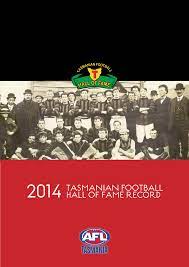
VFA top football scorer 1966 – Ben Nusteling
Ben Nusteling was a Dutch Australian Australian Rules footballer who was born in Dordrecht, Netherlands, on February 27, 1939. His family immigrated to Australia when he was a child, and he grew up in the Melbourne suburb of Prahran. Nusteling played for the Prahran Football Club in the Victorian Football
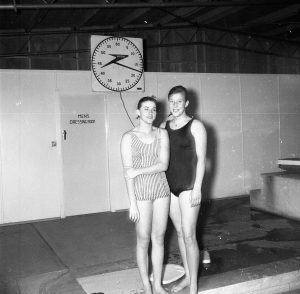
Marguerite Ruygrok – Olympic Breaststroke Swimmer
Marguerite Ruygrok was born on June 3, 1947, in Amsterdam, the Netherlands. She migrated with her family to Australia at a young age. She began swimming at an early age and showed considerable talent for the sport, particularly in breaststroke events. Ruygrok first came to national attention when she won
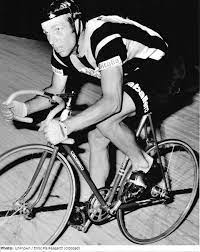
Henk Vogels Olympic Cyclist
Henk (Hendricus) Vogels (Haarlem, 1 November 1942 – 9 August 2019) was a Dutch professional cyclist who immigrated to Australia with his parents and siblings in 1955. His father, a plumber, settled the family in Riverton, Western Australia. His father supported him in establishing his cycling career and this resulted eventually
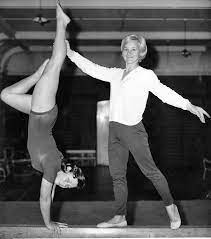
Nelleke Jol – founder Western Australian Women’s Gymnastics Association
Nelleke (Nelleck) Jol is a former Dutch Australian gymnast and coach who has made significant contributions to the sport of gymnastics in Western Australia. Jol was born in the Netherlands and moved to Australia in the 1970s. She represented Australia as a gymnast in the 1979 World Championships held in
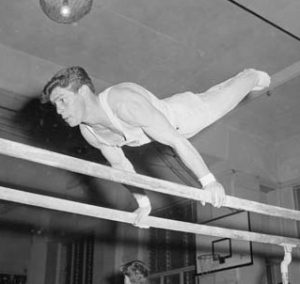
Gymnastics Olympian Benjamin de Roo
Benjamin Hielke de Roo was a renowned Australian gymnast who was born on 11 February 1940 in Enschede. His family emigrated to Australia in 1957, and he became an Australian citizen in 1960. De Roo started his gymnastics career in the Netherlands and continued his passion for the sport when
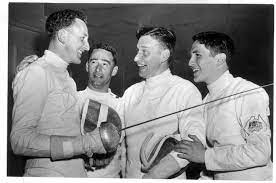
Fencing Olympian Hilbert van Dijk
Hilbert van Dijk was born on 24 September 1918 in the Netherlands, and he grew up in Amsterdam. He learned to fence at a young age and became one of the top epee fencers in the country, consistently ranked among the top six. Van Dijk immigrated to Australia in 1948,

Harry van der Sluys famous Australian comedian
Hyam van der Sluice (sometimes spelled “Sluys”) was born in Amsterdam, the Netherlands, in 1855 and arrived in Adelaide, Australia, in 1882. He married Amelia (nee Barnett)in Adelaide in 1886, and they had seven children. Hyam was of Dutch-Jewish heritage, while Amelia was of English-Jewish heritage. Hyam passed away in
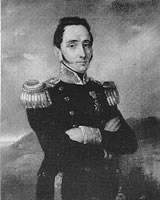
The Colonial Warship the Doerga explored northern Australia (1825-1826)
In the 1820s the Dutch Colonial naval vessel Doerga (Dourga) the Dutch was sent by Netherlands East indies Government to northern Australia to establish Dutch claims to the region and to investigate the trepang trade. The voyages of the Dutch brig of war Dourga, were recorded by its Captain Dirk
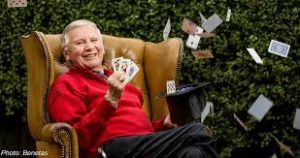
Magician Rids van der Zee (1923-2003)
Rids van der Zee was a Dutch-born magician who immigrated to Australia in 1954. He was born in the Frisian town of Franeker, in 1923. Van der Zee was a skilled magician who specialised in close-up magic and sleight of hand. He performed under the stage name “Rids the Flying
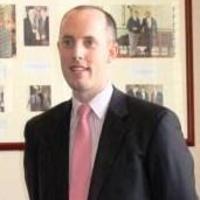
Frank Broeze – maritime historian
Franklin Jan Aart Broeze, who went by Frank Broeze, was a prominent maritime historian and academic who was born on January 20, 1945, in Rijswijk, Netherlands. Broeze grew up in the Netherlands and attended Leiden University, where he earned his Ph.D. in maritime history. Frank Broeze emigrated to Australia in
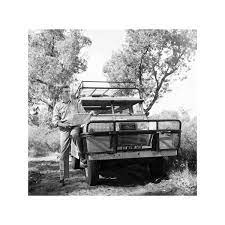
Anthropologist Mark de Graaf
Mark de Graaf came to Australia in 1958. He studied a Claremont Teachers College and the University of Western Australia to become a geology teacher. He took part in the Perth Drama Festival and the first live television show produced in Perth. He also worked ads a part time actor
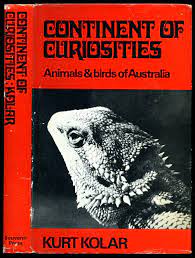
Ornithologist Jonkheer Gerard Frederick van Tets
Jonkheer Gerard Frederick van Tets, also known as Jerry van Tets, was a renowned ornithologist and paleontologist who made significant contributions to the study of birds and prehistoric life. He was born on January 19, 1929, in London, England, to Dutch parents, jhr. Hendrik Barthout van Tets, heer van Goidschalxoord,
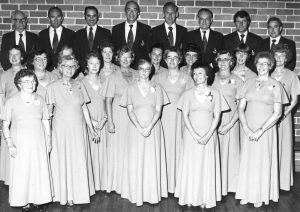
Sunrise Choral Society – Blacktown
Sunrise Choral Society was a Dutch choral group that formed in Blacktown in 1959 under the name “Morgenrood”. Initially their repertoire was purely Dutch., however they became increasingly more anglicised. They held an International Festival of Song, Dance, and Music in 1976 as a fundraiser for the Blacktown Hospital. Other
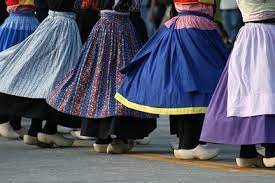
Dutch Choir and Folkloric Group Dee Why
The Dutch Choir and Folkloric Group Dee Why was a choral group formed by 25 Dutch parishioners of the Dee Why Presbyterian Church in Sydney, Australia in 1958. Initially, the group was primarily focused on performing liturgical music for the church, but it later expanded its repertoire to include Dutch
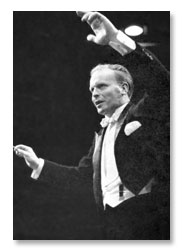
Jan Willem van Otterloo conductor of Melbourne and Sydney Orchestras
Jan Willem van Otterloo was a prominent Dutch conductor who achieved great success both in his home country and in Australia. He was born on December 27, 1907, in Winterswijk, Netherlands, and began his music career as a cellist before turning to conducting. He studied at the Amsterdam Conservatory and
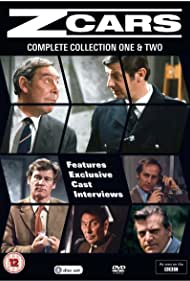
Opera singer Pieter van der Stolk
Pieter van der Stolk was born on September 14, 1934, in Amsterdam. Pieter van der Stolk during his time with Opera Australia. Supplied: Sandie van der Stolk. At a certain stage he moved to Britain, where he appeared in several BBC television shows and films, including “Z Cars,” “Doctor Who,”
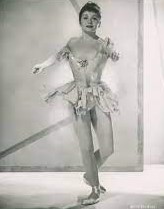
Ballet Dancer Willy de la Bye
Willy de la Bye was born on August 25, 1934, in The Hague, Netherlands. She began her dance training at a young age and went on to study with several renowned teachers and choreographers in Europe, including Maurice Béjart and Martha Graham. In 1957, de la Bye joined the Dutch
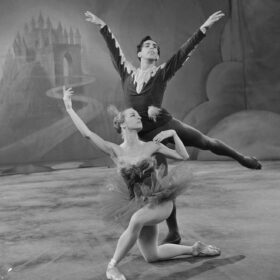
Jaap Flier Artistic Director of the Dance Company of NSW 1976-1982
Jaap Flier was born in Scheveningen the Netherlands, on 27 February 1934. He began dancing at a young age and went on to study ballet at the Royal Ballet School in London in the 1950s. After completing his training, Flier returned to the Netherlands, where he danced with the Dutch
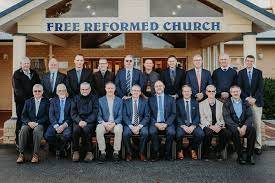
Free Reformed Church of Australia
The Free Reformed Church of Australia (FRCA) is a Protestant denomination that has its roots in the Dutch Reformed tradition. The church was established in the 1950s in Australia, as a result of Dutch immigration to the country. The FRCA subscribes to the Three Forms of Unity (Belgic Confession, Heidelberg
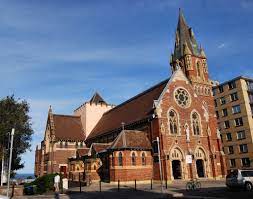
“Het Kompas” for the Dutch Catholic Community in Sydney.
“Het Kompas” was a Dutch-language publication that was established in Sydney in the early 1950s, by Catholic Dutch Migrant Organisation (CDMO) (Katholieke Nederlandse Migranten Organisatie – KNMO). It was a Catholic publication aimed at serving the Dutch Catholic community in Sydney and the surrounding areas. Dr Cornelius Wouters served as
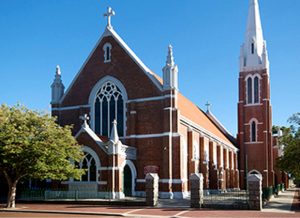
Dutch Catholic publication: the Contact Perth (established 1955)
“Contact” was a Dutch-language publication that was established in Perth, Australia in 1955. It was a Catholic publication aimed at serving the Dutch Catholic community in Perth and the surrounding areas. The publication focused on Catholic news and events related to the Dutch Catholic community. It also featured articles on
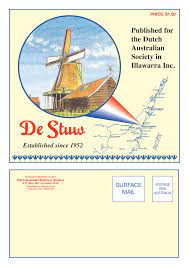
“De Stuw” Dutch-language publication llawarra, 1952.
“De Stuw” is a Dutch-language publication that was established in Illawarra, Australia in 1952. It was the monthly stenciled organ of the Nederlands Australische Vereniging (Dutch Australian Association) in Illawarra, which was founded that same year to serve the Dutch community in the Illawarra region of New South Wales. The
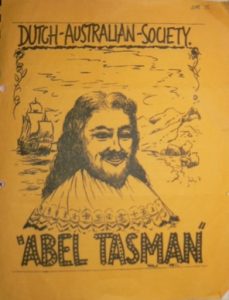
“Mededelingen” Dutch-language publication Hobart (1952- 1955).
“Mededelingen Ned. Vereniging “Abel Tasman”” was a Dutch-language publication that was established in Hobart, Australia in 1952. It was published by the Dutch Association “Abel Tasman,” which was founded in 1950 to serve the Dutch community in Tasmania. The publication focused on Dutch-Australian cultural and community news, as well as
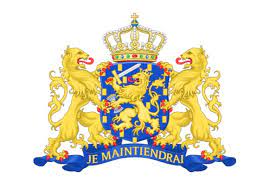
“Je Maintiendrai” former Dutch-language magazine Adelaide
“Je Maintiendrai” is a Dutch-language magazine that was established in Adelaide, Australia in 1957. The magazine was published by the Dutch Australian Association of South Australia, which was founded in 1951 to serve the Dutch community in Adelaide and surrounding areas. The “Je Maintiendrai” (Ik zal Handhaven) motto represents the
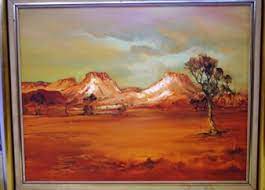
Carl van Nieuwmans – artist influenced by the Australian desert.
Carl Van Nieuwmans (also known as Carolus Joannes Nieuwmans) was a Dutch-born Australian artist who was born in 1931 in The Hague. He studied at the Haagse Academy of Visual Arts in the Netherlands and after his arrival in Australia in 1950 at the Sydney Technical School. Van Nieuwmans travelled
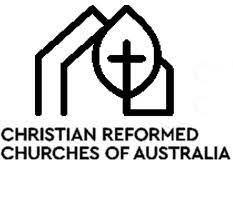
Reformed Theologian Rev. John Vanderbom
Rev. John Vanderbom (1913-1992) was a Dutch-born Australian Reformed pastor. He was born in the Netherlands and migrated to Australia in 1951. His parish originally centred on Sydney but extended from Brisbane to the Victorian border. He later worked in southern Tasmania. After completing his theological studies in the Netherlands,
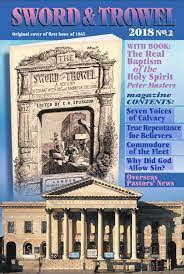
Trowel and Sword publication of the Reformed Church in Australia (historic)
Trowel and Sword was a publication of the Reformed Church in Australia, which was founded in 1953. The first editorial of this Christian magazine in Australia written by Rev. John Vanderbom in 1954. The first two editors (Revds. John Vanderbom and Bill Deenick) were in Australia, but Trowel and Sword
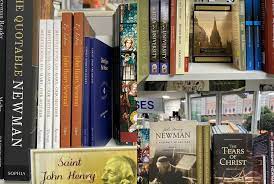
Dutch-language Catholic magazine – Onze Gids
Onze Gids was a Dutch-language Catholic magazine established in Australia in 1950. The magazine was published by the Catholic Printing and Publishing Company in Melbourne, Australia, and was aimed at Dutch immigrants to Australia. The magazine featured articles on Catholicism, current events, and cultural topics, as well as news and
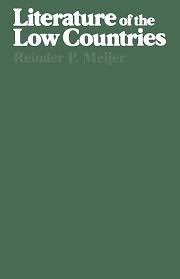
Reindert Meijer on Dutch Literature
R.P. Meijer was born on 18 January 1926 in Amsterdam. He studied Dutch at the University of Amsterdam where he graduated in Dutch language and literature in 1950. He obtained his PhD in Dutch literature in 1958. Meijer has taught and researched at various universities in the Netherlands and abroad.

Cornelis Vleeskens – Performance Poet
Cornelis Vleeskens (1948-2012) was a Dutch-Australian poet, translator, and visual artist known for his experimental and wide-ranging works. Vleeskens arrived in Australia as a Dutch immigrant in 1958, and he spent much of his life exploring themes of cultural identity, politics, and social justice through his artistic pursuits. Throughout his
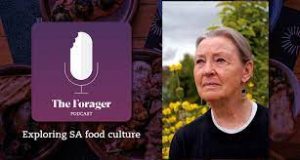
Lolo Houbein: Writer, Gardener and Conservationist
Lolo Houbein is a Dutch-Australian author and conservationist known for her extensive portfolio of novels, histories, poetry, essays, and short stories. Lolo Houbein was born on January 20, 1935, in The Hague, Netherlands. Her father, Pieter Johannes Houbein, was a printer, and her mother, Maria Elizabeth Verburg, was a nurse.
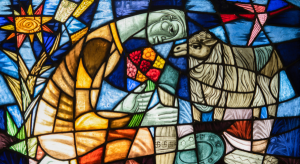
Jean Orval Stained glass artist
Jean Orval was born in Tegelen, Holland in May 1911 and died in Hamilton, Victoria in March 1987. As early as 1926 his emerging talent won him 1st prize in drawing at a Home Industry Expo in Helden-Panningen, Holland. In 1927 a National newspaper honoured him with 1st prize for
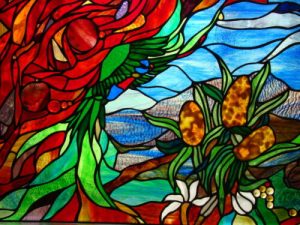
Stained Glass Artist Rein Slagmolen
Marinus “Rein” Slagmolen (7 November 1916 – 29 January 1999) was a Dutch-Australian artist and sculptor with a background in chemical research. Slagmolen was born in the province of Utrecht, Netherlands, as the youngest son of Gijsbertus Slagmolen and Mathilda Maria Slagmolen-Jacobs. As a young man, he spent some years
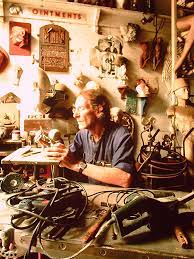
Hans Arkeveld sculptor, painter, draughtsman, and printer
Hans Arkeveld was born on 27 August 1942 in Scheveningen, Holland. He migrated to Australia with his family in 1952 and lived in migrant camps in Victoria and Western Australia before settling in Collie, WA. Arkeveld left school at the age of 13 and worked as a builder’s apprentice and
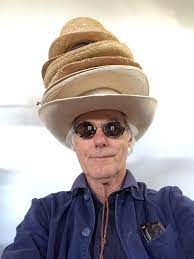
Theo Koning founding member of the Western Australian Sculptors’ Association
Theo Koning was a prominent Australian artist who worked across multiple mediums including painting, sculpture, and printmaking. He was born in the Netherlands in 1950 and immigrated to Western Australia in 1953. Koning studied fine art at the Claremont Technical School and graduated in 1973, the same year he became
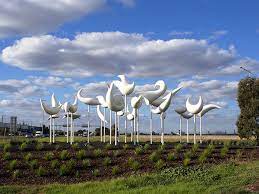
Adrian Mauriks – sculptor
Adrian Mauriks was a Dutch-born Australian artist who was born in 1942 and passed away in 2020. He emigrated to Australia with his family in 1957 when he was still young. His family was involved in the printing business, and Adrian completed his apprenticeship in printing before developing an interest
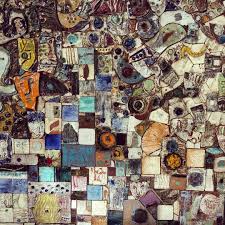
Gerard Havekes active in ceramics, painting, sculpture and tapestry
Gerard Havekes was born in ‘s Hertogenbosch in 1925. He did his military service in the Netherlands at the start of WWII. He immigrated to Australia in 1950. He was active in ceramics, painting, sculpture and tapestry. Despite being a self-taught painter and sculptor, he had successful exhibitions of his
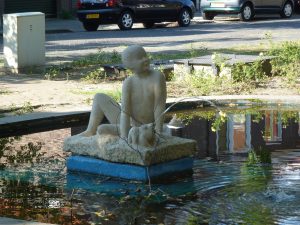
Berend van der Struik – teacher, designer, sculptor.
Berend van der Struik was a Dutch artist, born on 24 July1929 in Beilen. He studied at the Akademie voor Industriële Vormgeving Eindhoven and the Académie de la Grande Chaumière (Parijs). He emigrated to Australia in 1957 and lived there until 1964. He was a teacher, designer, and sculptor, and
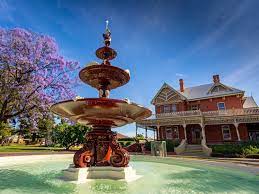
Ernst van Hattum – first director Mildura Art Gallery
(We are interested in further details and corrections on the personal info mentioned in this article). Ernst van Hattum was a Dutch-Australian artist who was born on January 29, 1923, in Nijmegen, the Netherlands. He studied at the Academy of Fine Arts in Arnhem, Netherlands from 1940 to 1942, before

Renown Potter Henri Le Grand
Henricus Alexander Theodorus (Henri) Le Grand, was born on May 10, 1921, in Zevenaar, the Netherlands. His parents were Petrus Egidius Hubertus Le Grand, a laborer of French-Dutch descent, and Elisabetha Antoinetta van Haren. Henri studied art and ceramics at the Instituut voor Kunstnijverheidsonderwijs te Amsterdam from 1938 to 1942.
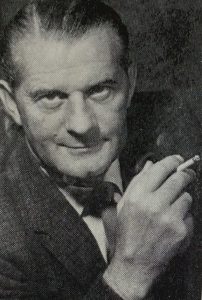
Alex Rotteveel – founder Little Theatre Maryborough
We are looking for more information on Alex Rotteveel. Alexander Johannes Rotteveel was born August 11, 1916 at Assen, Assen, Drenthe, Nederland, he died in Toowoomba Qld December 18 1993. He was married to Bouwina Fekkes, born January 10th, 1919 at Assen, Assen, Drenthe, Nederland. She died in Brisbane in
